2016 NBA playoffs: Picks, best series and more for Eastern matchups

Get all of Rob Mahoney's columns as soon as they’re published. Download the new Sports Illustrated app (iOS or Android) and personalize your experience by following your favorite teams and SI writers.
The East is the conference of pleasant surprises and its first–round field shares that rosy hue. Gone are the downers in Chicago and Washington, ousted before the playoffs even began by unfortunate injuries and jumbled execution. Those young teams that made the cut in their place (Indiana, Detroit) join the East’s middle class on the incline. Up in the thick of the bracket lie four teams (Miami, Atlanta, Boston, Charlotte) that finished with identical 48-34 records—a mark that assures quality and reliability. Any among them could make noise, though none is positioned quite as well to do so as the No. 2-seeded Raptors. Toronto took to its modest roster changes and sailed to its most successful season in decades.
It’s only the conference–topping Cavaliers who seem to defy the trend. There’s still so much to suggest that Cleveland should be better than it’s been: more fluid, more agreeable, more secure. The playoffs are an invitation to change. We watched last year’s Cavs evolve in every series and with every injury under David Blatt. The current Cavs might not need quite so much on–the–fly reshaping (good health permitting), though they’re in similar need of definition. LeBron James has done incredible work on the floor to move his team forward and curious work off of it to push his teammates’ buttons. All of it came in an effort to settle the conference’s most promising contender—a venture still very much in progress. If there’s a switch to be flipped, Cleveland had best find it.
• MORE NBA: Western Conf. preview | Rankings: Most fun first-round series?
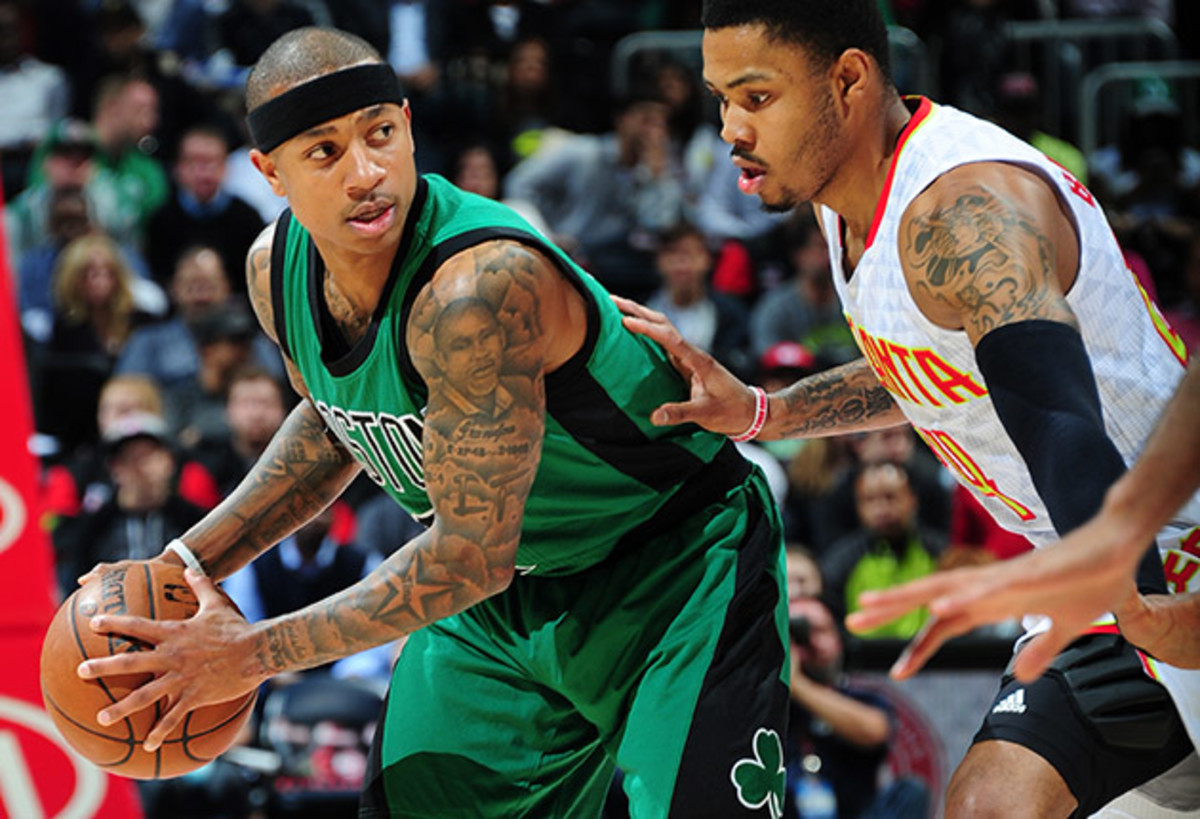
Most intriguing series: (4) Hawks—(5) Celtics
Two of the best, most aggressive defenses in the league will do everything in their power to keep the other on the ropes. That both teams generally aim to pass their way out of trouble (Atlanta and Boston both ranked in the top eight in passes per game, per NBA.com) only heightens the intrigue. Every possession will present a maze of pressuring defenders. Solving that maze will require smart, consistent ball movement and a fully kinetic offense. Anything less will play right into the opponent’s hands, and anything overly bold or desperate will produce turnover after turnover. Tune in to watch well–matched squads toe a series of fine lines.
• MORE NBA: Grades for all 30 teams | SI's season awards | Playoff schedule
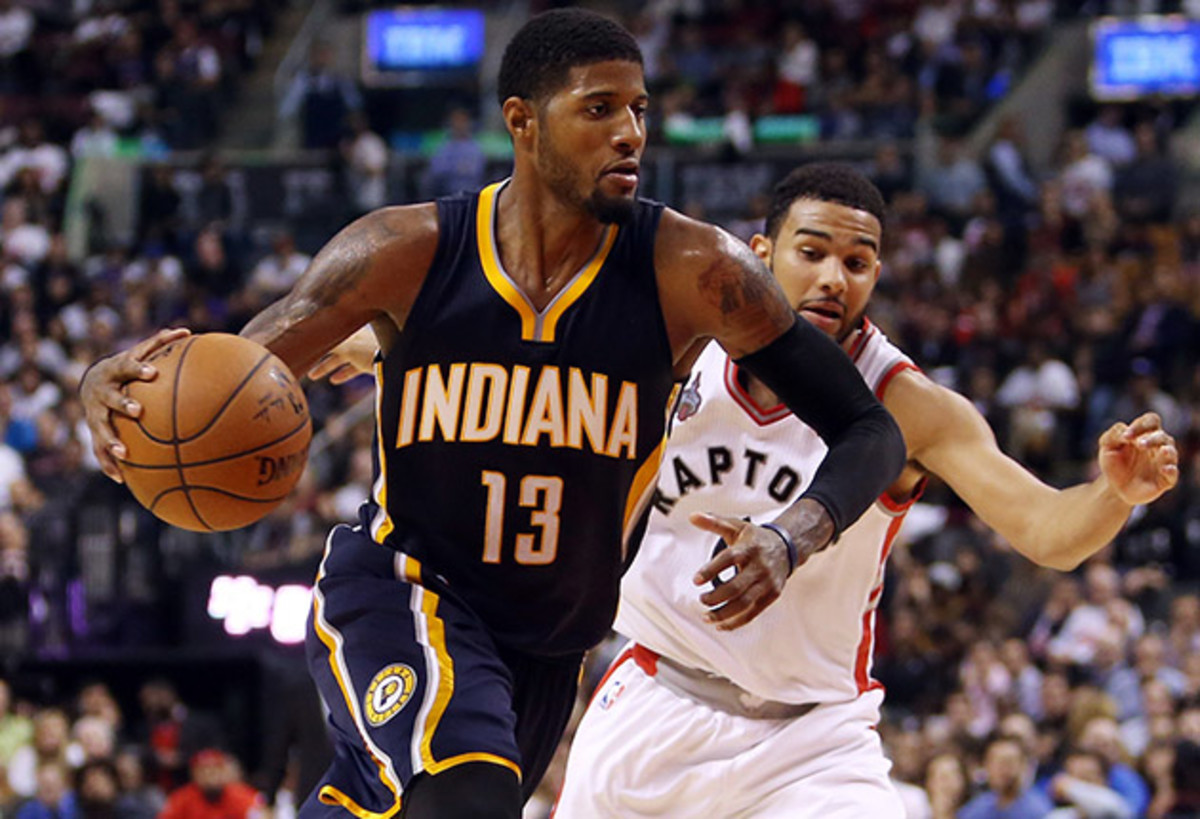
Thanks, but no thanks: (2) Raptors—(7) Pacers
This series doesn’t totally deserve such a dismissive categorization, though it takes the title by default. Indiana just isn’t trustworthy enough to forecast this series as a must–watch affair. Those games in which the Pacers come to play could be fascinating. Those in which they don’t look to be easy wins for the Raptors. Nothing in this matchup suggests that Toronto and Indiana might bring out the best in one another—only that they’ll take their turns winning as their counterpart takes the opposite oscillation. Bank on the Raps both riding high for longer stretches and bouncing back more quickly when things aren’t quite working out as planned. Consistency is as important for a series’ entertainment value as it is a team’s playoff viability.
What to watch: Series by series
No. 1 Cavaliers vs. No. 8 Pistons: Cleveland's potential discomfort
Detroit enters its first–round series outmatched in most respects, save one: Stan Van Gundy is the kind of coach who can manufacture a tactical advantage out of thin air. His team’s approach is worth watching closely. To what extent will the Pistons overload on James? How much will we see Kentavious Caldwell–Pope cross-matched against Kyrie Irving and how effective might it be? How will Detroit opt to attack a Cavs defense that lacks for discipline? The only way for an eighth seed to compete in a series like this is to throw its superior opponent off balance. Van Gundy is surely capable, and his choice in strategic devices could test Cleveland early.
• MORE NBA: Top 10 game-winners of the 2015–16 NBA season
No. 2 Raptors vs. No. 7 Pacers: Toronto’s best chance to push through
Consecutive first–round flame–outs have saddled these Raptors with a burden of proof. An offense reliant on drawing fouls must recalibrate to postseason standards. Some of the team’s more exploitable players (Bismack Biyombo, Luis Scola, etc.) must prove reliable under playoff scrutiny. Kyle Lowry and DeMar DeRozan need to find ways to propel Toronto through its lean stretches, even as defenses load up against them. There’s an opportunity not only for the Raptors to advance in the playoffs for the first time in 15 years, but also to use this initial series as the grounds to make a statement.
GALLERY: SI's 100 best NBA Finals photos
100 Best NBA Finals Photos
2016
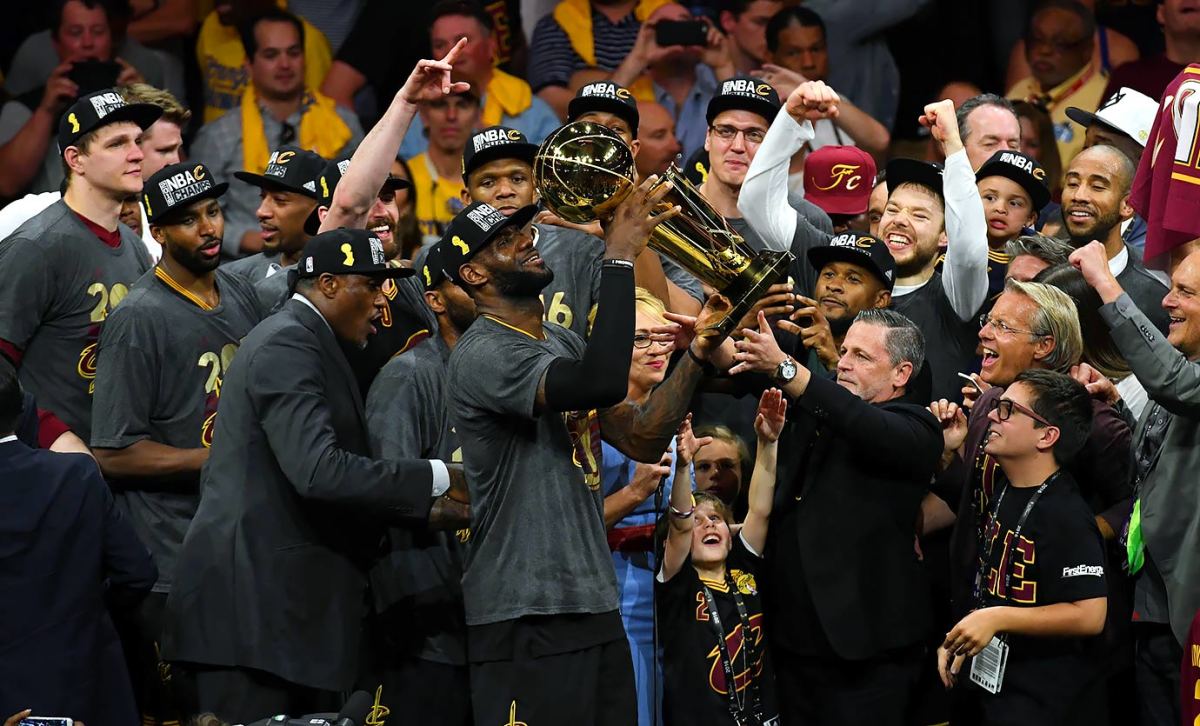
LeBron James holds up the shiny gold trophy in what might be his sweetest championship yet, the one he is so proudly bringing home to his native northeast Ohio just as he promised to do when he returned to the Cavaliers two summers earlier.
2015
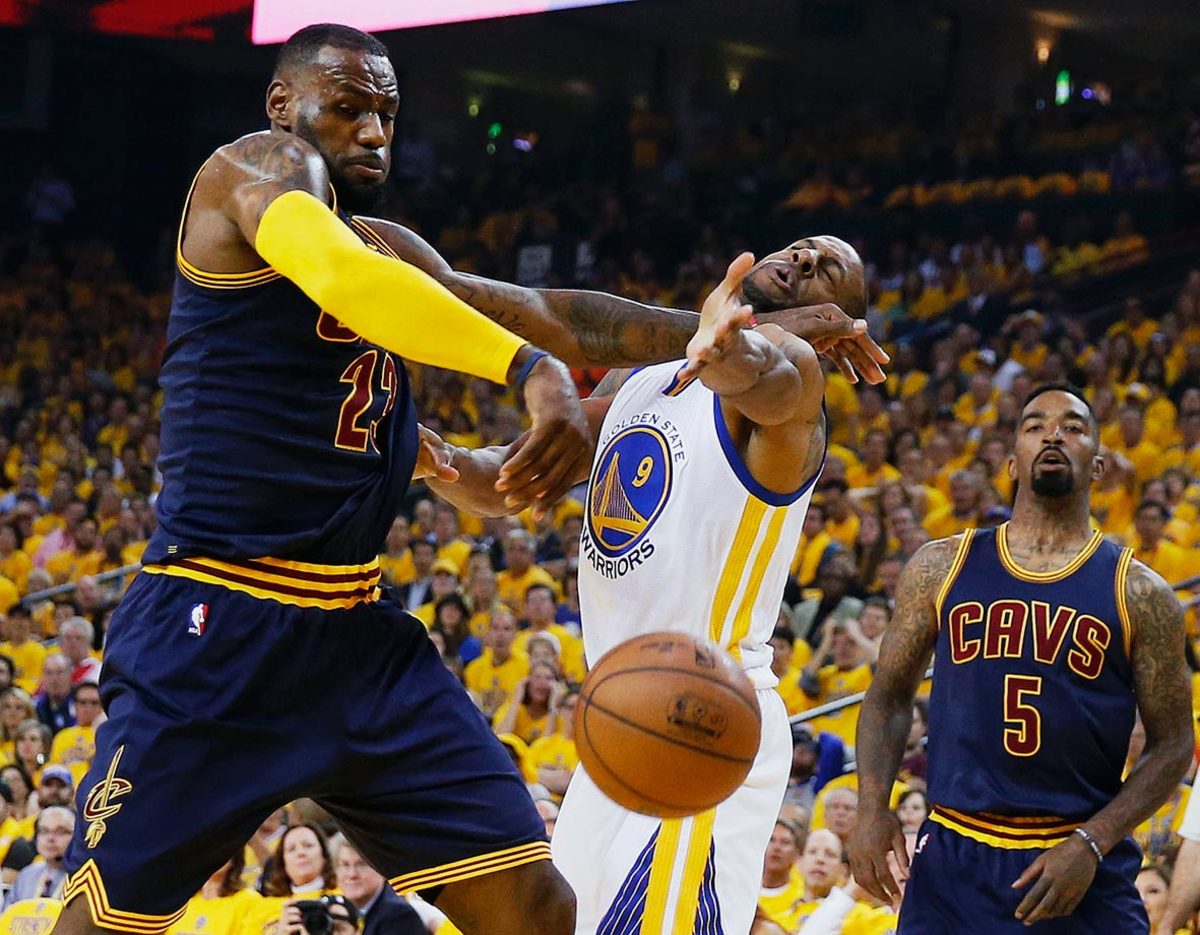
LeBron James loses the ball as he tries to fend off Andre Iguodala in Game 1 between the Warriors and Cavaliers. Golden State won the game and the series 4-2. Iguodala became the first player to win the Finals MVP award without having started every game in the series. He was tasked with guarding LeBron, who made only 38.1 percent of his shots when Iguodala was in the game.
2015
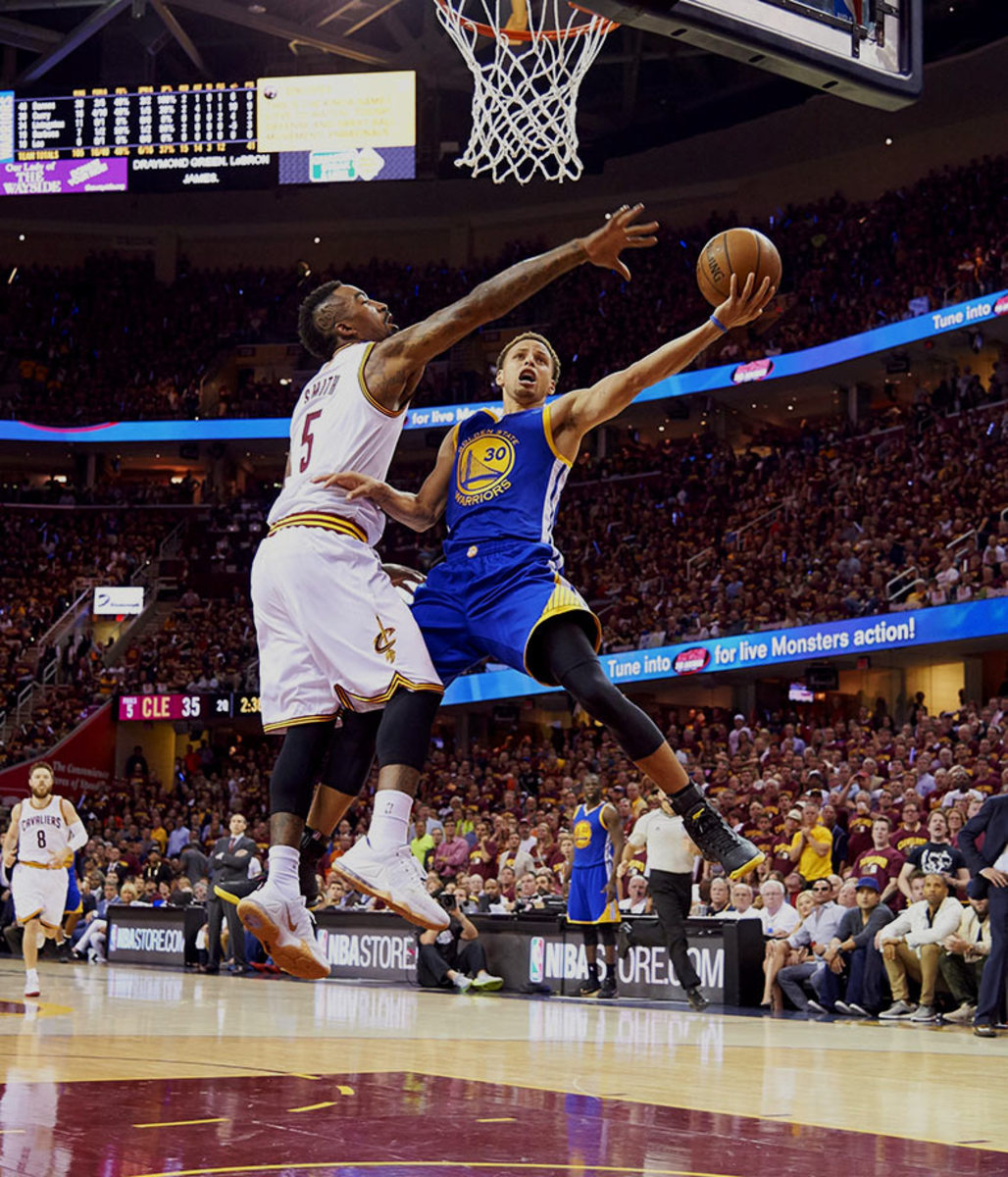
Steph Curry goes to the left hand against J.R. Smith to score two of his 25 points in Game 6. The Warriors defeated the Cavs 105-97 to clinch the franchise's first NBA title since 1975.
2014
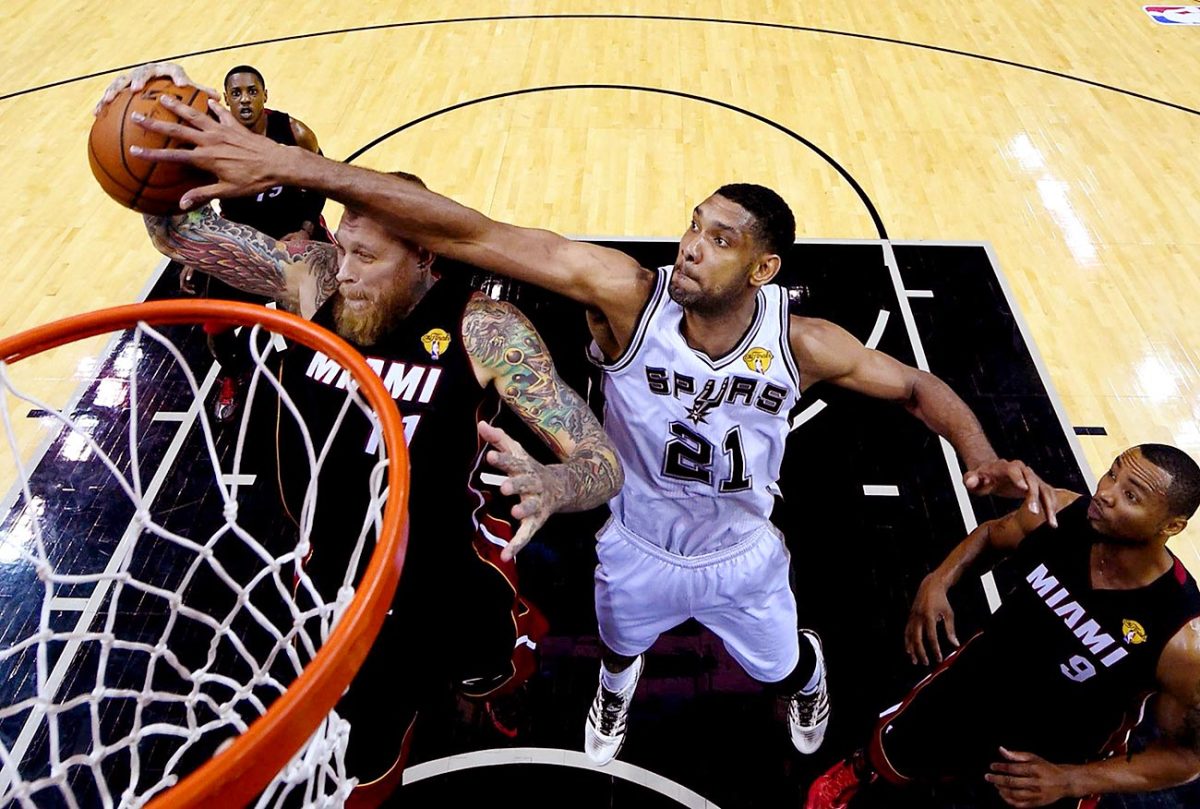
A year after an excruciating loss to the Miami Heat in the NBA Finals, Tim Duncan and the Spurs got their revenge, winning the title in five games.
2013
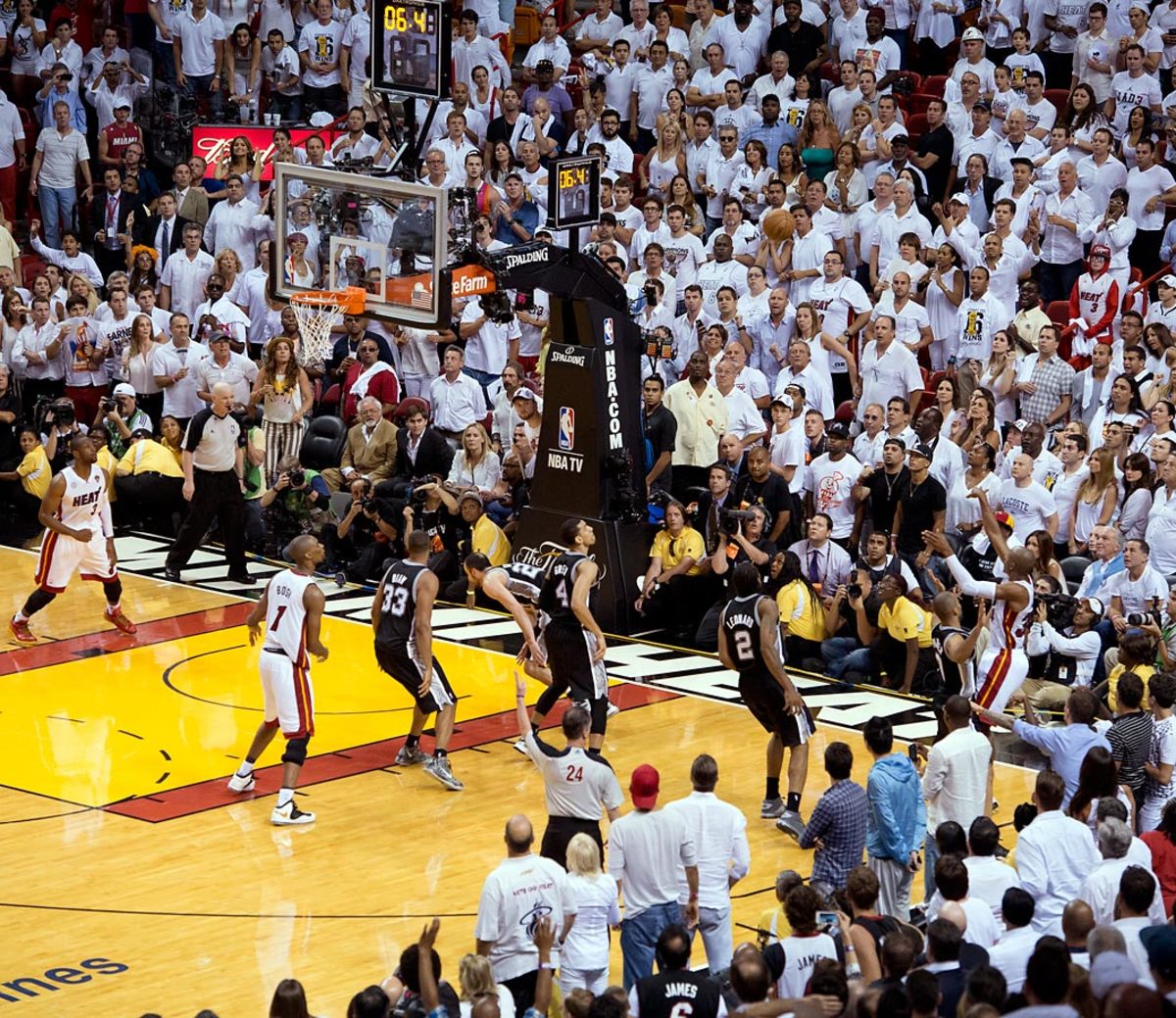
Ray Allen lets loose a series-changing three over Tony Parker in Game 6. With Miami down 3-2 in the series, it was the veteran Allen who sent the game to overtime and an eventual Heat victory. With a huge momentum boost, Miami went on to win the series.
2013
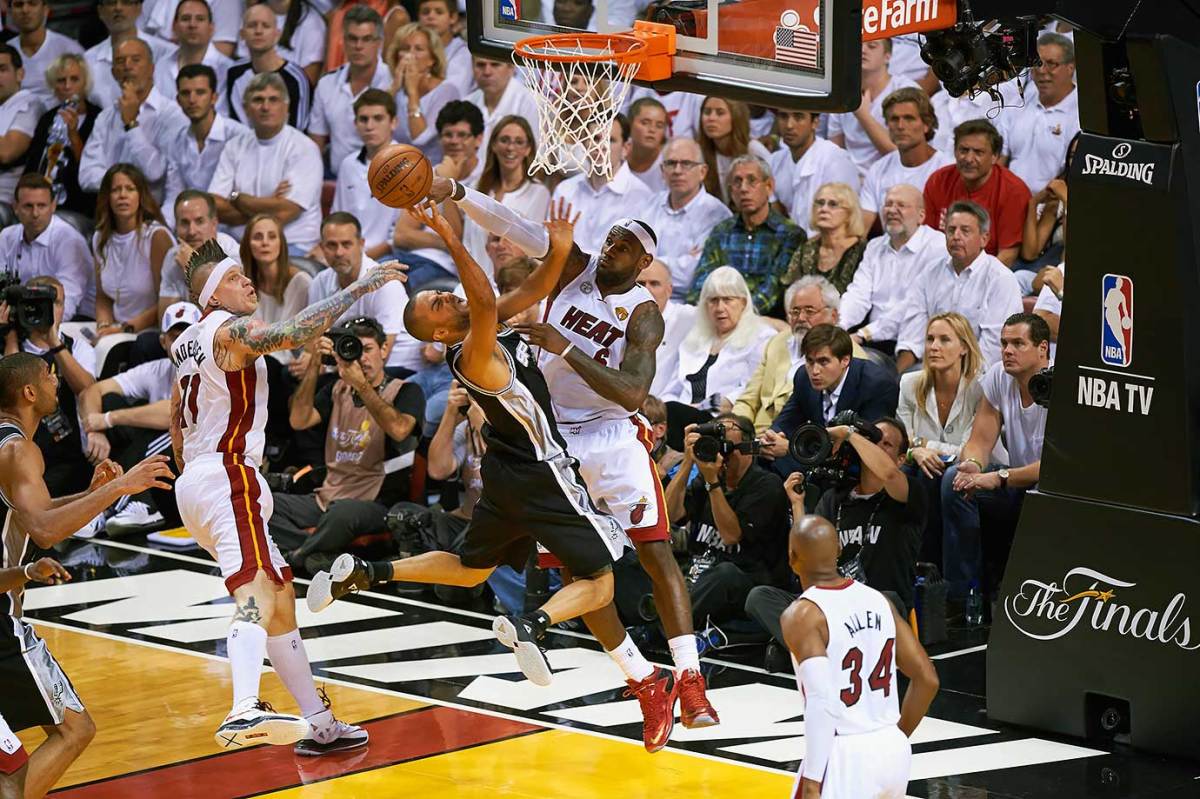
LeBron James led Miami to the finals for a third straight year and to a second consecutive title, duking it out with the Spurs for seven games. James won his second Finals MVP award with another series of stellar showings.
2012
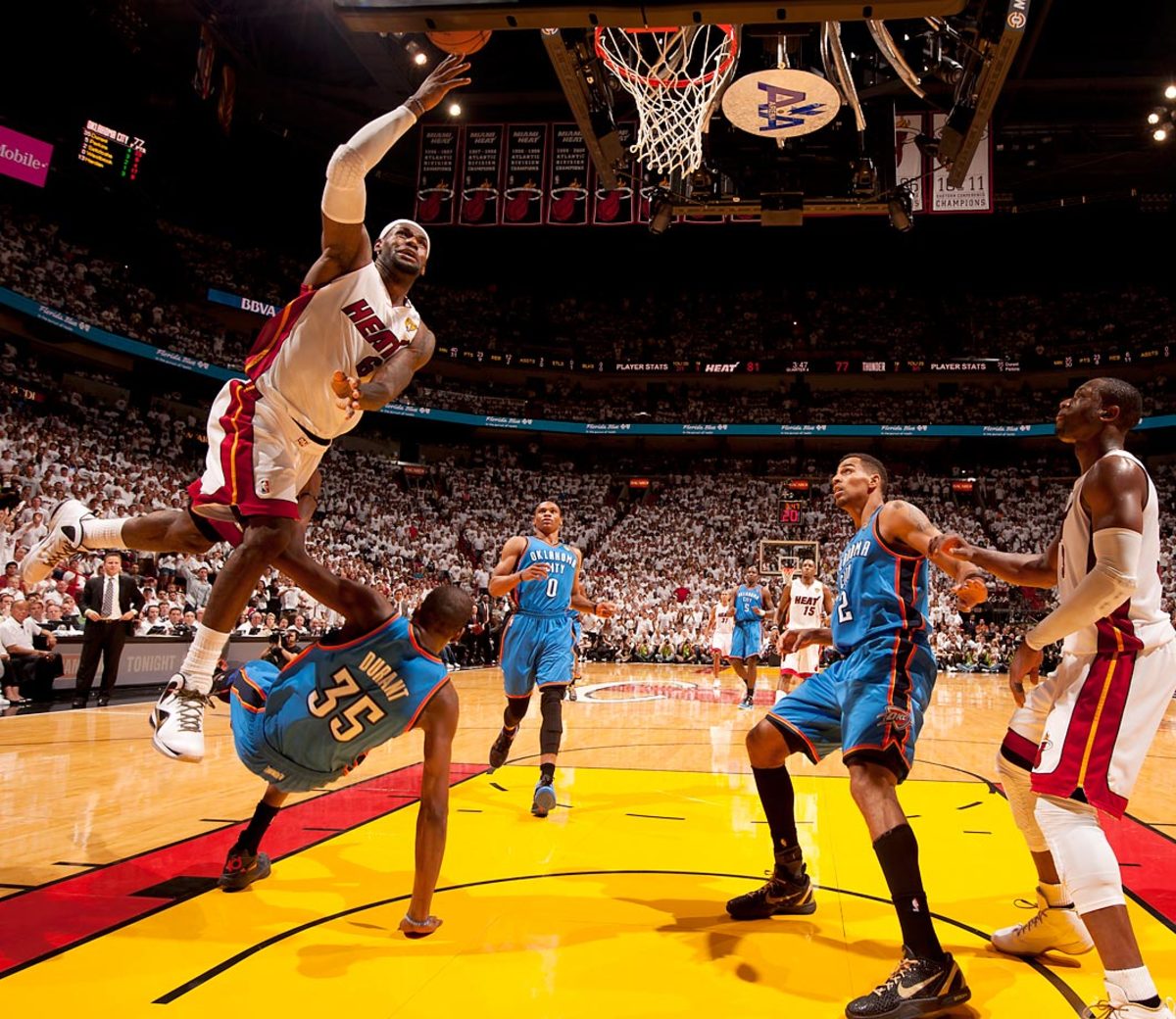
LeBron James soars over Kevin Durant in Game 3. James got the championship monkey off his back in a big way, averaging 28.6 points, 10.2 rebounds and 7.4 assists in the series.
2012
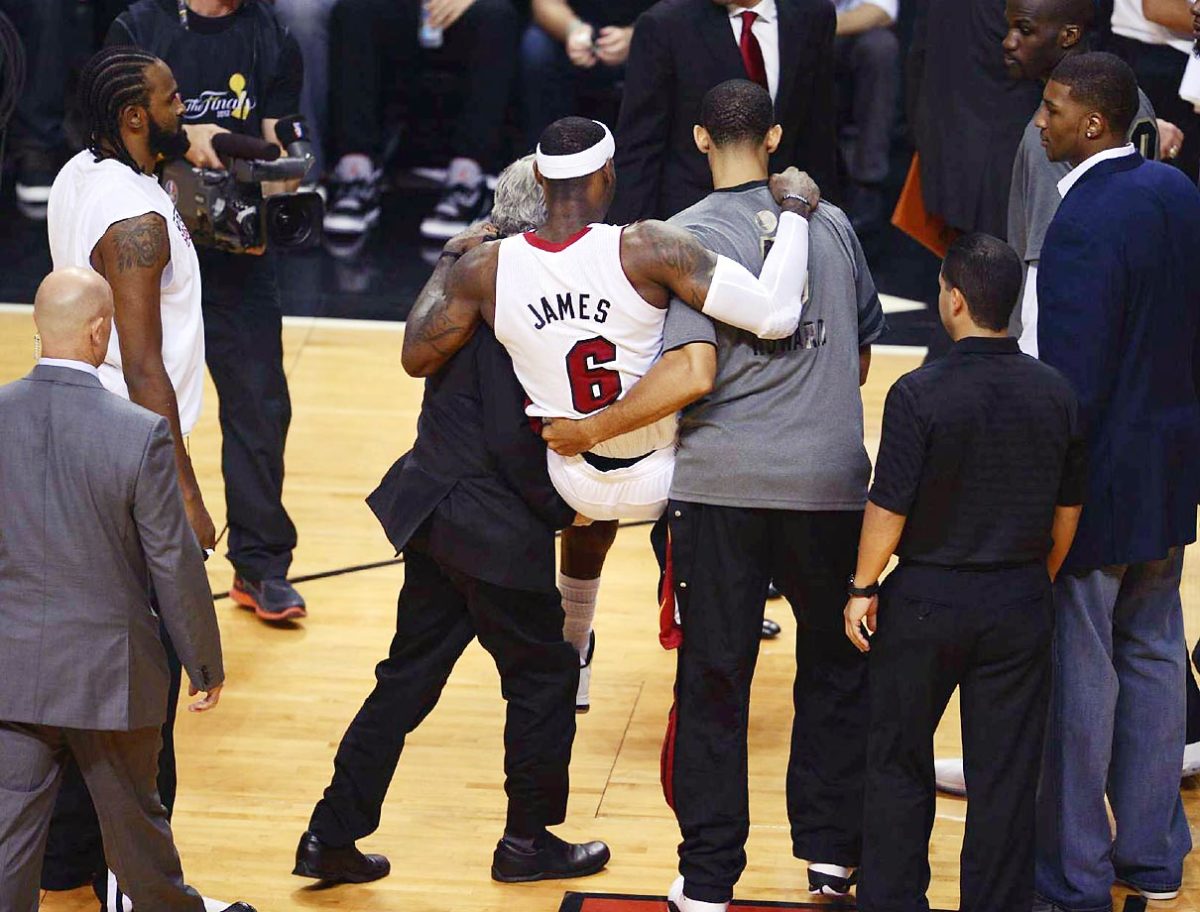
LeBron James battled cramps in Game 4 and was unable to finish out a 104-98 Heat victory. He still had 26 points, nine rebounds and 12 assists.
2011
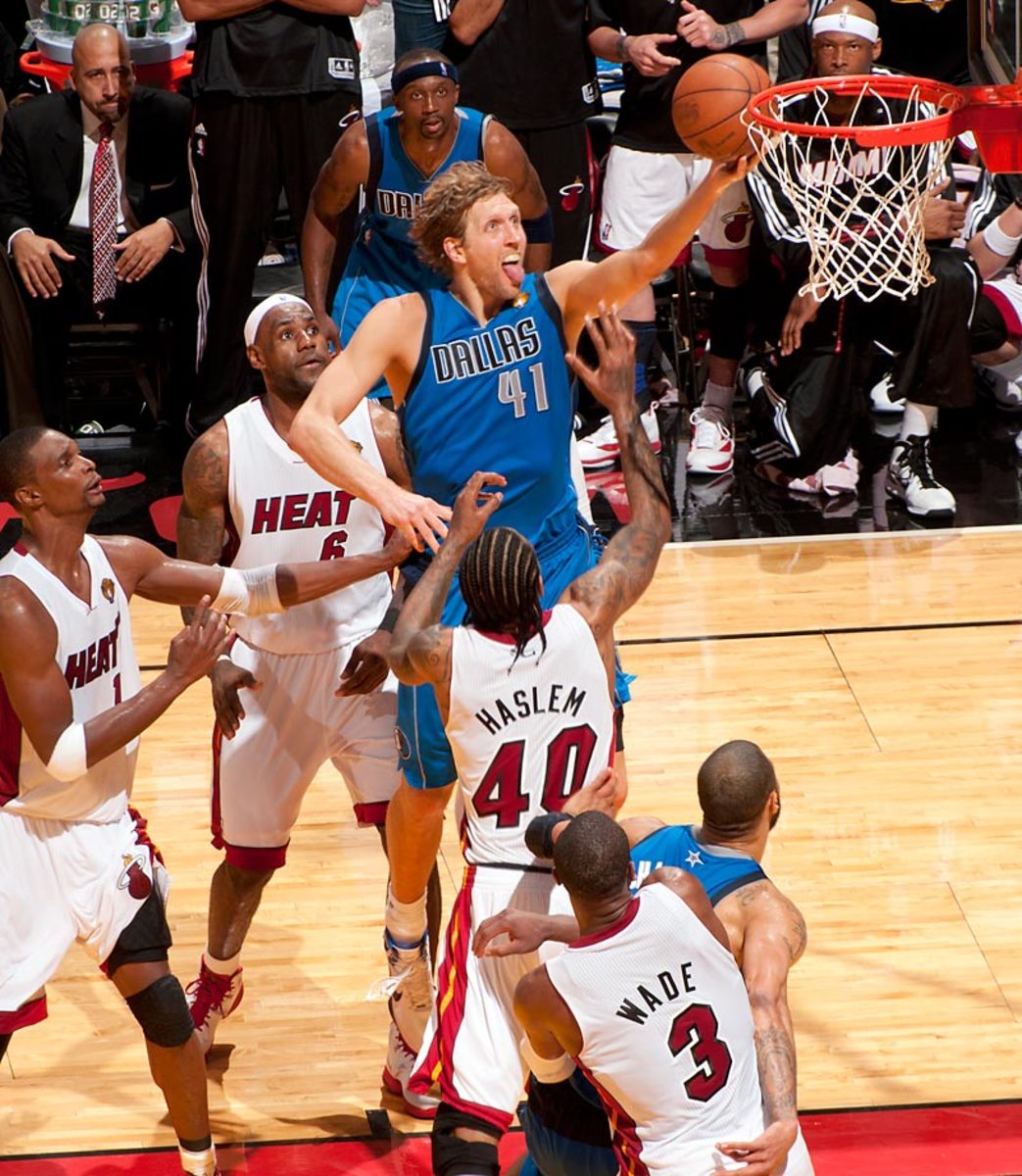
Dirk Nowitzki avoids traffic to drop in the game-winner for Dallas in Game 2. Nowitzki's clutch shot capped a furious 15-point fourth-quarter Mavs comeback. Dallas would knock off favored Miami and the "Big Three" of LeBron James, Dwyane Wade and Chris Bosh in six games in a rematch of the 2006 Finals.
2010
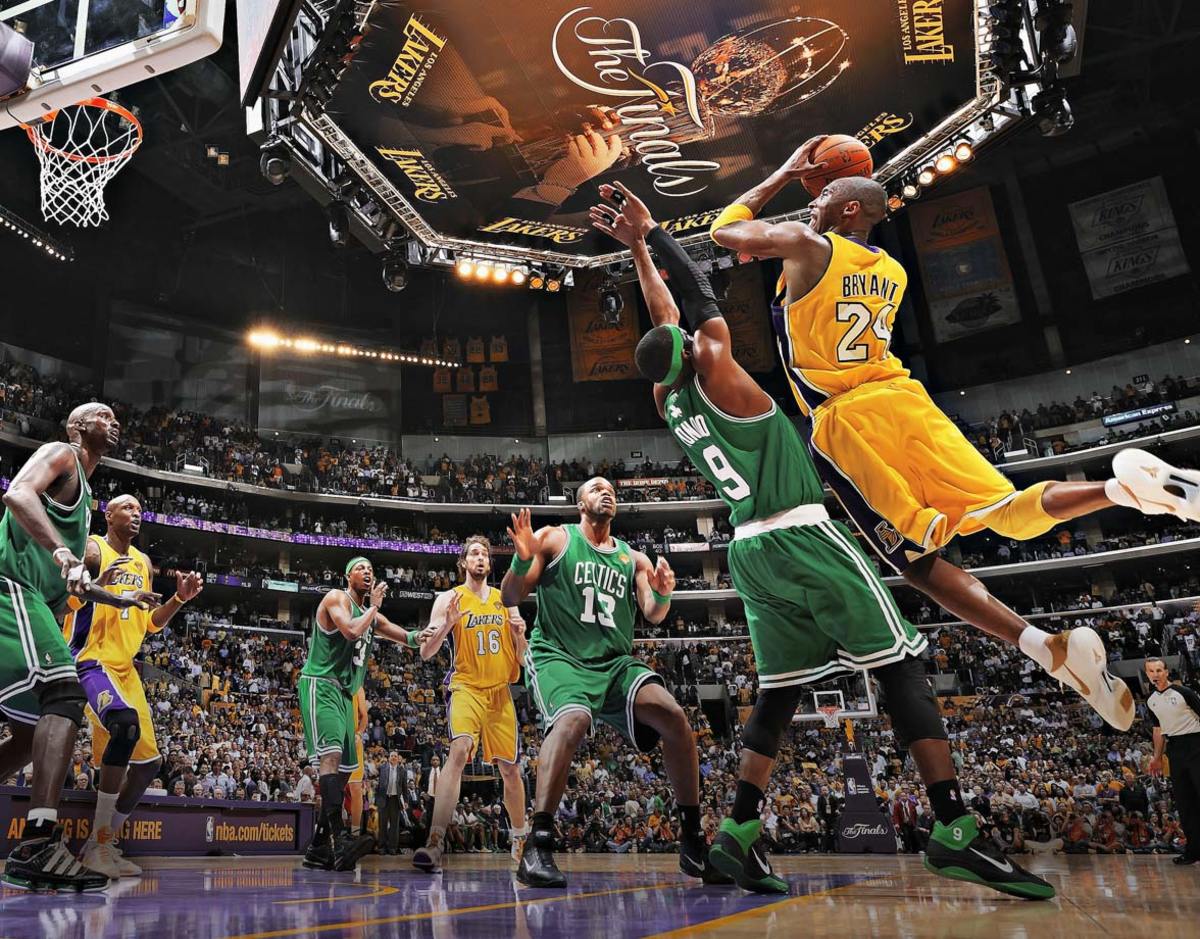
Kobe Bryant looks to shoot over Rajon Rondo in Game 6 between the Lakers and Celtics. Kobe averaged 29 points per game in the series, en route to his second consecutive Finals MVP award.
2010
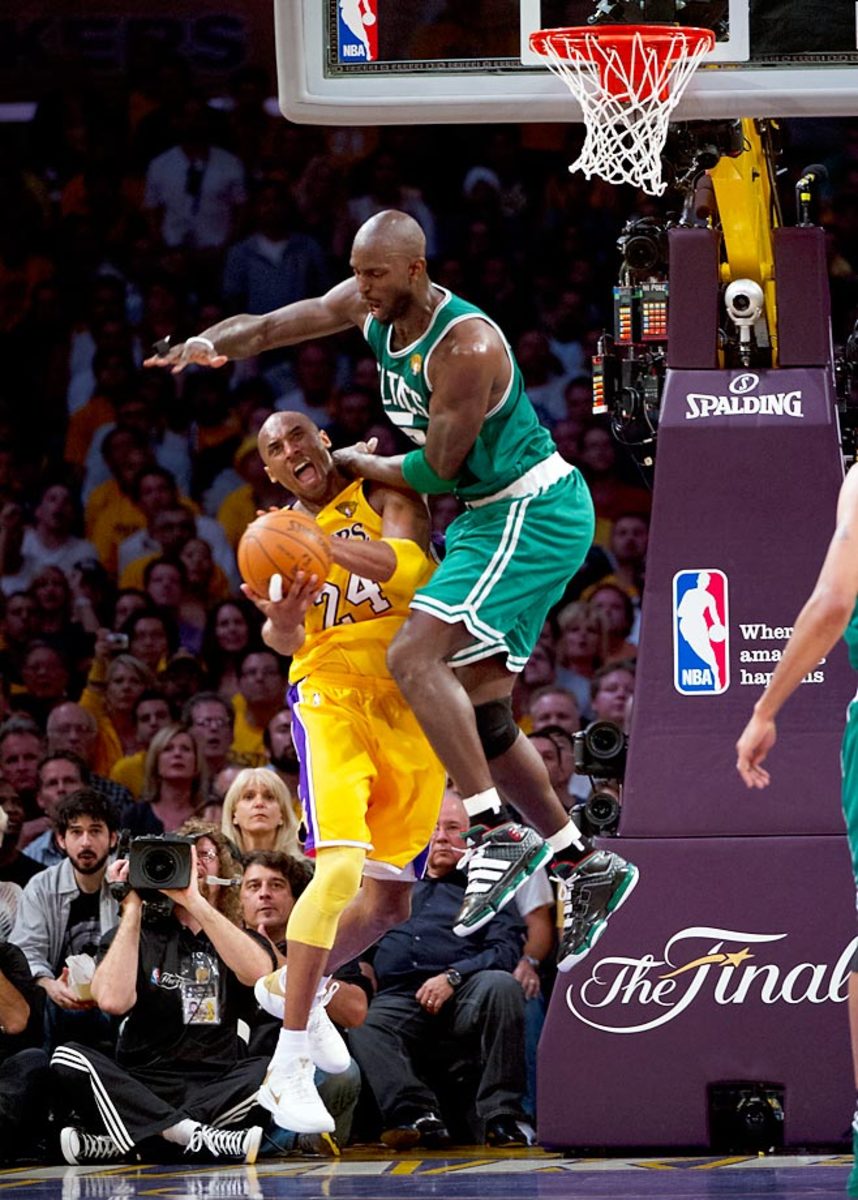
Kevin Garnett bodies a driving Kobe Bryant in a tight Game 7. The Celtics-Lakers rivalry was renewed in a back-and-forth series that saw Los Angeles come out on top for a second straight title.
2010
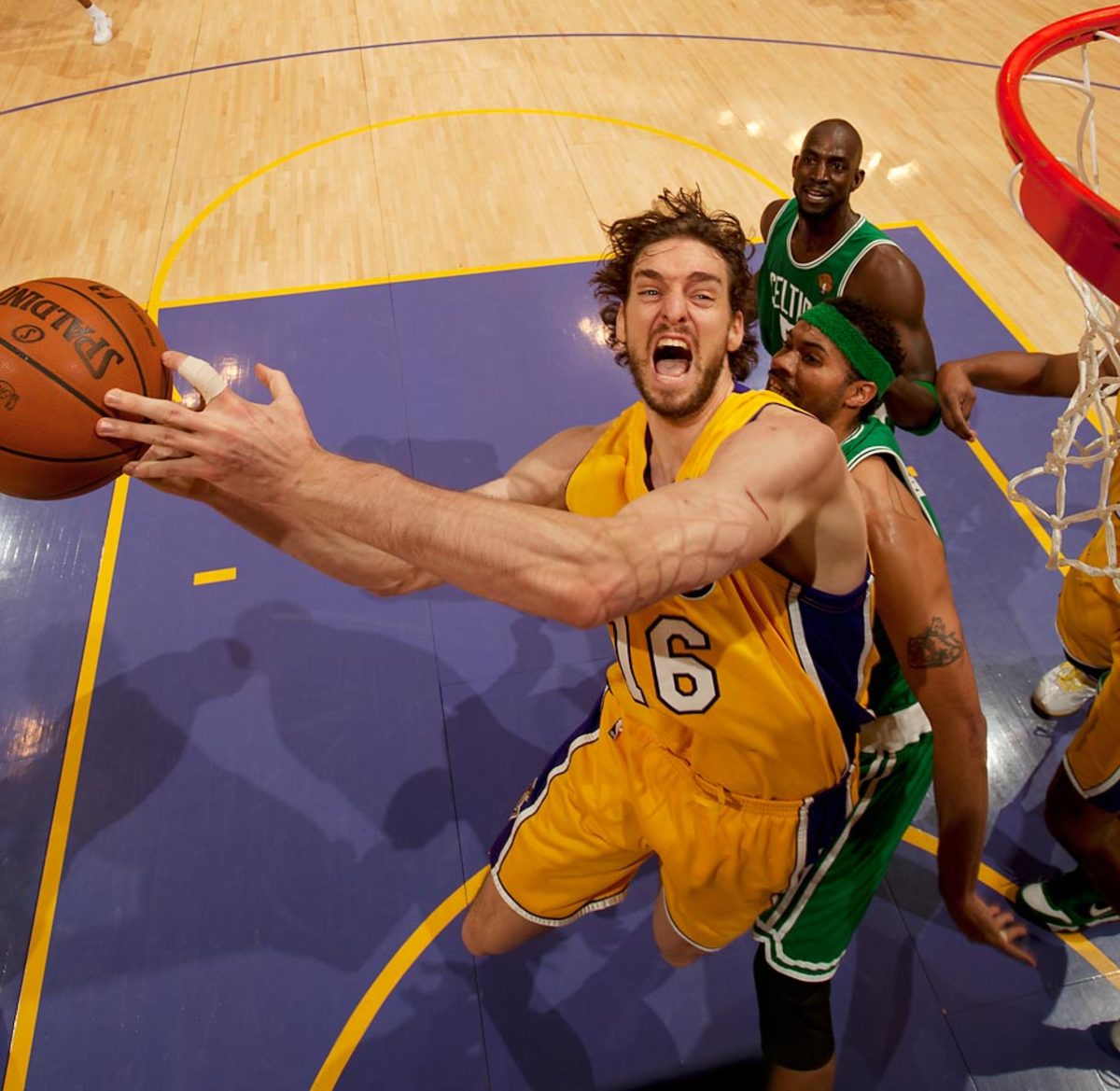
Pau Gasol owned the paint in Game 7 with 19 points and 18 rebounds to push the Lakers to an 83-79 win.
2009
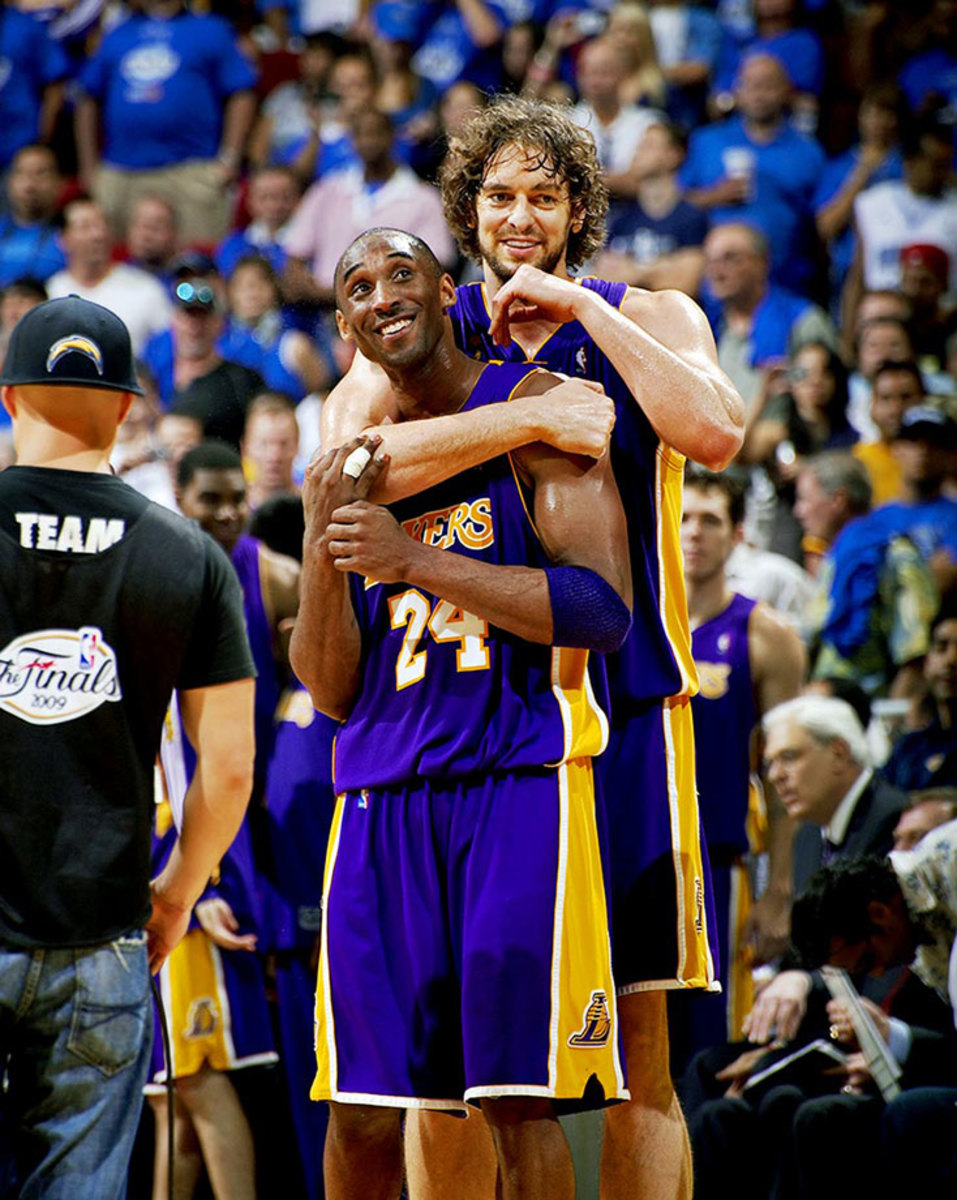
Pau Gasol hugs Kobe Bryant near the end of a series-clinching Game 5. The duo was crucial to L.A.'s five-game victory over Orlando, with Bryant named Finals MVP and winning his first title out of Shaquille O'Neal's shadow.
2008
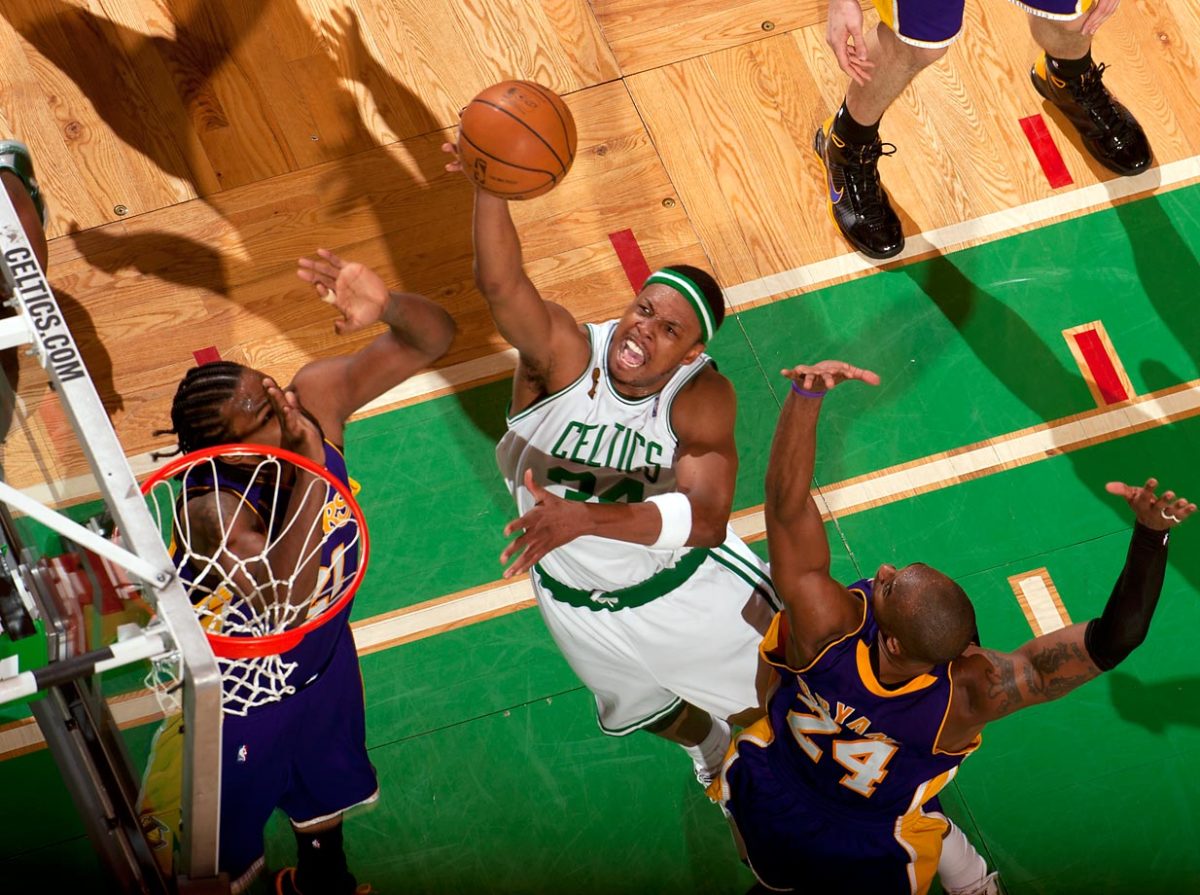
Averaging nearly 22 points per game, Finals MVP Paul Pierce paired with offseason acquisitions Kevin Garnett and Ray Allen to return the Celtics to their championship ways against the rival Lakers. The win marked the first title for each of the three stars.
2007
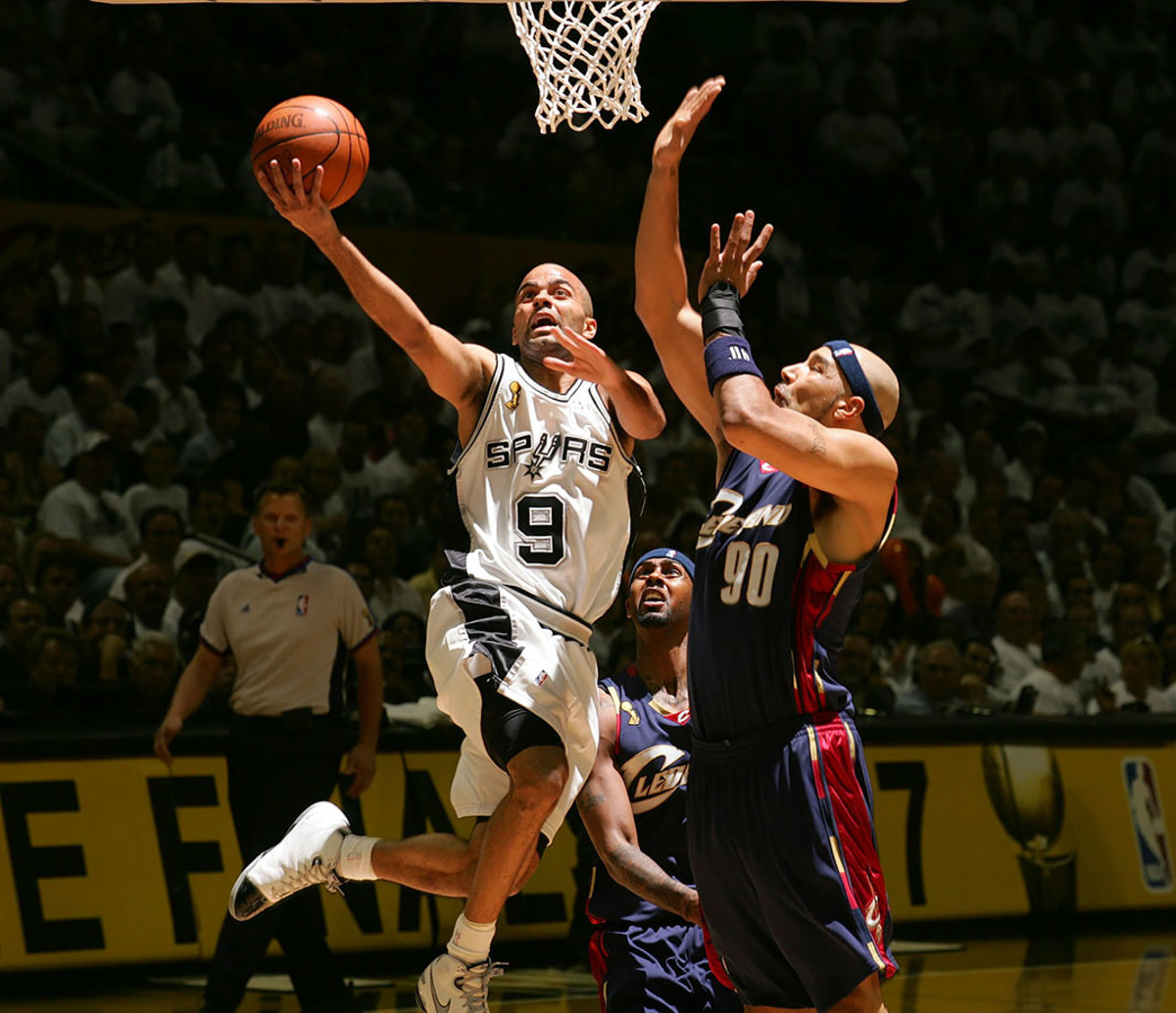
San Antonio's Tony Parker was named Most Valuable Player of the series, averaging 24.5 points per game in the sweep.
2007
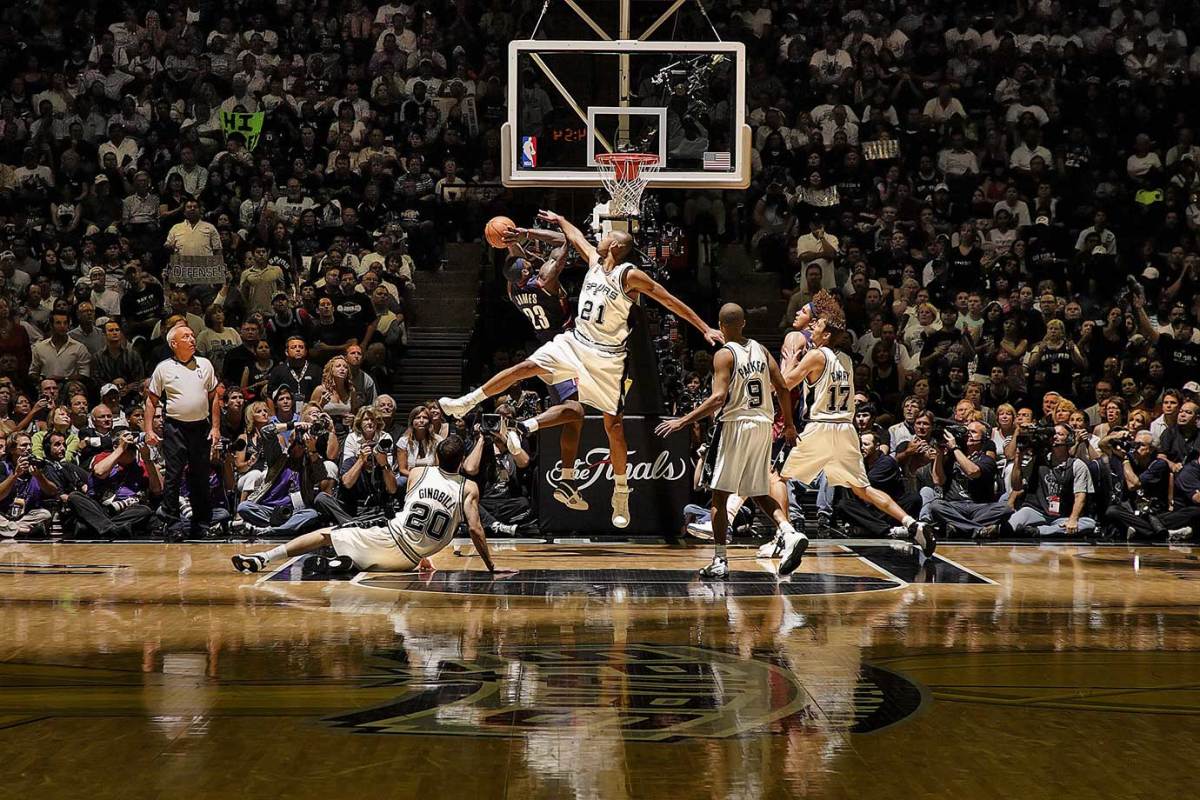
Tim Duncan and the Spurs spoiled LeBron James' first Finals, limiting him to 35.6% shooting and efficiently sweeping the series.
2006
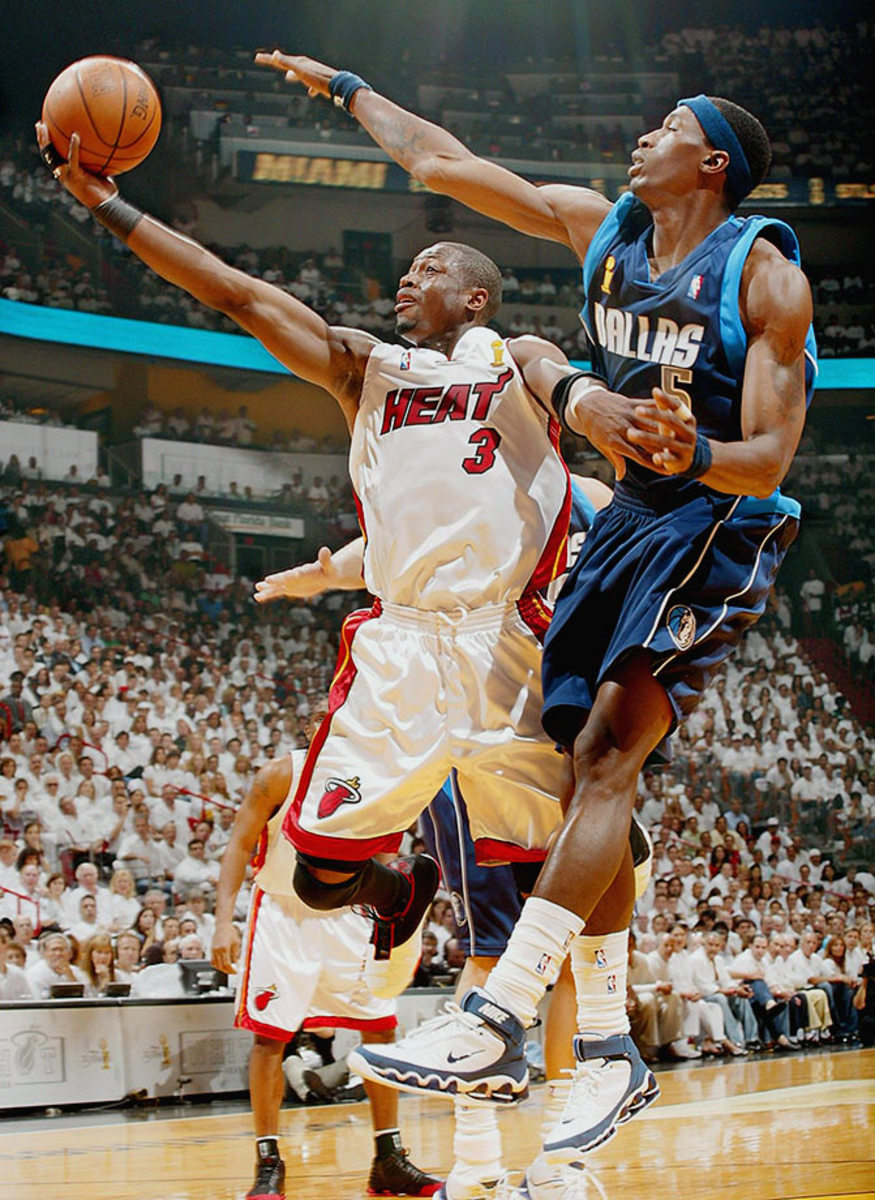
Dwyane Wade, at just 24 years old, catalyzed the Heat past Dallas in six, memorably scoring 42 points and leading a comeback from a 13-point deficit with six minutes left in Game 3. The series marked Wade's arrival as a superstar, as he averaged nearly 35 points and eight rebounds per game to lead Miami to its first title.
2005
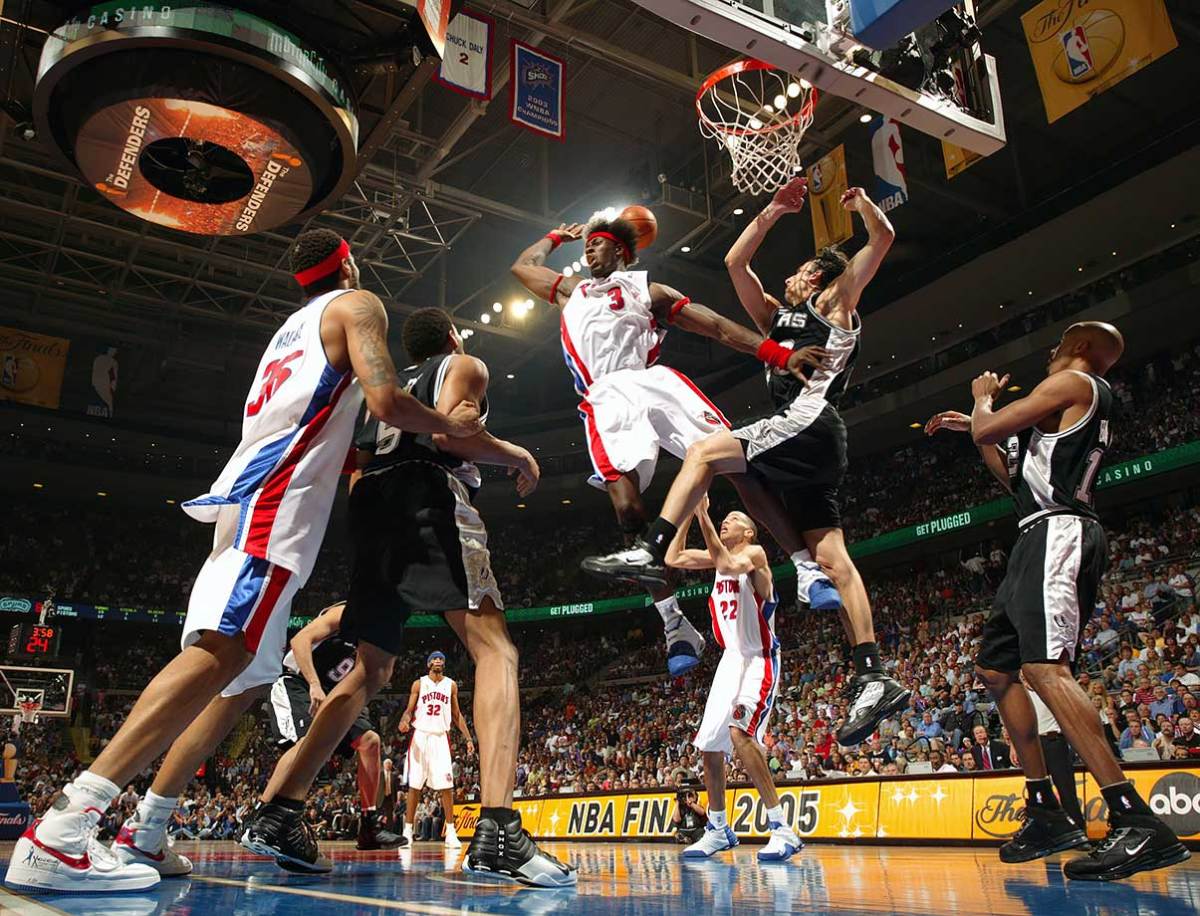
Ben Wallace and Manu Ginobili battle for a loose ball in Game 5 between the Pistons and Spurs. The past two NBA champs traded blows in a tough series that went seven games, with San Antonio coming out on top.
2005
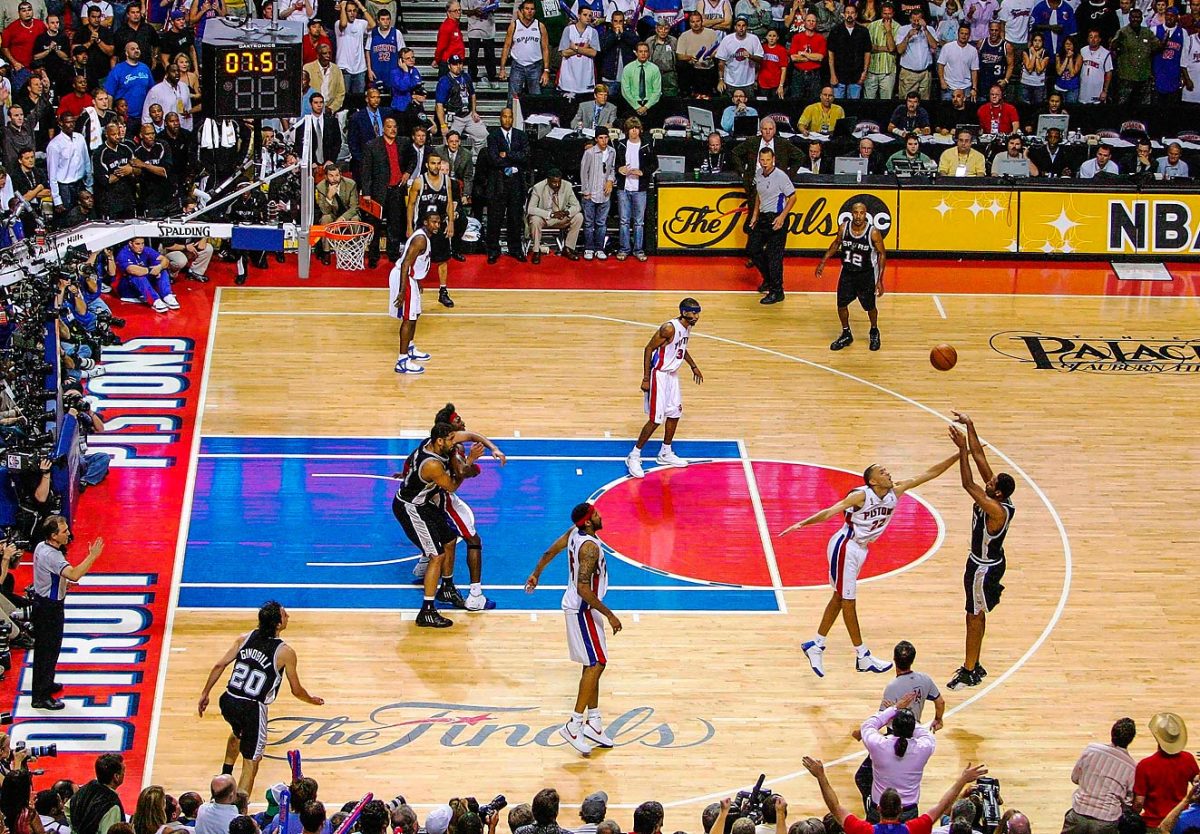
Robert Horry, better known as "Big Shot Rob," buries the three to win Game 5 for San Antonio.
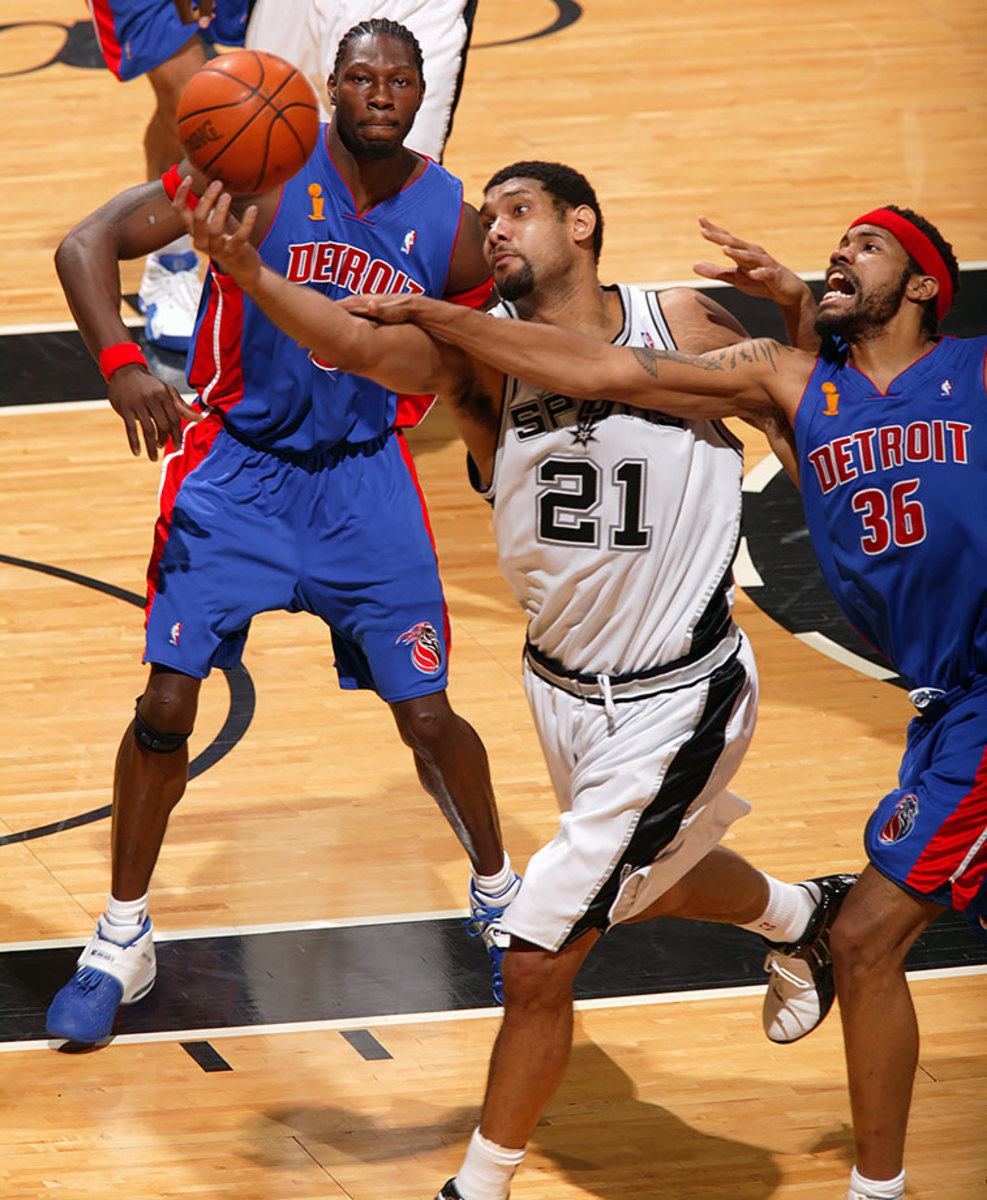
Tim Duncan drives to basket against Rasheed Wallace in Game 7 between the Spurs and Pistons. Duncan scored a game-high 25 points and 11 rebounds as he led San Antonio to their third title and won his third Finals MVP award.
2004
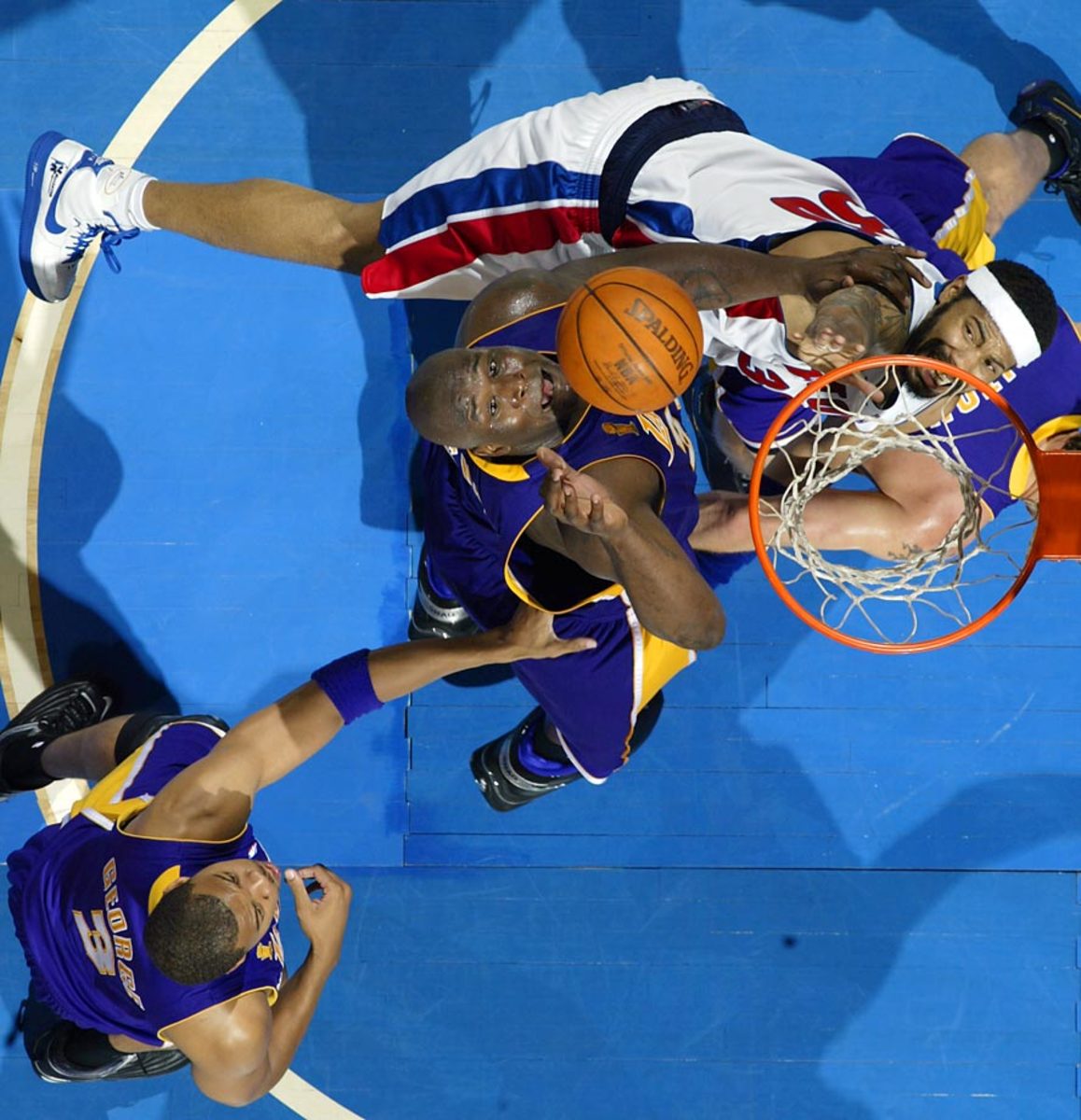
Shaquille O'Neal of the Lakers and Rasheed Wallace of the Pistons grapple for a rebound. Detroit impressively dispatched L.A.'s O'Neal-Kobe Bryant tandem in five games.
2004
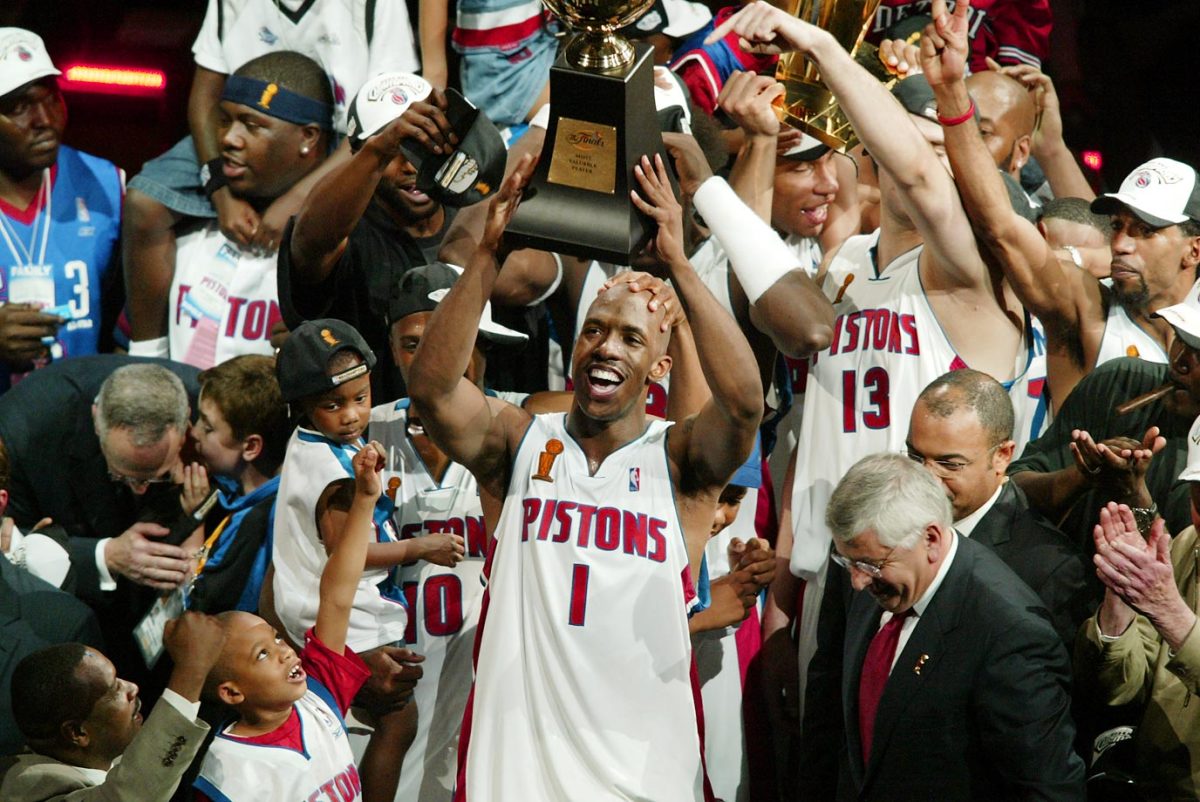
Chauncey Billups hoists the trophy as the Pistons celebrate their championship. With a penchant for making shots in critical moments, Billups was named Finals MVP.
2003
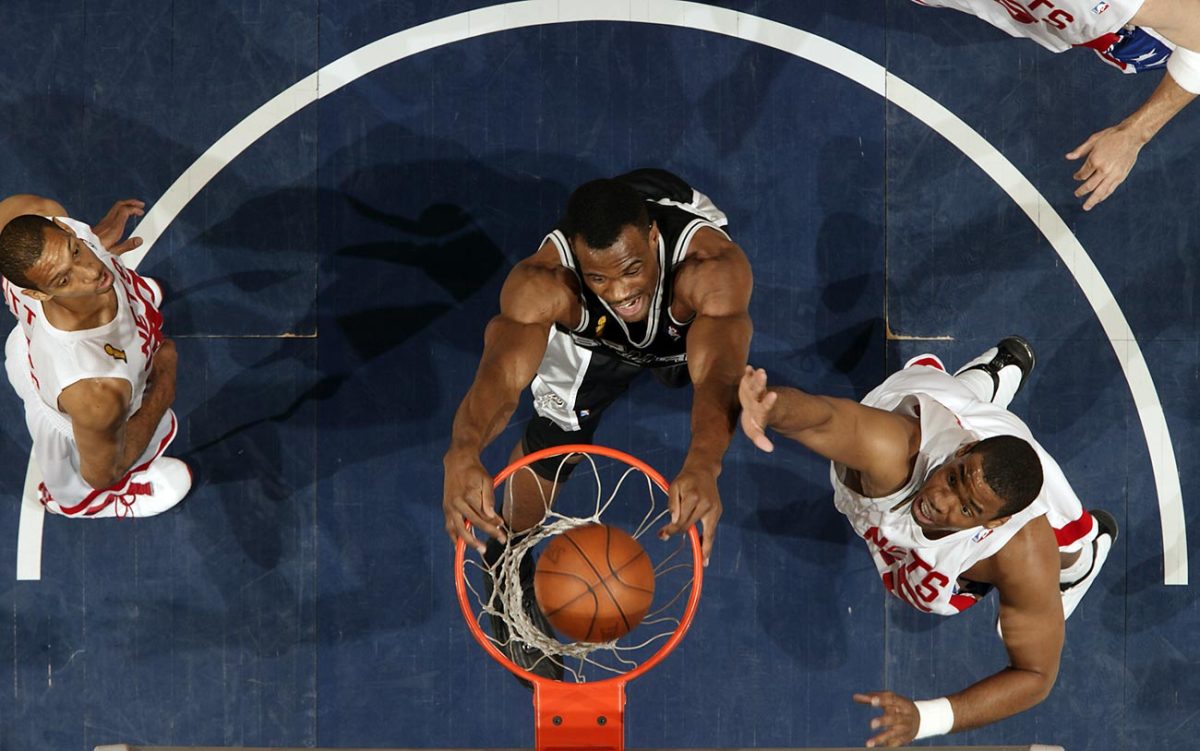
David Robinson of the Spurs dunks on Jason Collins of the Nets in Game 5. San Antonio took the series in six games, with Robinson teaming up with the core of Tim Duncan, Tony Parker and Manu Ginobili winning their first title together.
2003
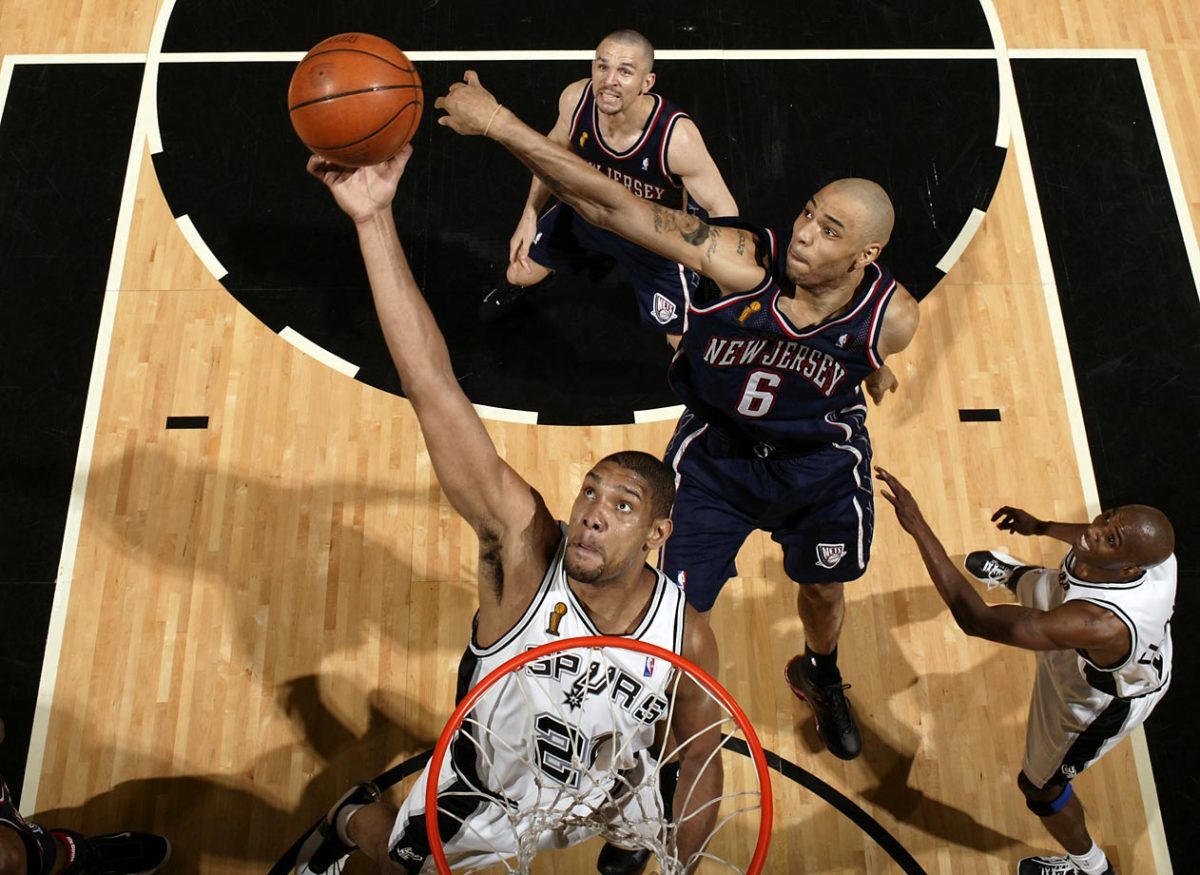
Finals MVP Tim Duncan came up huge for San Antonio in the Game 6 series-clincher with 21 points, 20 boards, 10 assists and eight blocks.
2002
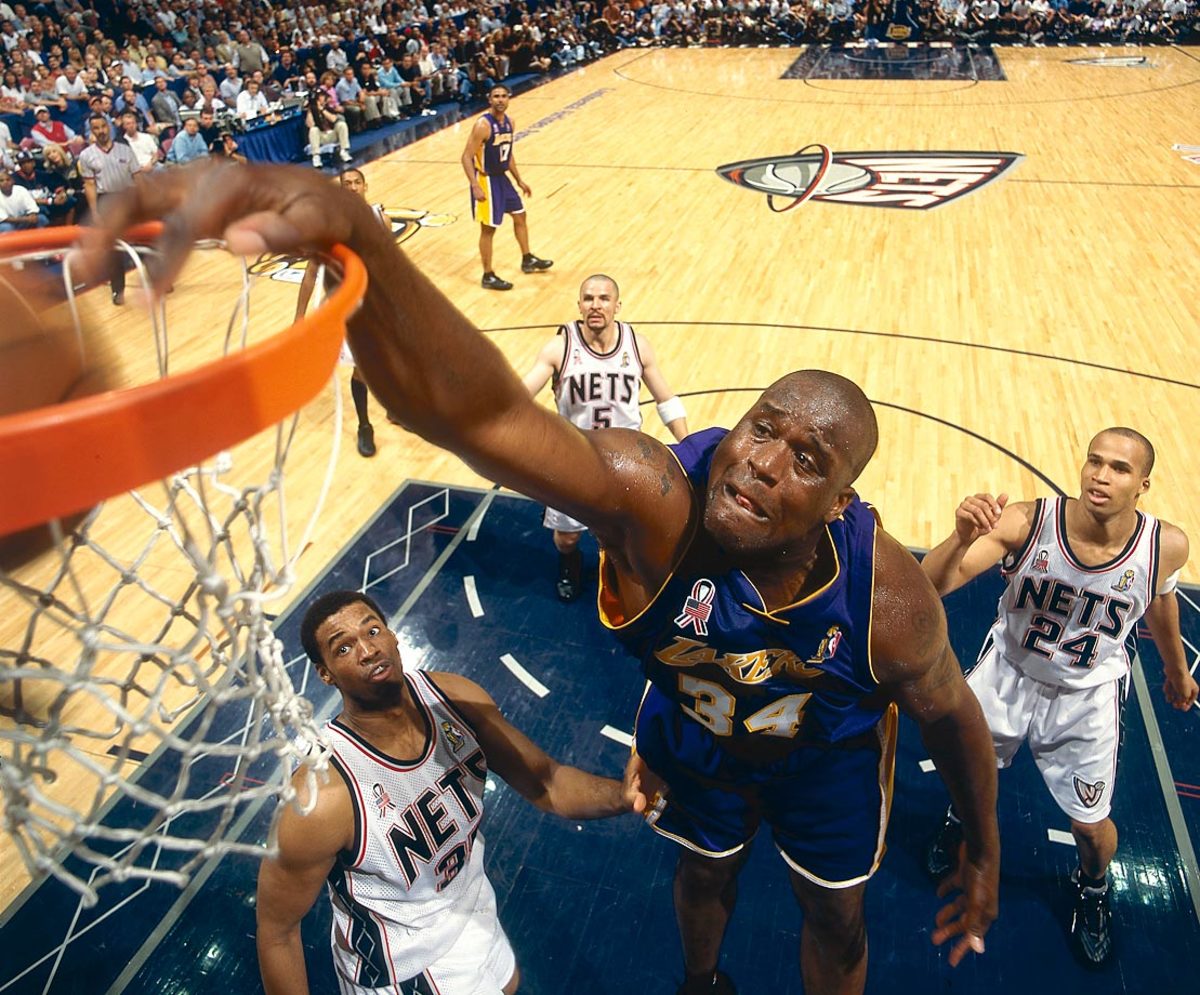
Shaquille O'Neal and the Lakers blew away the Jason Kidd-led Nets in a four-game sweep. O'Neal averaged more than 36 points per game as L.A. took home a third straight title.
2001
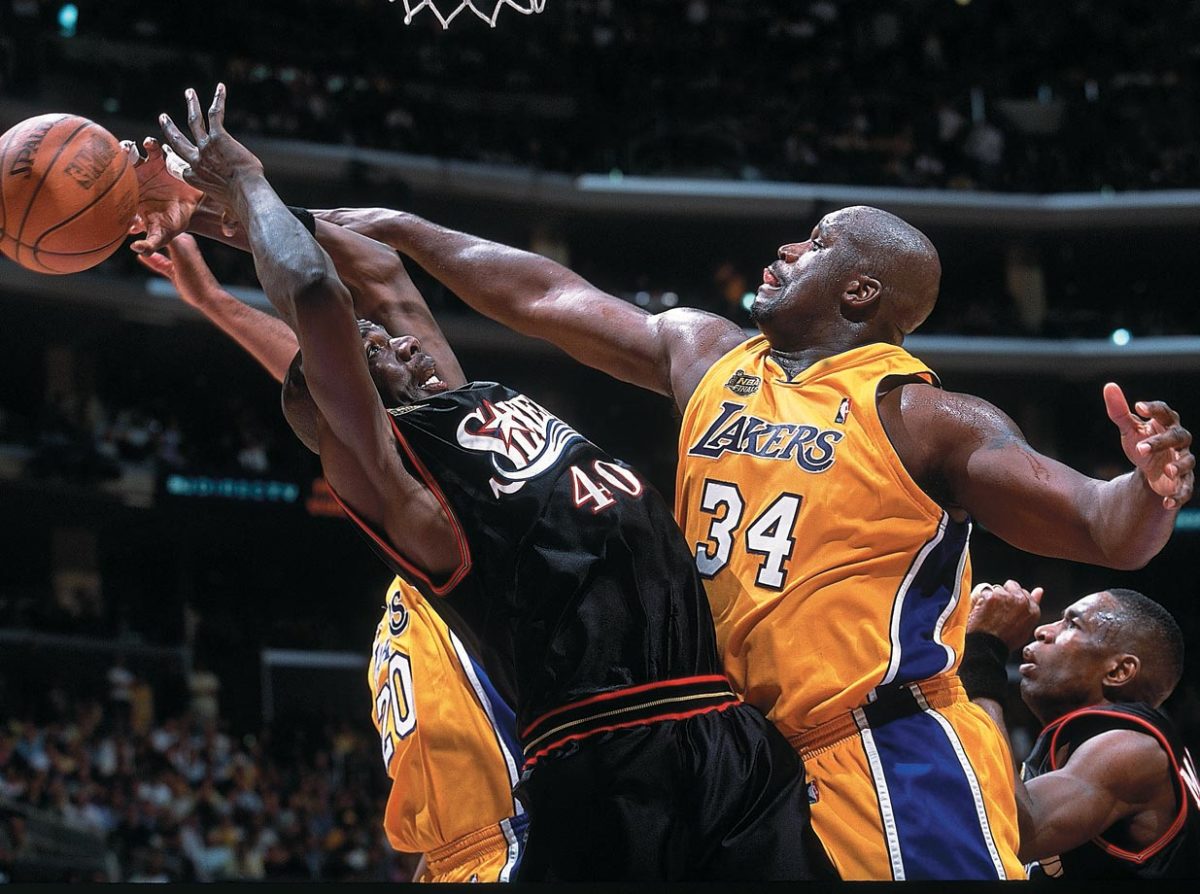
Shaquille O'Neal was simply too much for Philadelphia to handle in the series, winning his second straight Finals MVP honors and contributing a near quadruple-double in Game 2 with 28 points, 20 rebounds, nine assists and eight blocks.
2001
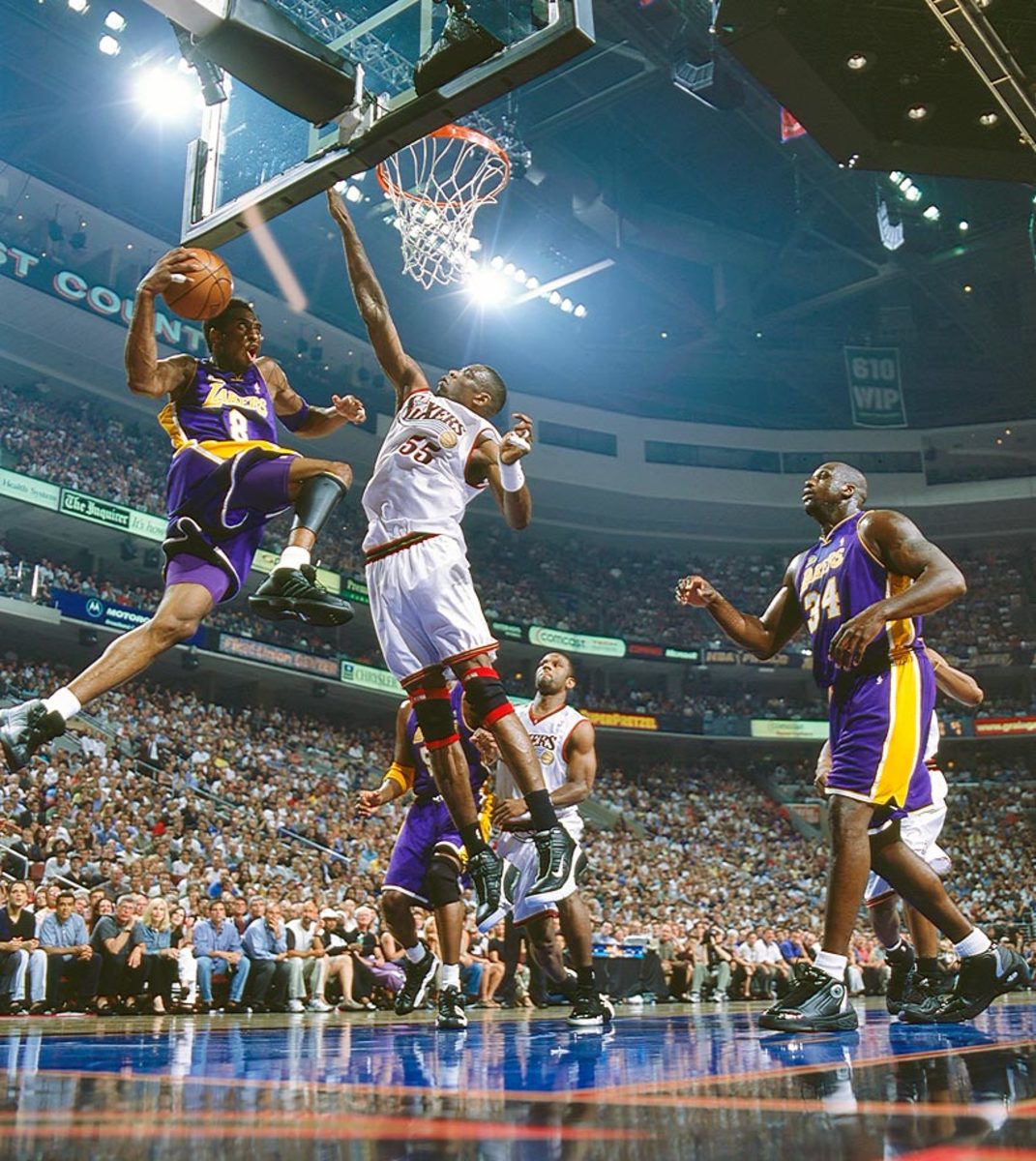
Kobe Bryant of the Lakers avoids 76ers center Dikembe Mutombo in Game 4. Though still overshadowed by Shaquille O'Neal, the 22-year-old Bryant continued to shine in his own right, averaging nearly 25 points for the series.
2001
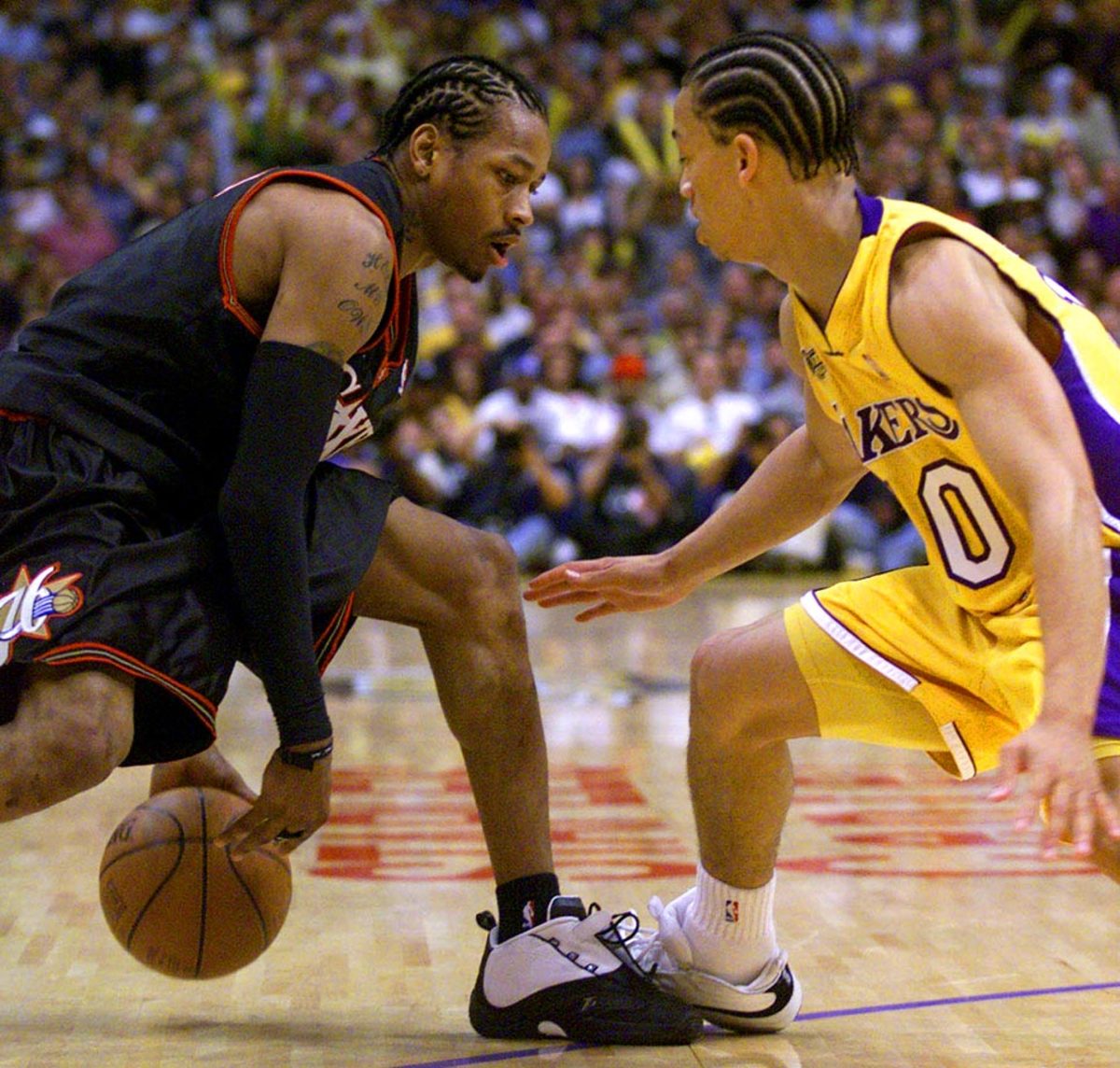
Sixers guard Allen Iverson dribbles the ball against Tyronn Lue of the Lakers during Game 1. Bolstered by the dynamic Iverson's 48 points, Philadelphia pulled off an upset, 107-101.
2000
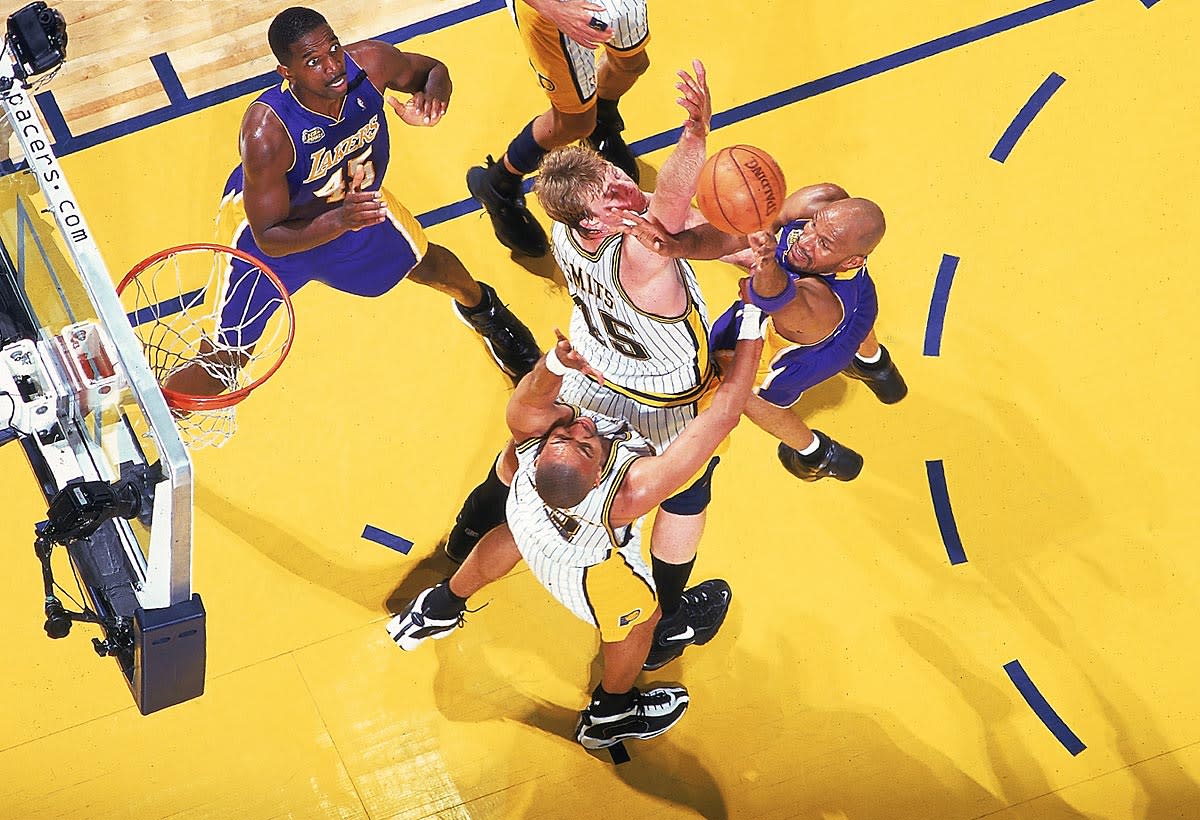
Ron Harper of the Lakers shoots over Pacers center Rik Smits in Game 4.
2000
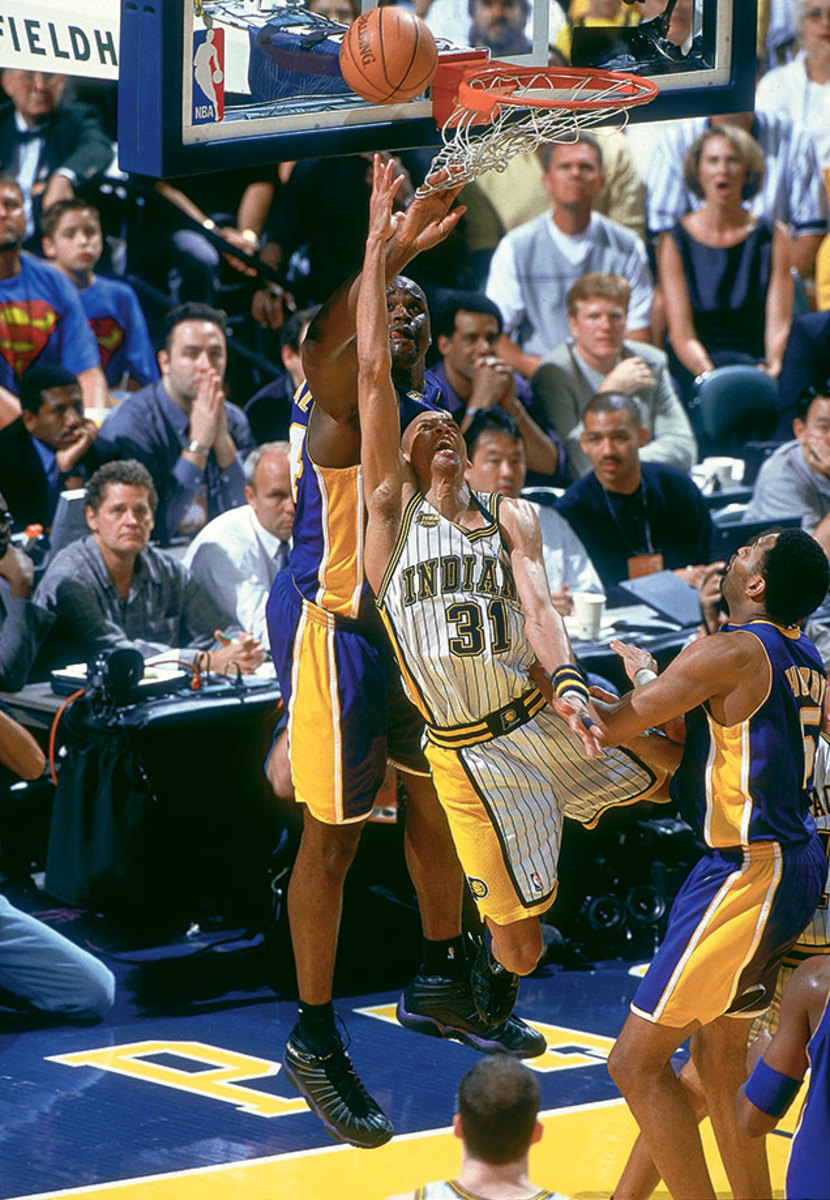
Reggie Miller averaged more than 24 points per game, but couldn't shoot Indiana past Shaq and the Lakers in what would be the only Finals appearance of his career.
2000
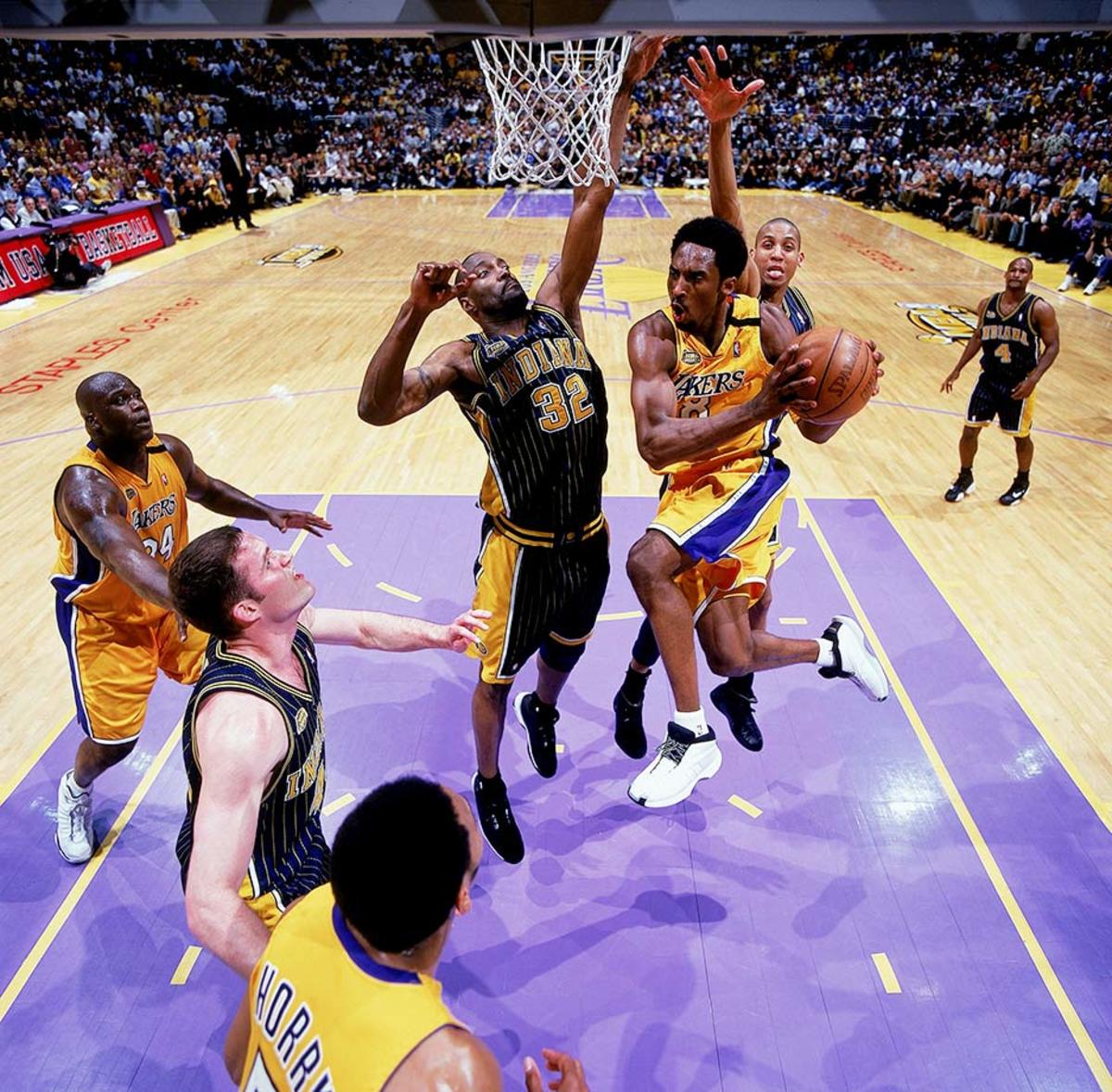
Kobe Bryant drives to the basket against Dale Davis and Reggie Miller in Game 6 between the Lakers and Pacers.
2000
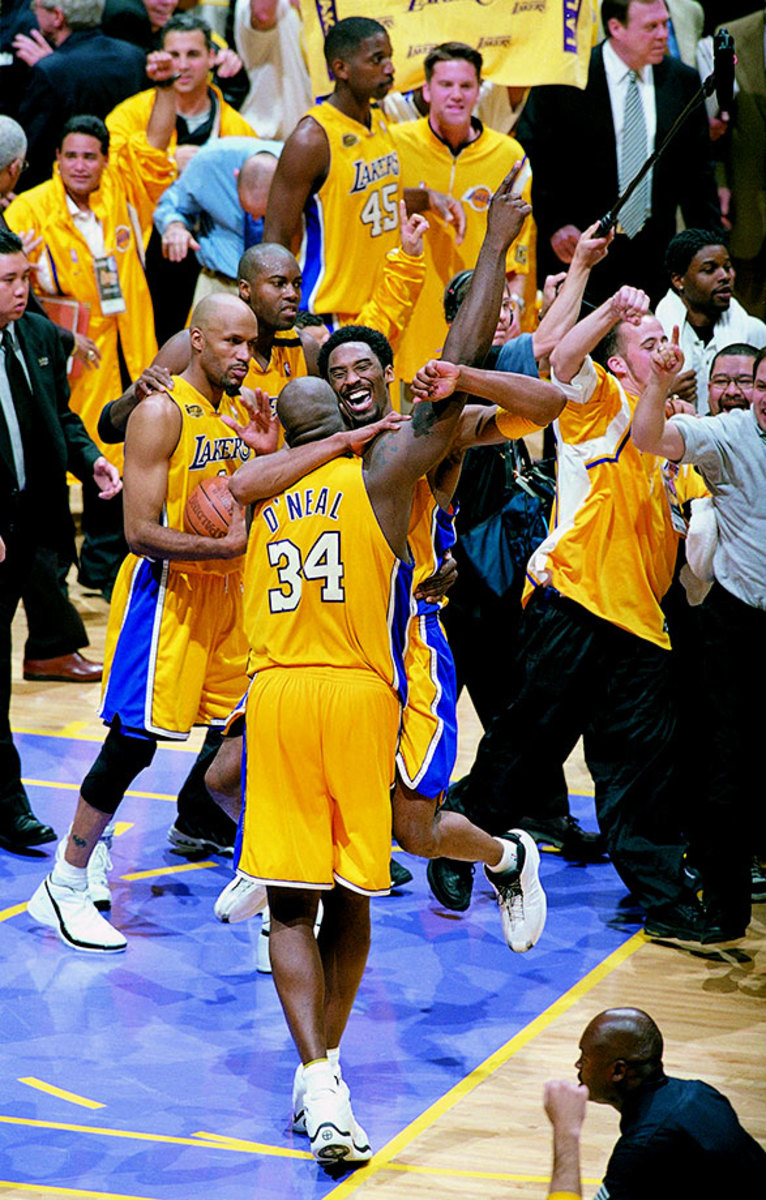
Shaq and Kobe celebrate after winning Game 6 against the Pacers for the championship.
1999
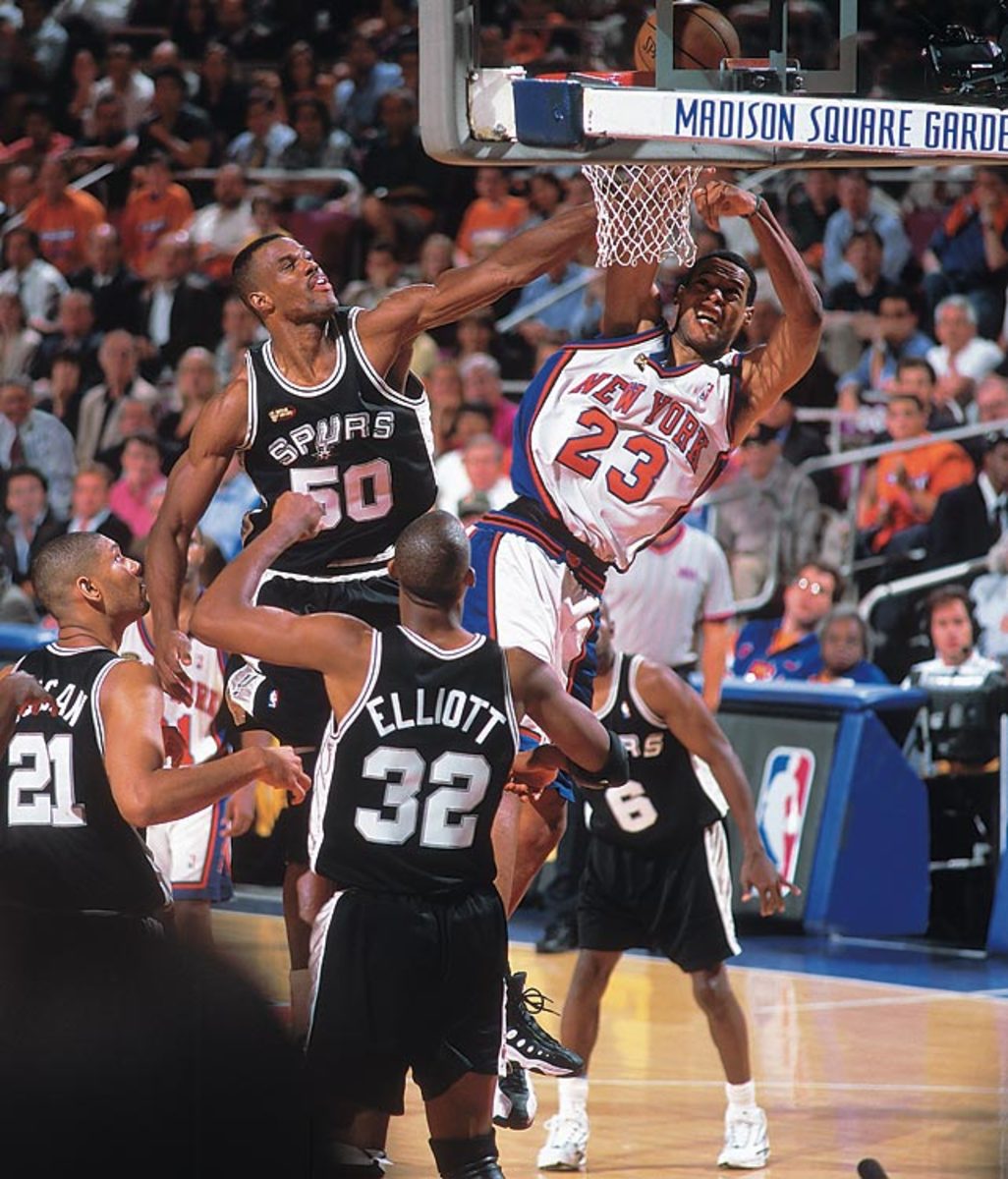
Spurs center David Robinson blocks Marcus Camby of the Knicks in Game 4. San Antonio, led by Robinson and a young Tim Duncan, took up the mantle post-Jordan and defeated the Knicks in five games for its first title.
1999
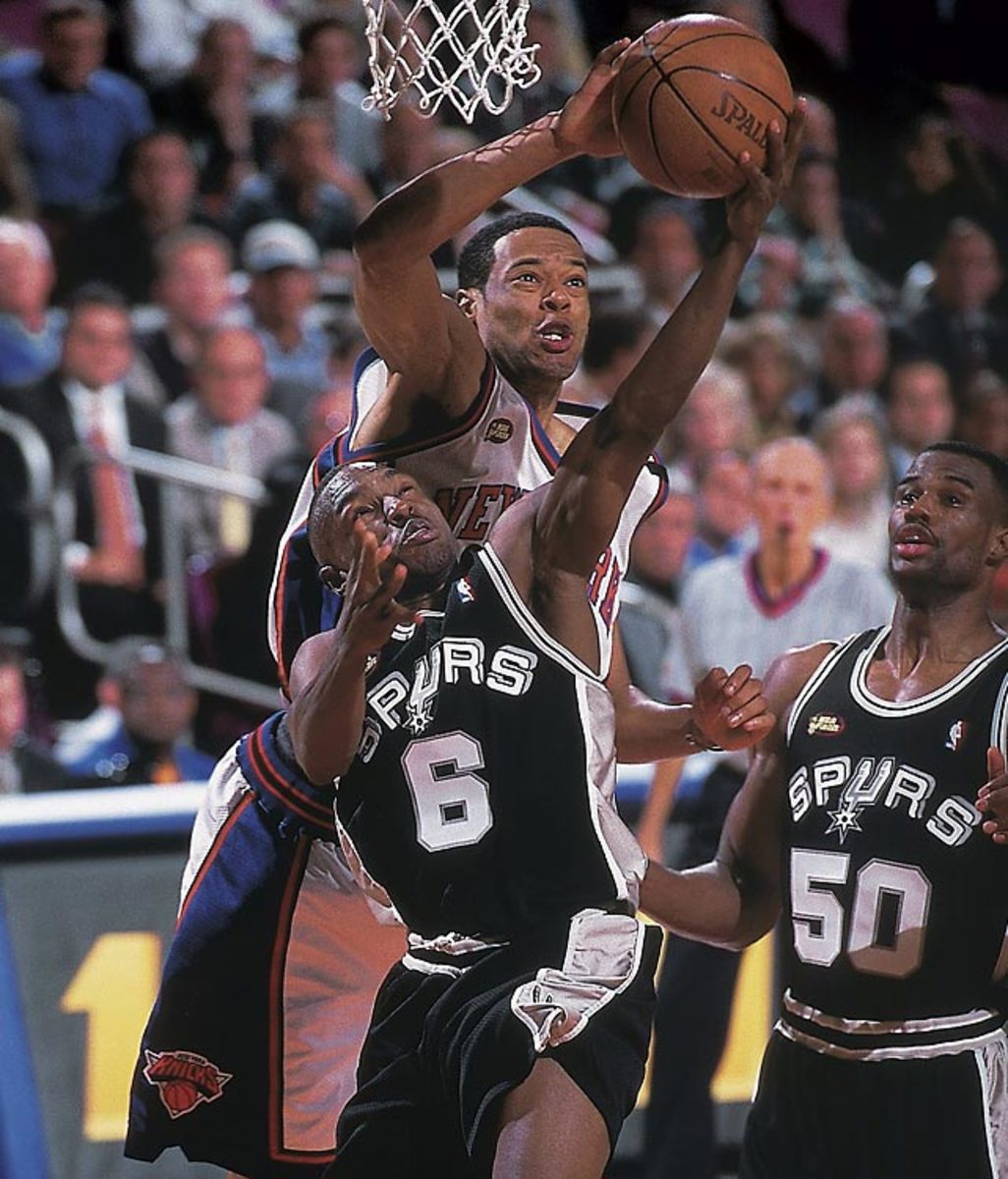
Marcus Camby of the Knicks blocks Spurs guard Avery Johnson in Game 3. Johnson would have the last laugh, hitting a last-minute shot to close out New York in Game 5.
1998
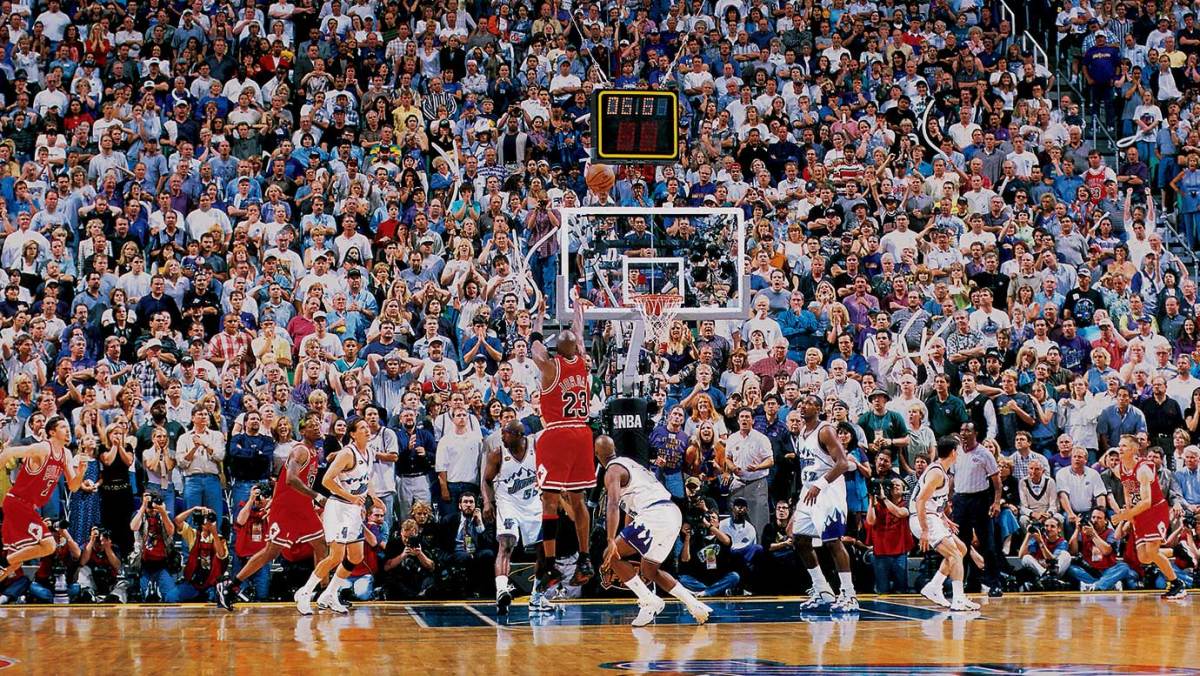
Michael Jordan drains the game-winning jumper over Bryon Russell of the Utah Jazz in Game 6. It would be MJ's last shot as a Bull, but not his last in the NBA — he unretired, of course, in 2001.
1997
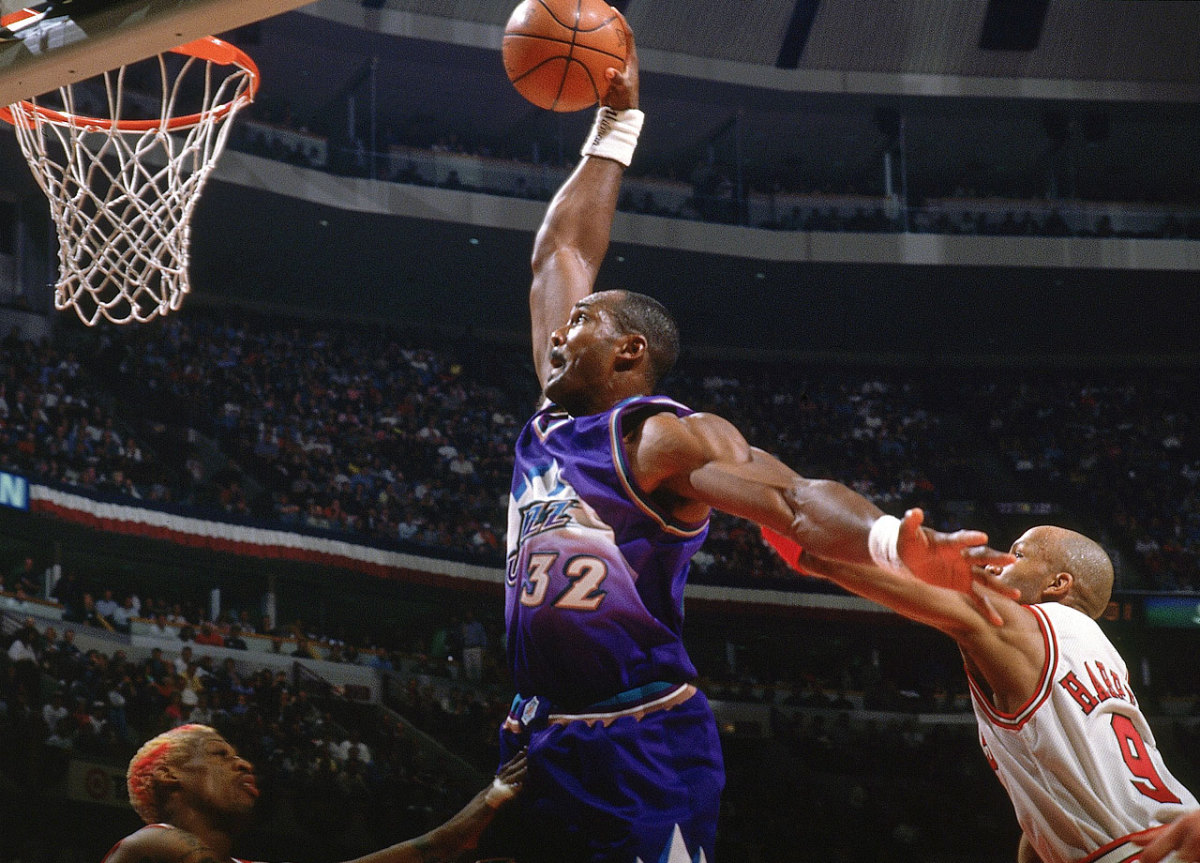
Karl Malone of the Jazz dunks over Dennis Rodman and Ron Harper of the Bulls in Game 1. Malone and point guard John Stockton posed a challenge to the Bulls with their efficiency, but Michael Jordan and company found ways to win yet again.
1997
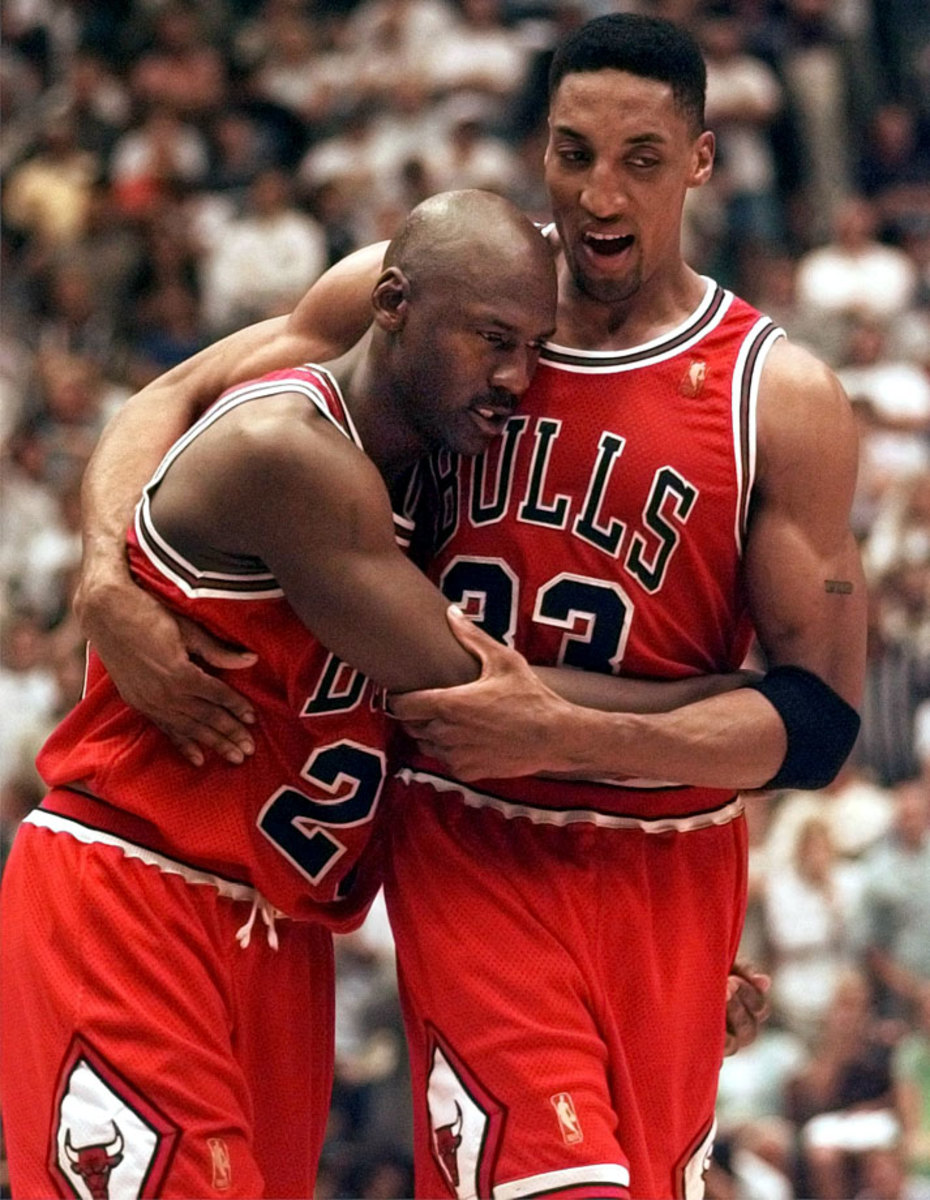
Game 5, which came to be known as "The Flu Game," saw Michael Jordan compete through severe illness to come up big for Chicago. Jordan brought the Bulls back from a 16-point deficit, improbably scoring 38 points in a 90-88 win after spending much of the past 24 hours confined to his hotel bed. At the end of the game, Jordan collapsed into Scottie Pippen's arms in what became an iconic moment.
1997
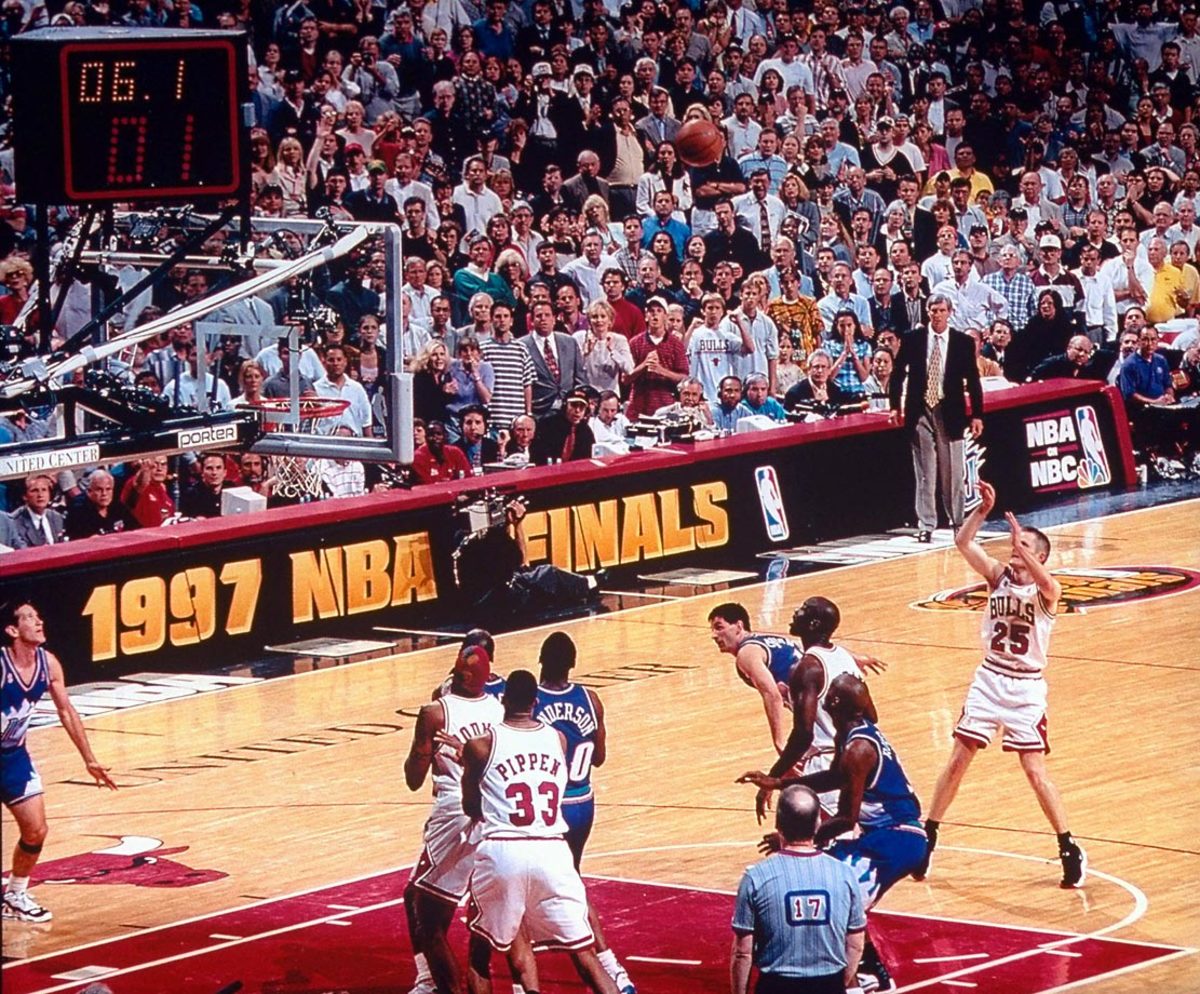
In Game 6, it wasn't Jordan or Pippen (though they combined for 62 points) but rather Bulls guard Steve Kerr who sealed Chicago's fifth title, with a 17-footer.
1996
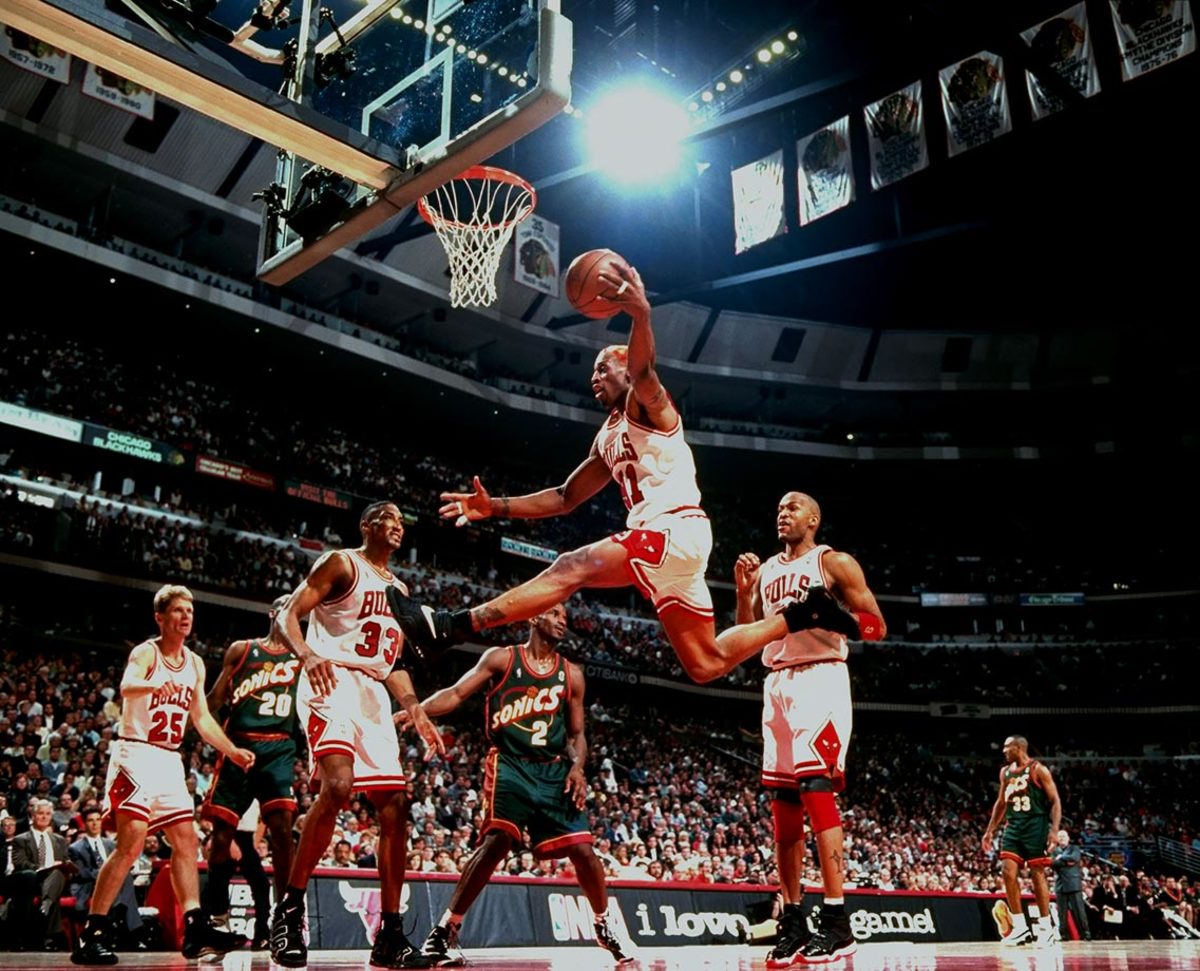
Dennis Rodman grabs a rebound against the Sonics in Game 1. Rodman averaged nearly 14 boards per game in the playoffs for the Bulls, who acquired the power forward from San Antonio before the season.
1996
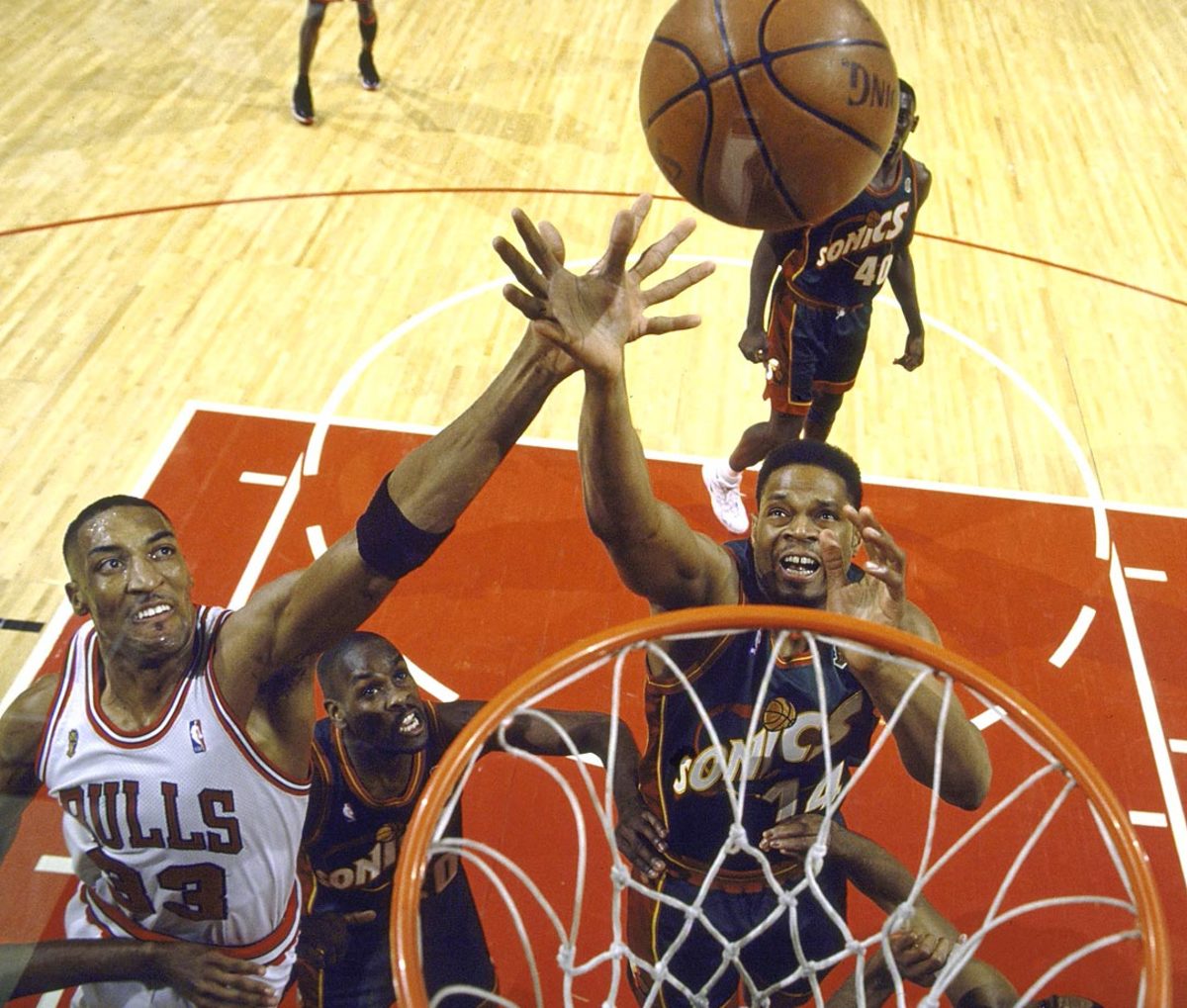
Scottie Pippen of the Bulls and Sam Perkins of the Sonics battle for a rebound. Pippen led Chicago in assists on the series, and the Bulls took their fourth championship, emboldened by Jordan's return from a two-year retirement.
1995
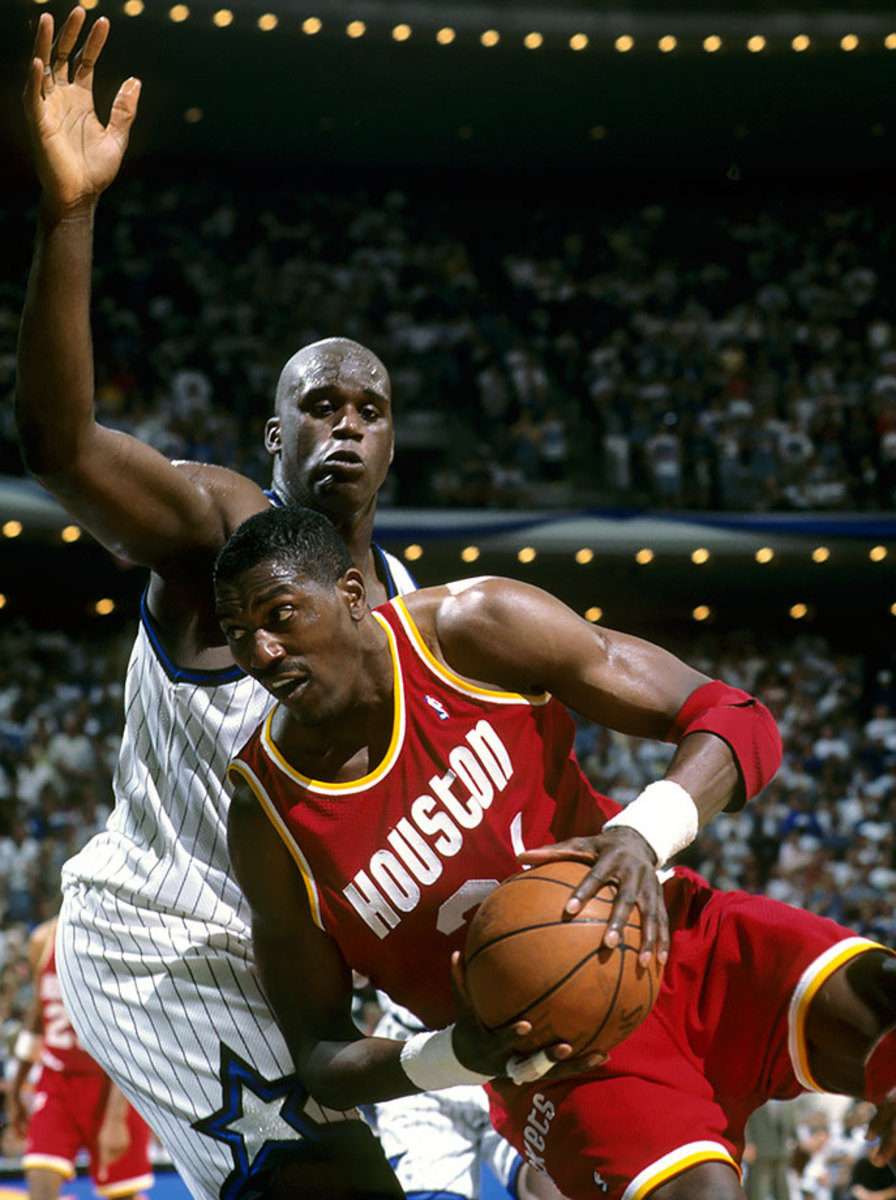
Hakeem Olajuwon averaged nearly 33 points on the series to bolster the Rockets to a second straight title in a four-game sweep.
1995
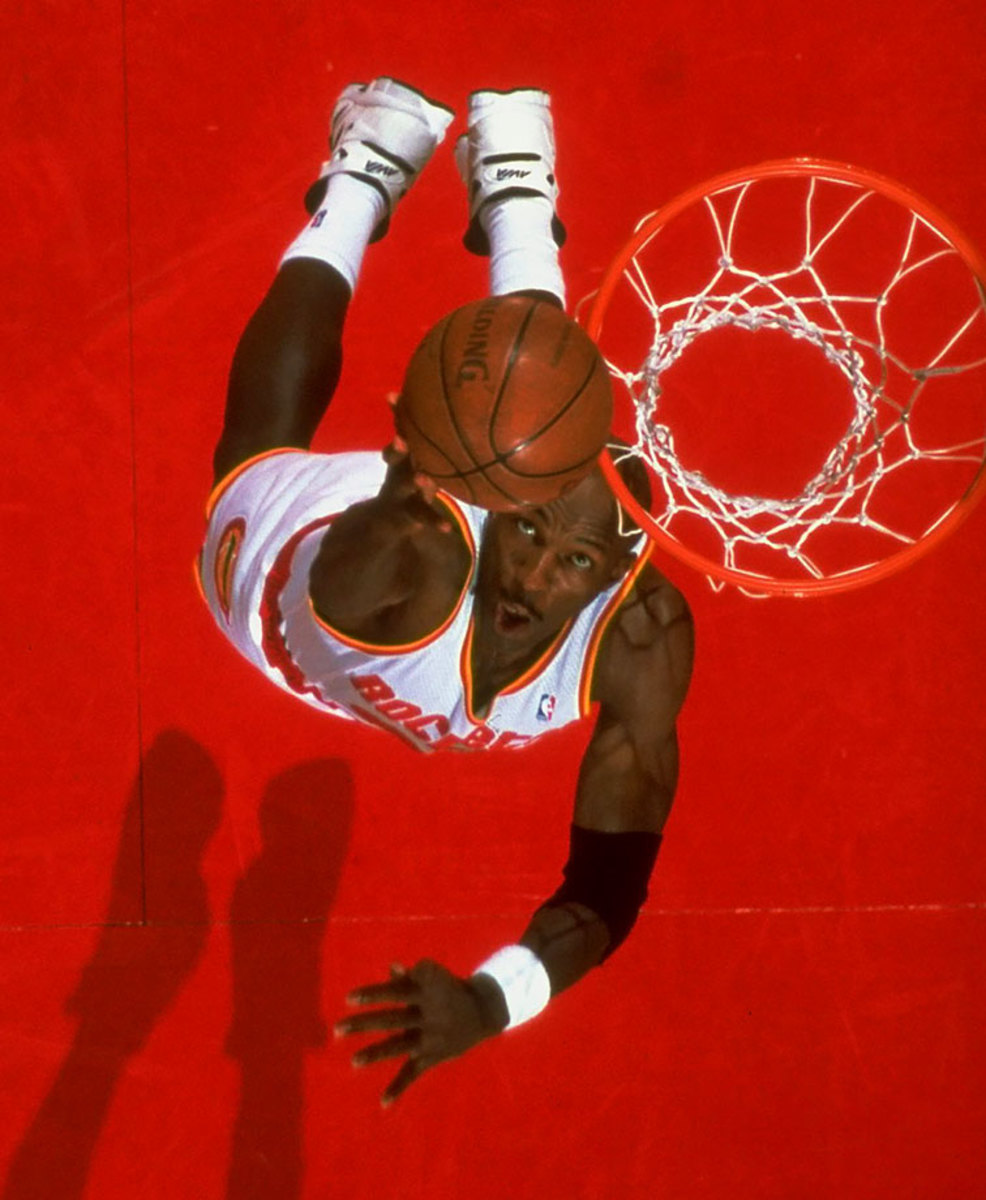
Clyde Drexler scored 25 points in a Game 3 win that all but sealed the series.
1994
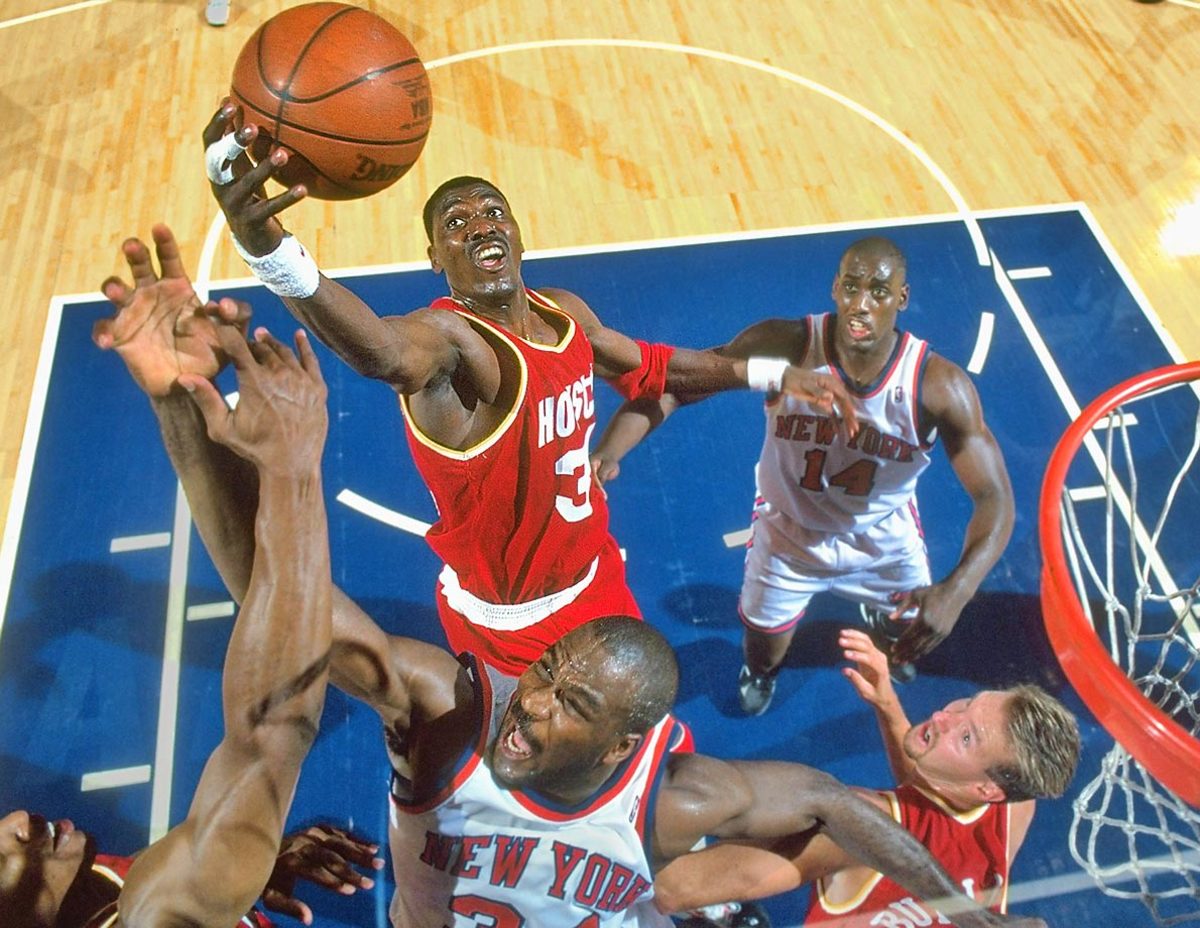
Hakeem Olajuwon was named Finals MVP, averaging nearly 33 points for the series to bolster the Rockets to their first title, in a four-game sweep.
1994
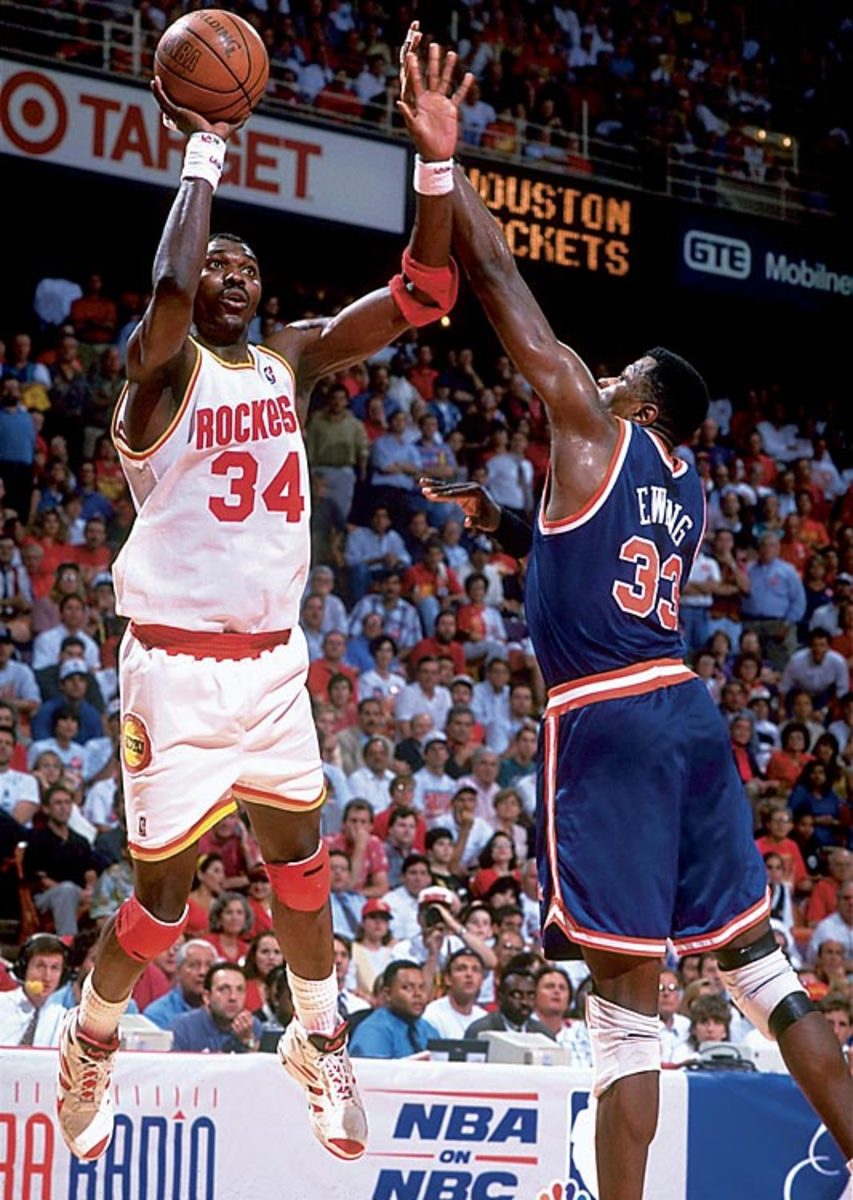
Star centers Hakeem Olajuwon of the Rockets and Patrick Ewing of the Knicks duked it out in 1994 in a series that went seven games.
1994
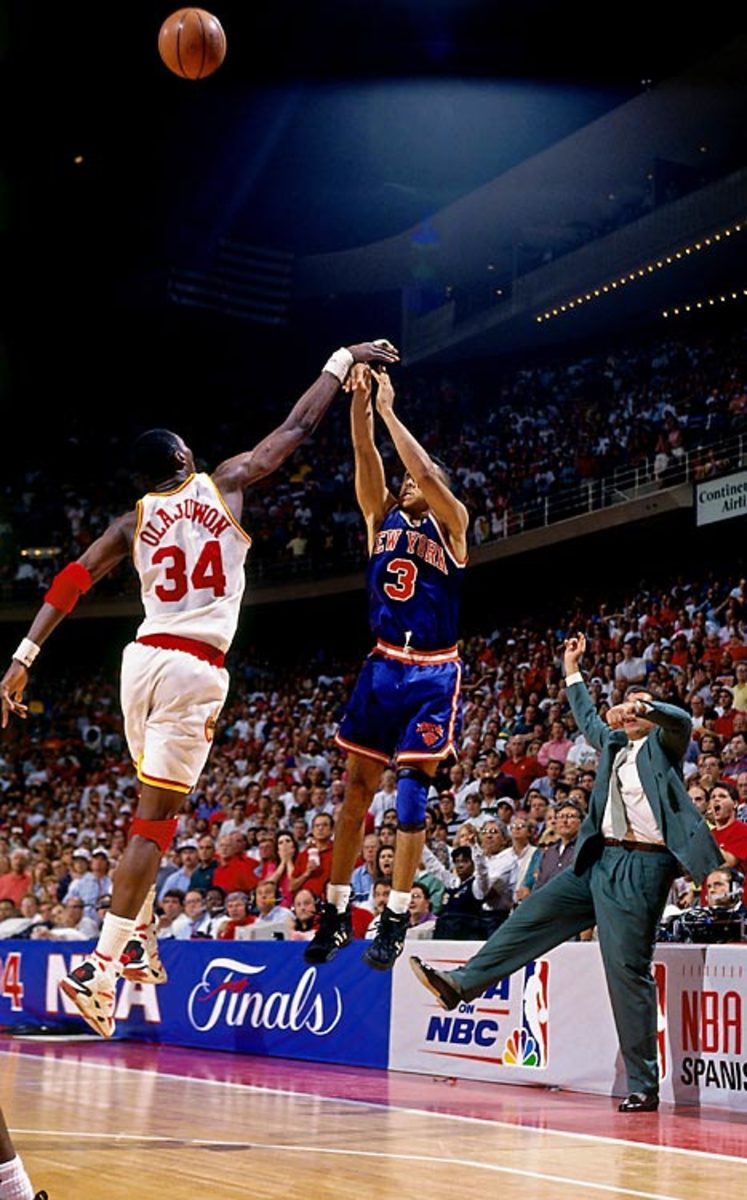
In Game 6, Olajuwon blocked a potential game-winning three by Knicks guard John Starks to secure the win and send the series to a final game.
1993
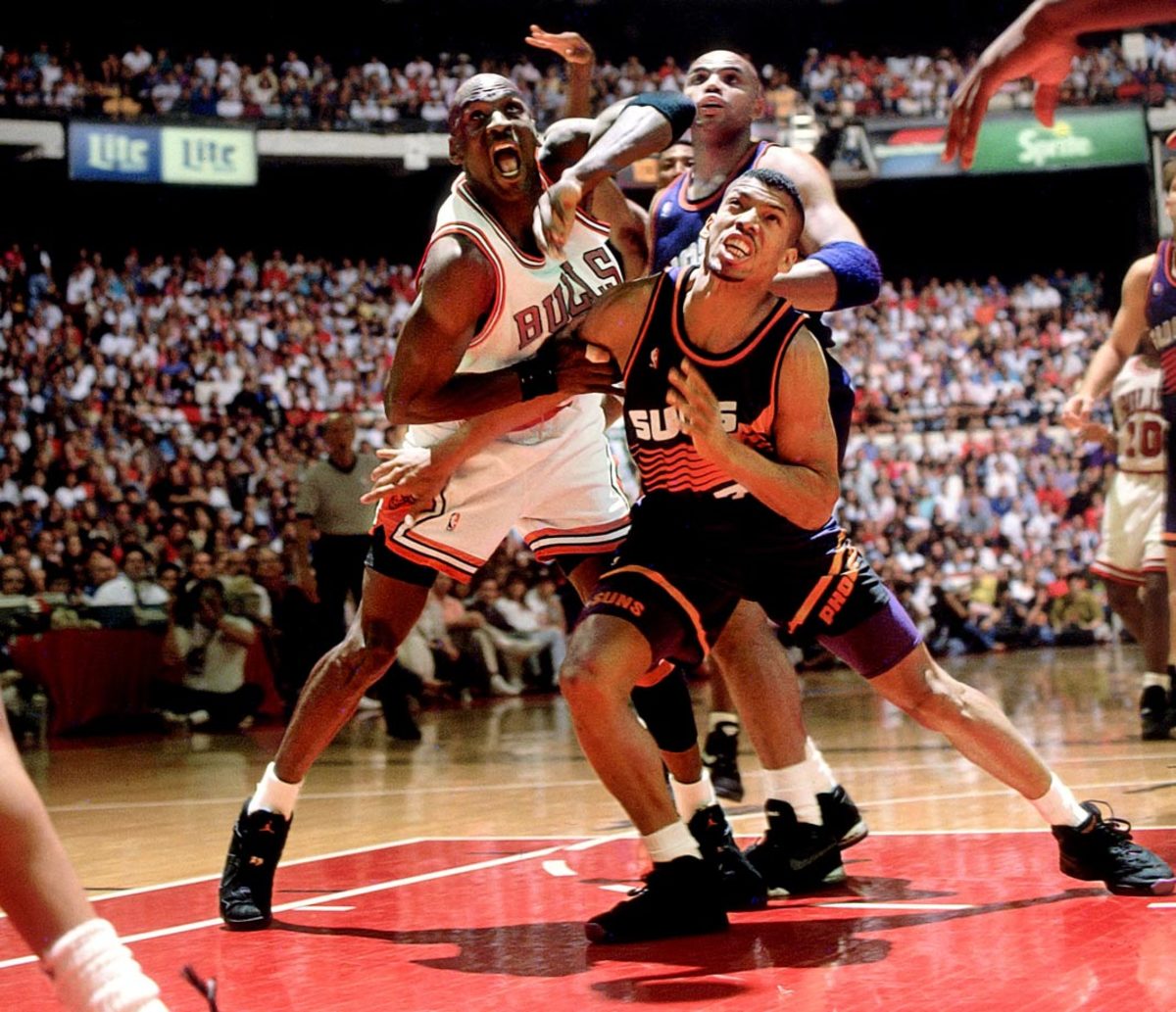
Michael Jordan battles Suns guard Kevin Johnson beneath the hoop.
1993
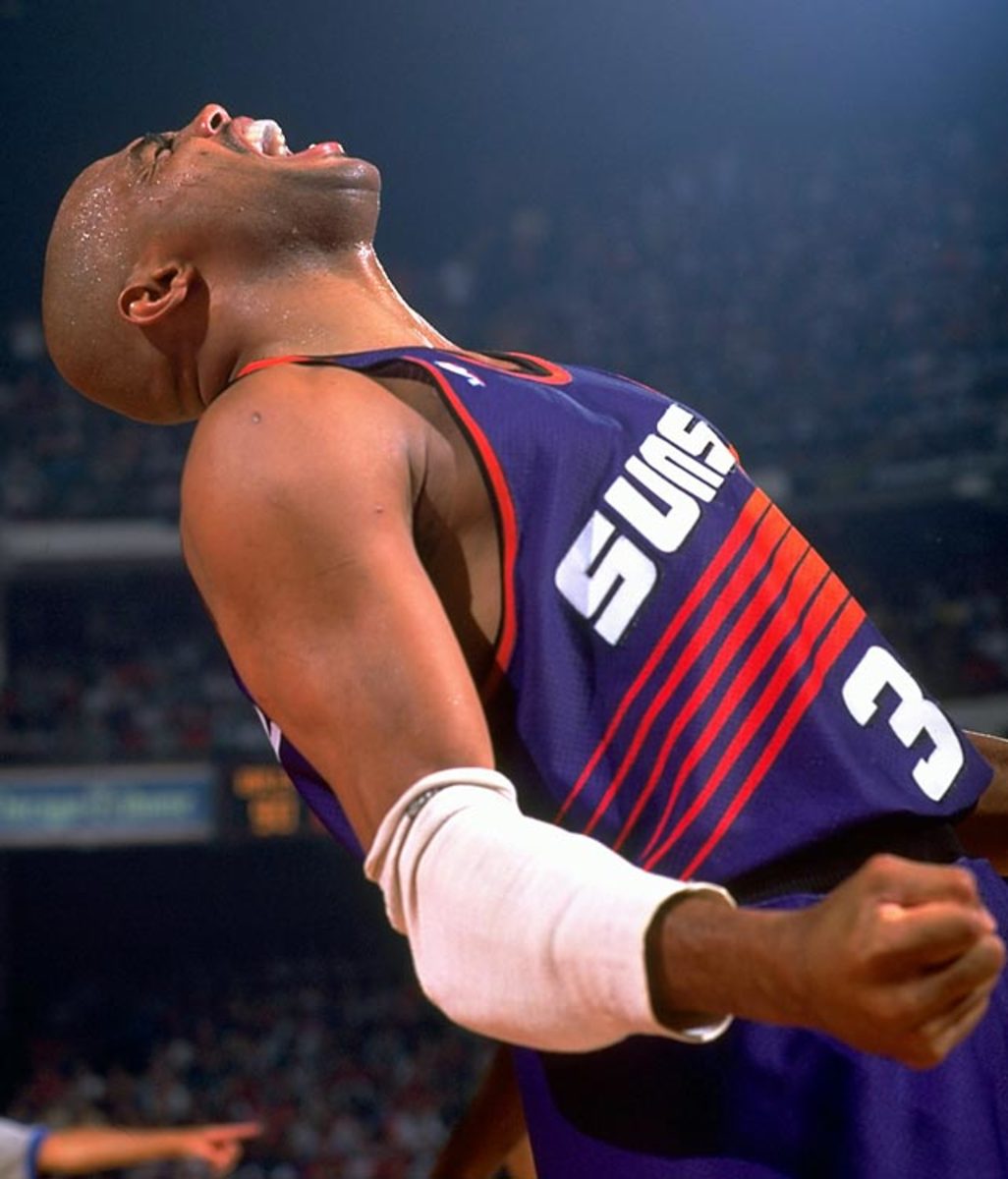
Suns star Charles Barkley celebrates Phoenix's Game 5 win. Though "Sir Charles" averaged 27.3 points and 13 rebounds, it wasn't enough to lift the Suns past Chicago. Years later, he would admit the series made him realize Jordan was the superior player.
1993
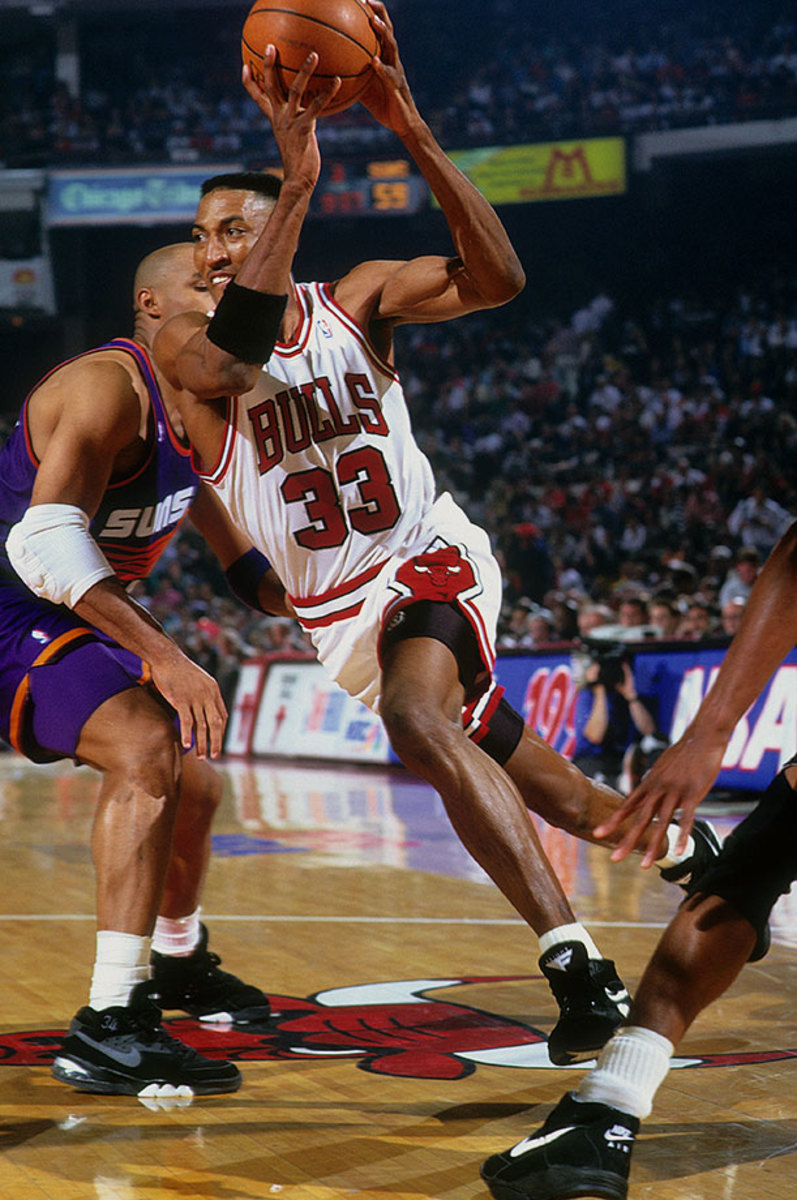
Scottie Pippen of the Bulls drives to the basket against the Suns. Pippen averaged 21.2 points, 9.2 rebounds and 7.7 assists in the series.
1992
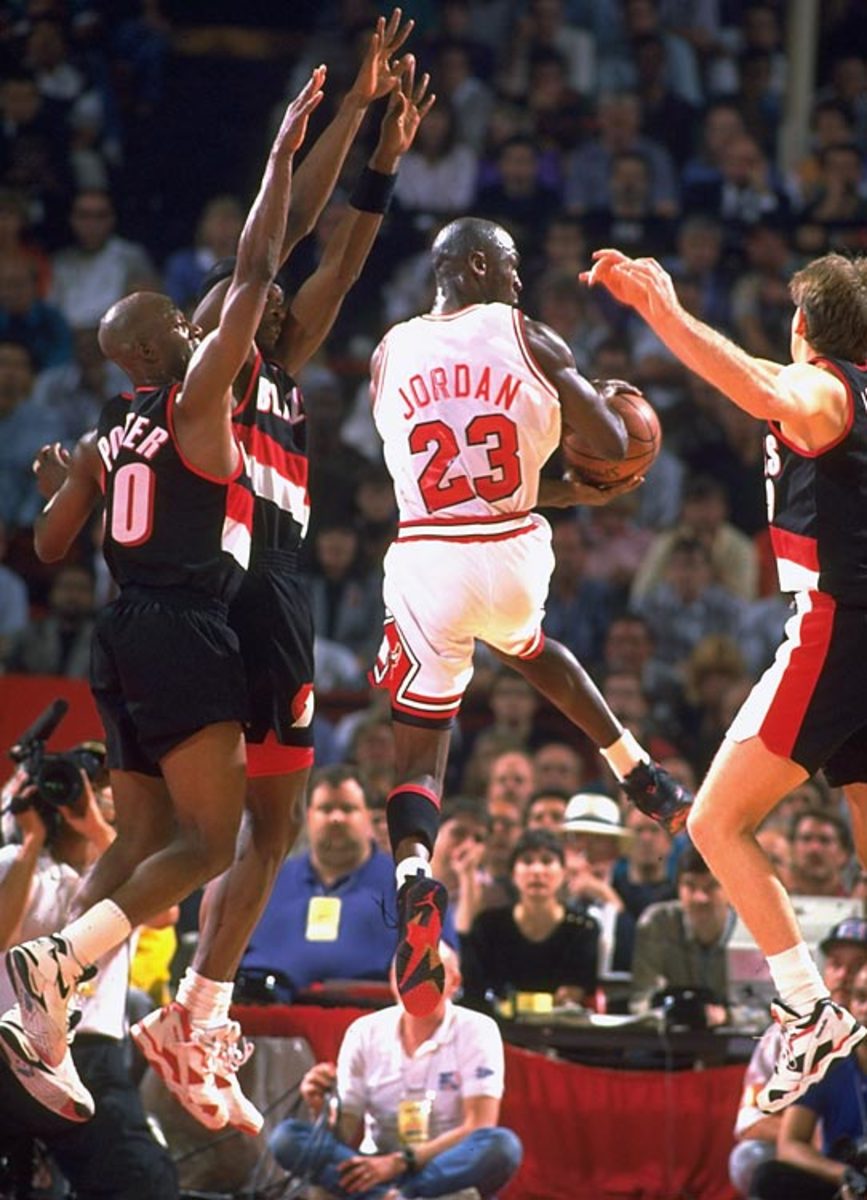
Michael Jordan and the Bulls appeared in their second Finals to face Clyde Drexler and the Portland Trail Blazers. The debate about who was better between MJ and Clyde was effectively silenced as Jordan hit six first-half threes in Game 1, famously shrugging at the broadcast table after hitting the sixth one. Jordan's dominance set the tone for the series.
1991
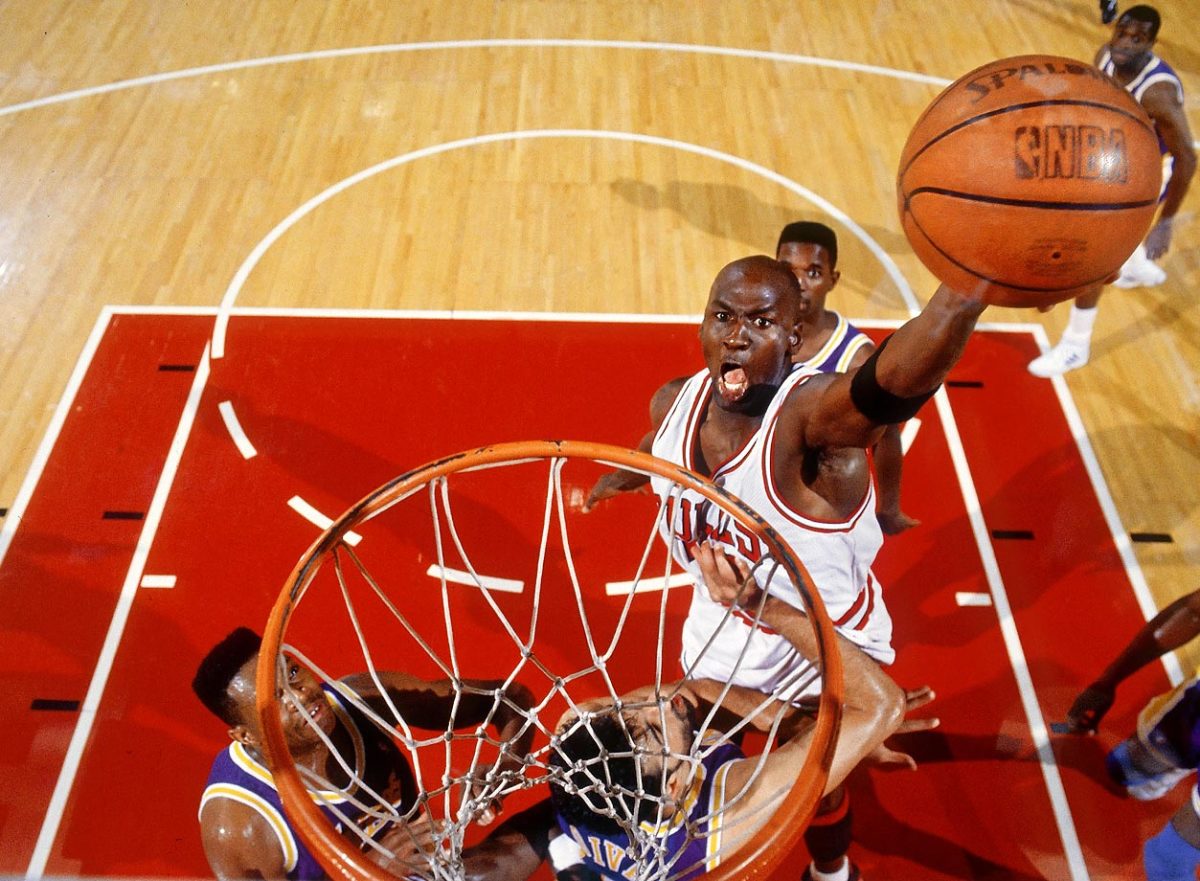
Michael Jordan skies for a dunk over Lakers center Vlade Divac in Game 2, a 107-86 Chicago win. Jordan scored 33 points on 15-of-18 shooting, including his famous hand-switching layup to lead the Bulls.
1991
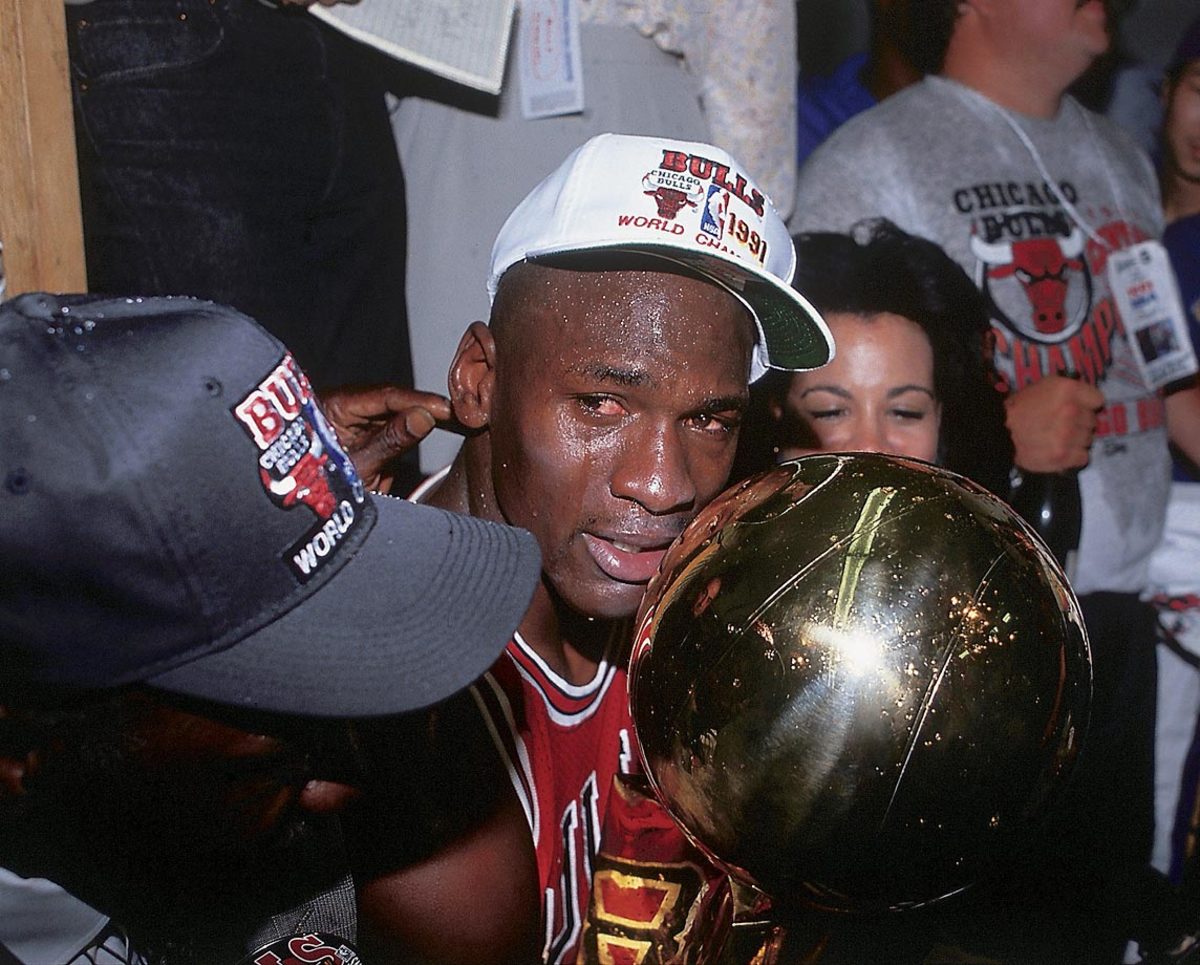
With his parents at his side, Michael Jordan holds the Chicago Bulls' first-ever championship trophy after defeating the Los Angeles Lakers in five games.
1990
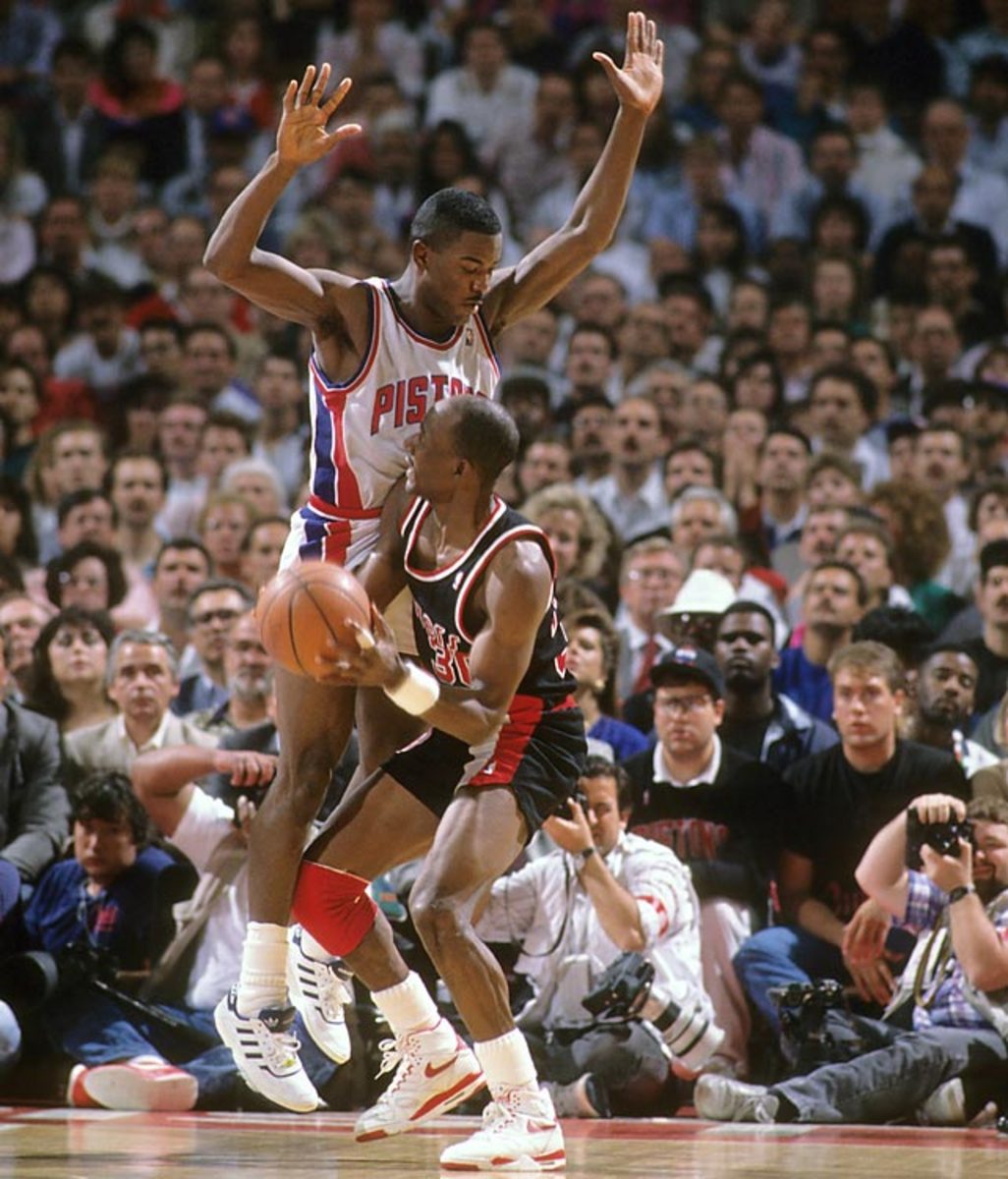
Joe Dumars of the Pistons defends Terry Porter of the Trail Blazers in Game 1. The backcourt of Isiah Thomas (27.6 points per game) and Dumars (20.6) propelled Detroit to the championship in five games. Vinnie Johnson hit the series-clinching jumper at the end of Game 5.
1989
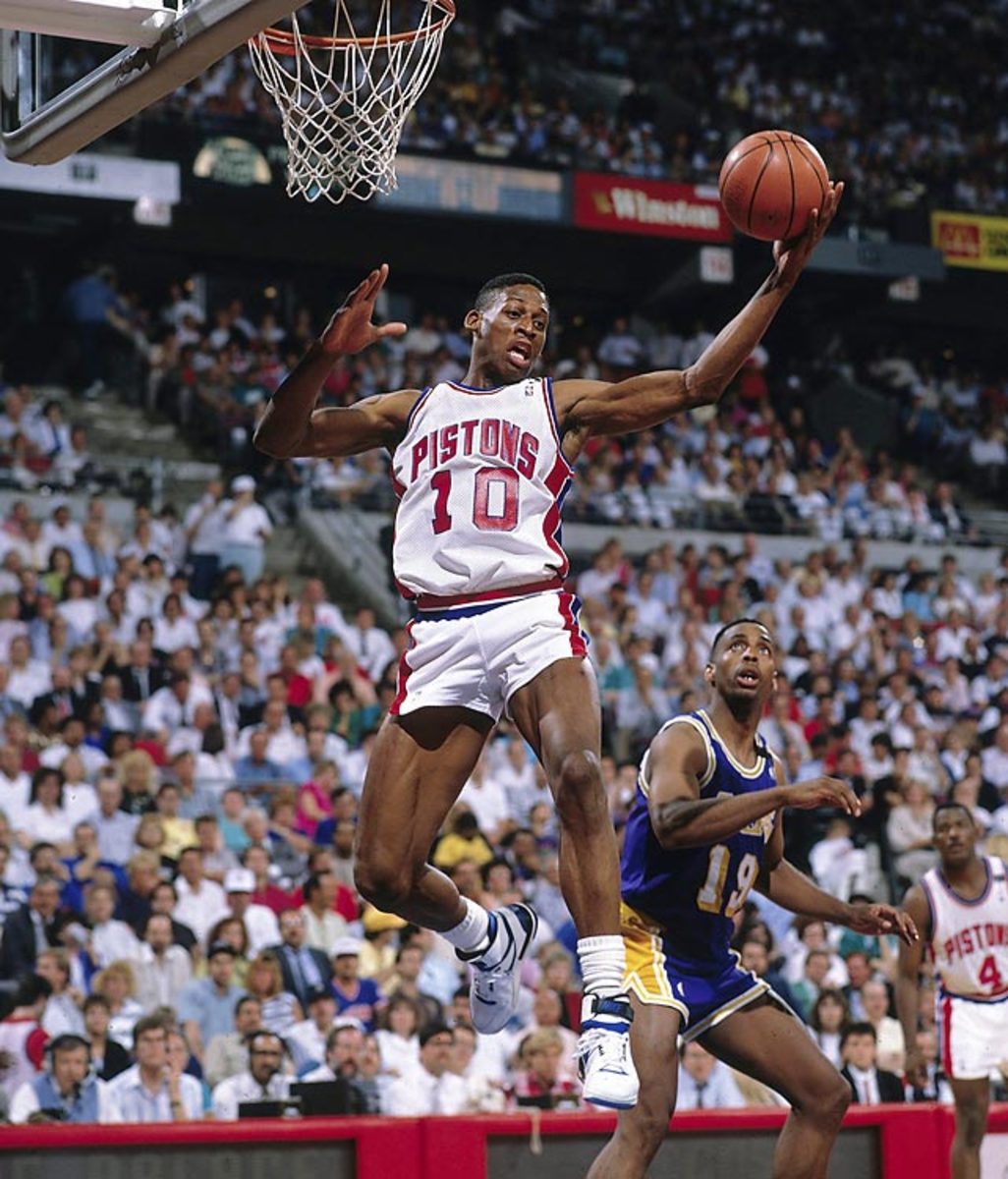
Pistons forward Dennis Rodman snatches a board against the Lakers. Detroit ended L.A.'s bid for a third straight title with a four-game sweep after Magic Johnson injured his hamstring early in Game 2.
1988
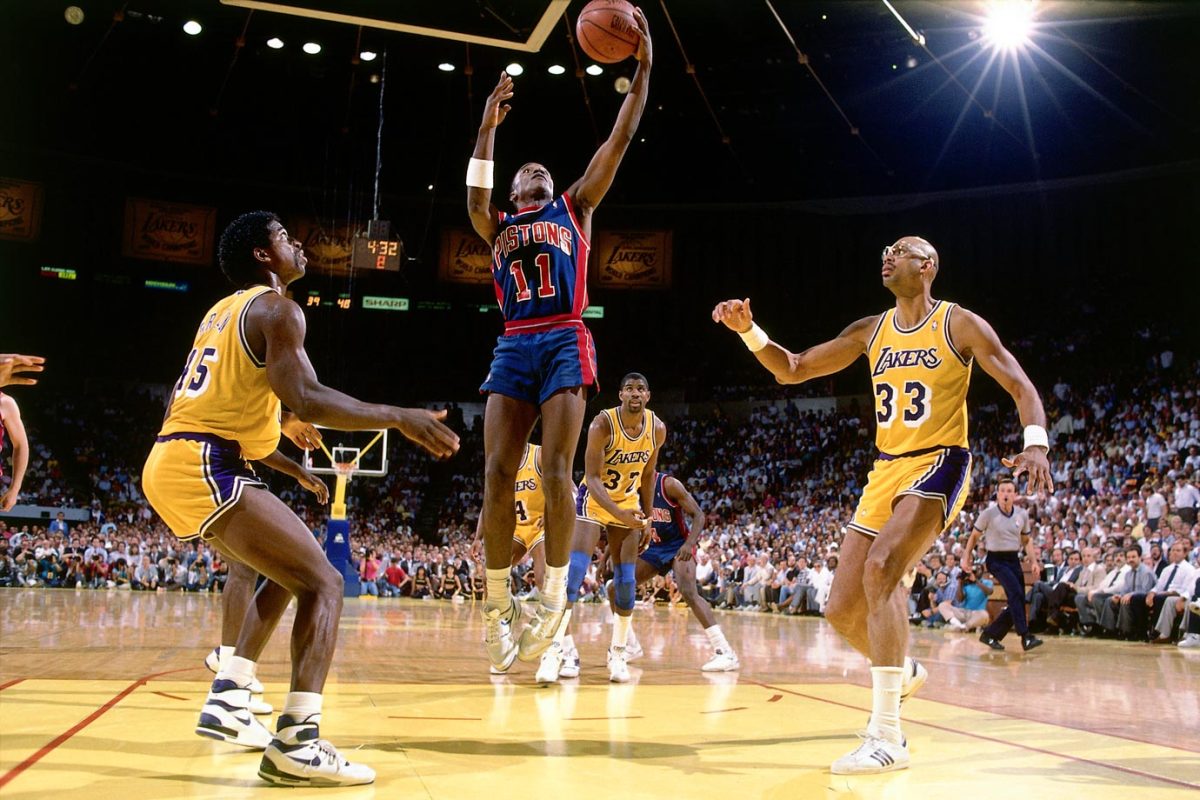
A new challenger emerged from the Eastern Conference as Detroit's "Bad Boys," starring point guard Isiah Thomas took on the Lakers. With Detroit up 3-2 going into Game 6, Thomas scored 25 gritty third-quarter points playing on a sprained ankle. It wouldn't be enough — L.A. won Game 6 103-102, with 28 points from James Worthy.
1988
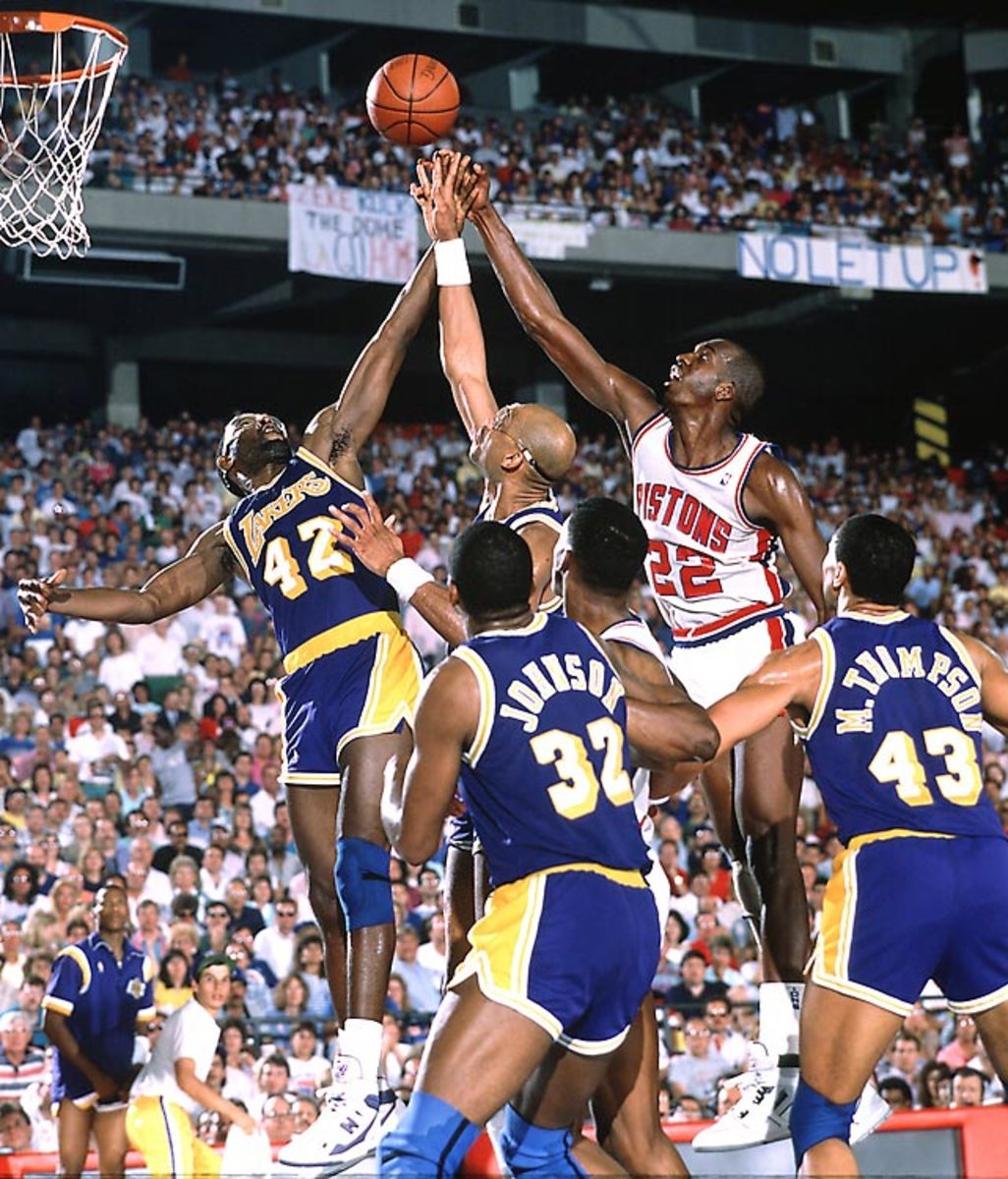
In Game 7 James Worthy (42) again shouldered the load for Los Angeles, recording a triple-double with 26 points, 16 rebounds and 10 assists to secure another Lakers title and Finals MVP accolades.
1987
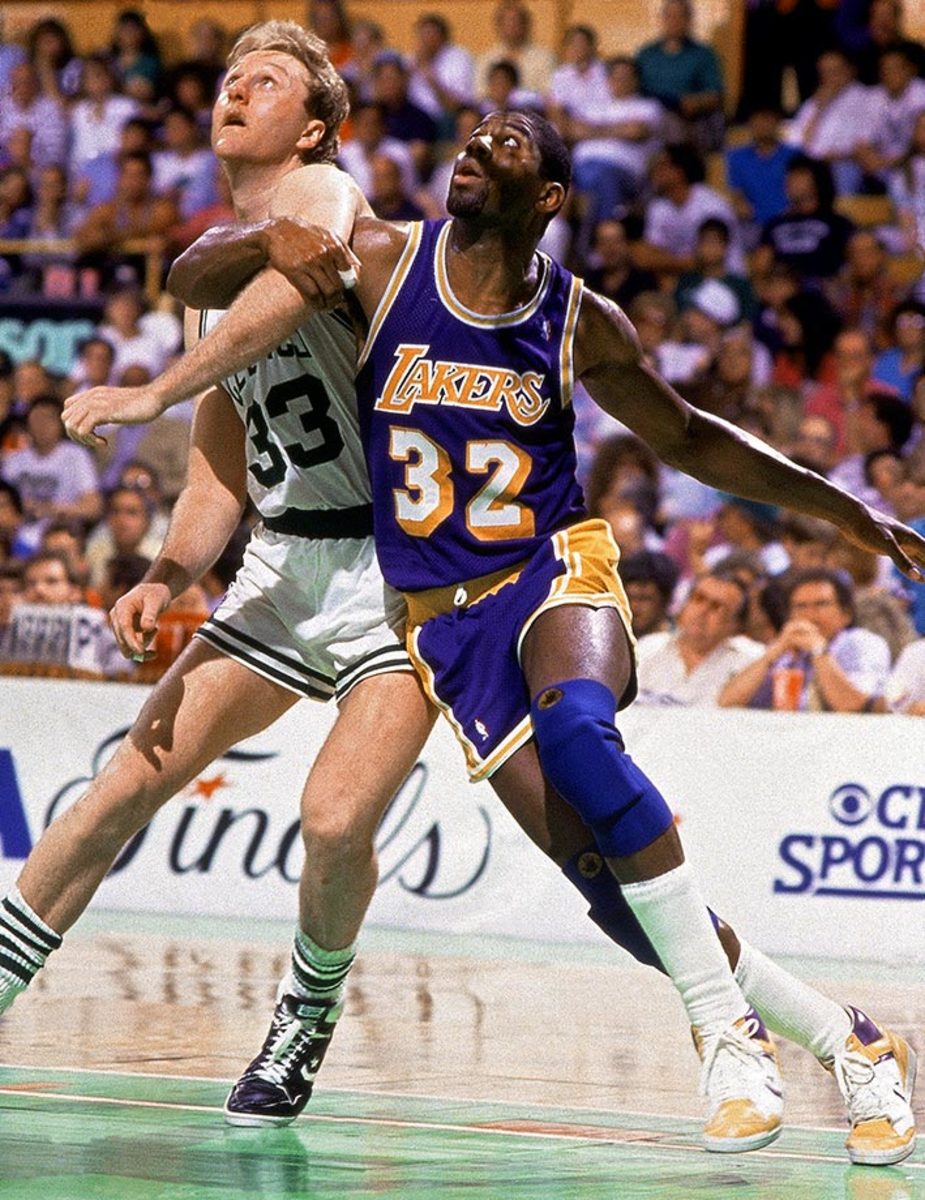
Boston, L.A., Bird and Johnson would meet in the Finals for the last time in 1987. Los Angeles won in six games with the core of Johnson, Abdul-Jabbar and Worthy again proving to be the cream of the crop.
1987
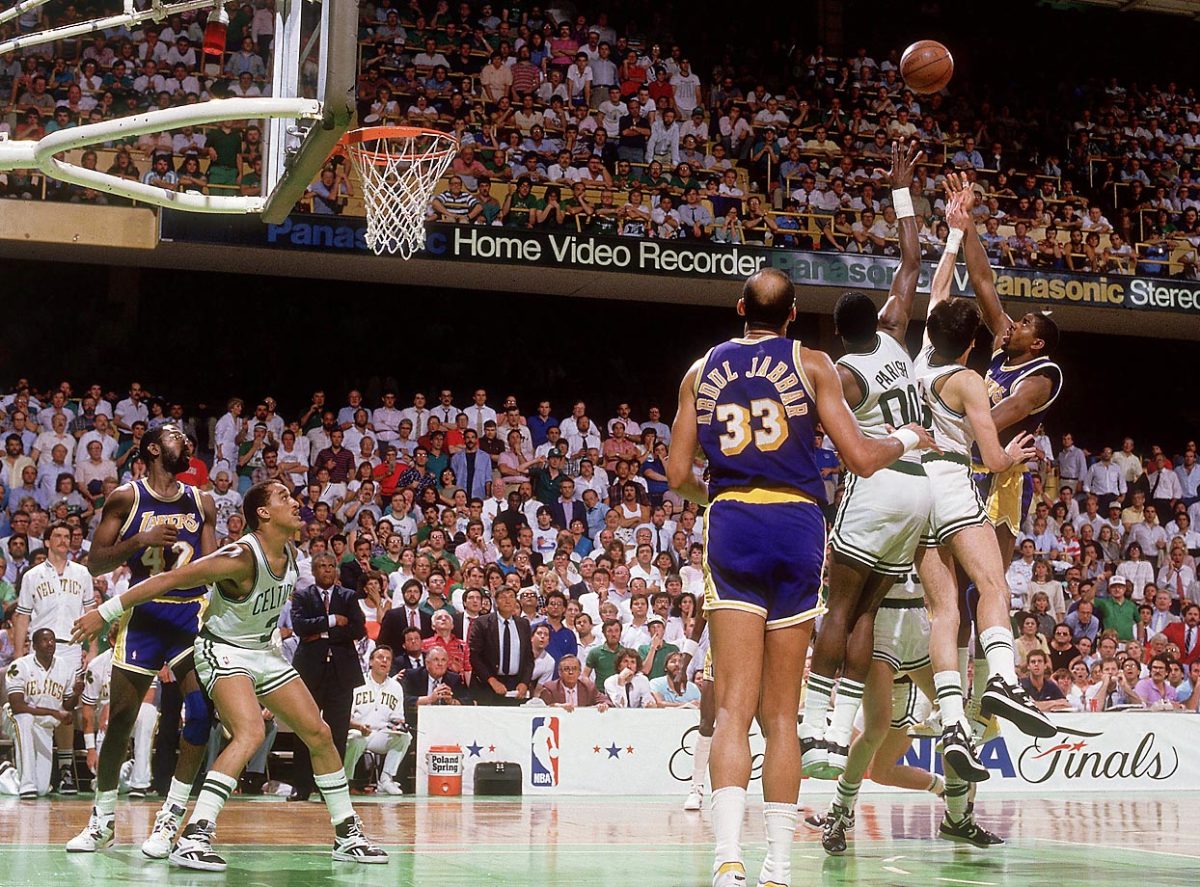
Magic Johnson drains his famous junior sky hook over Robert Parish and Kevin McHale to win Game 4 for the Lakers at the buzzer. Johnson was named Finals MVP.
1986
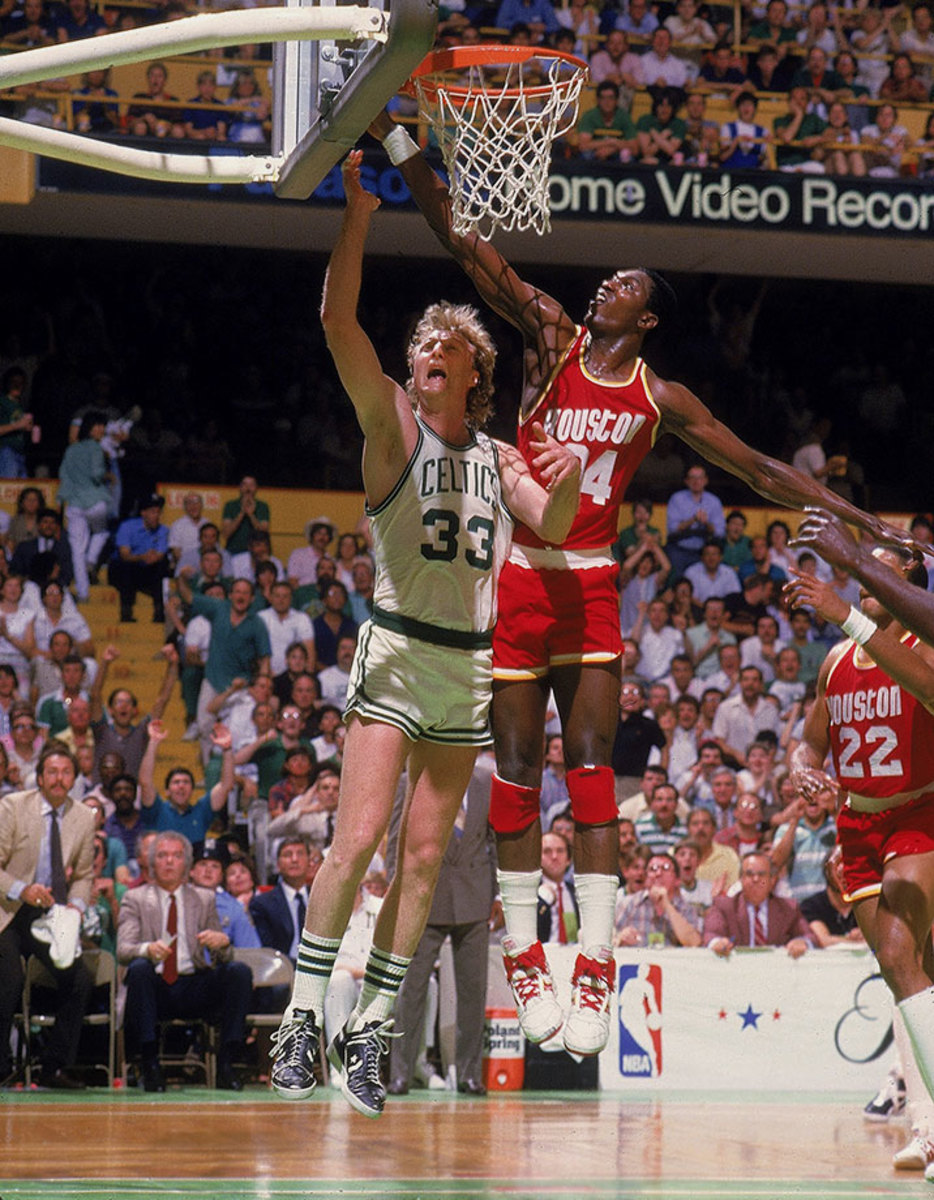
Larry Bird battles Hakeem Olajuwon under the hoop. The Celtics would win their second title in three straight finals appearances, paced by the dominant Bird (24 points, 9.7 rebounds and 9.5 assists per game), who posted a triple-double in the series-clinching Game 6.
1985
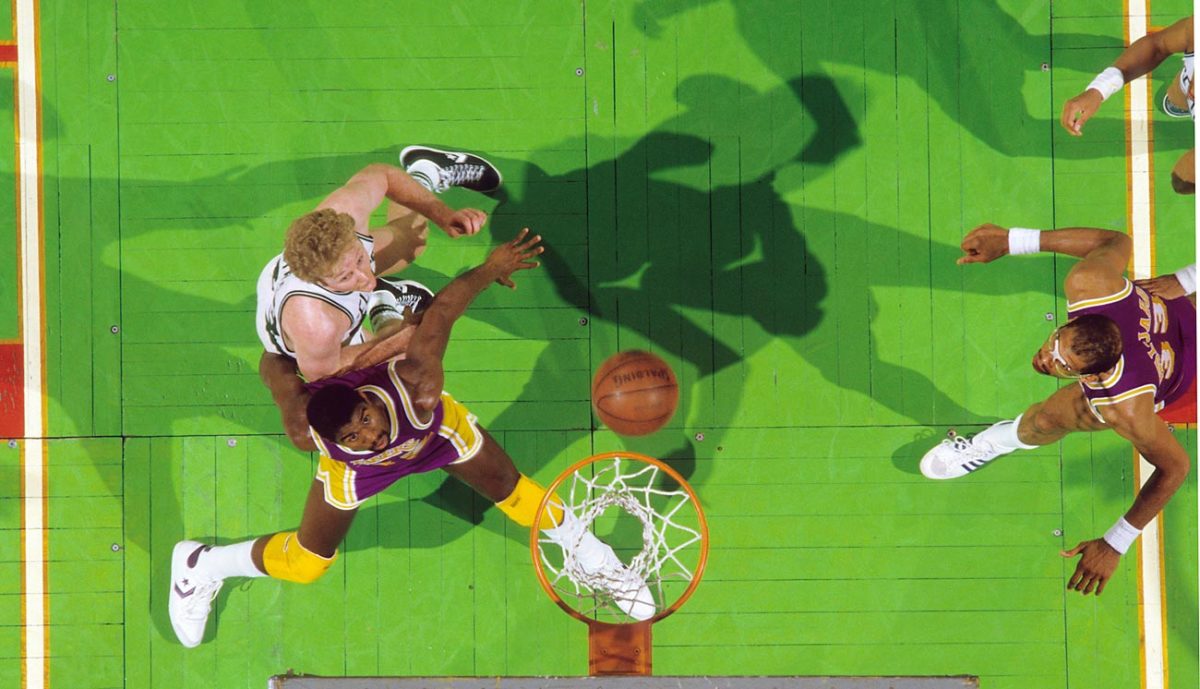
Rival stars Magic Johnson of the Lakers and Larry Bird of the Celtics battle beneath the rim in Game 1 of the 1985 Finals. L.A. pulled the series out in six games thanks to vintage play from 37-year-old Kareem Abdul Jabbar.
1984
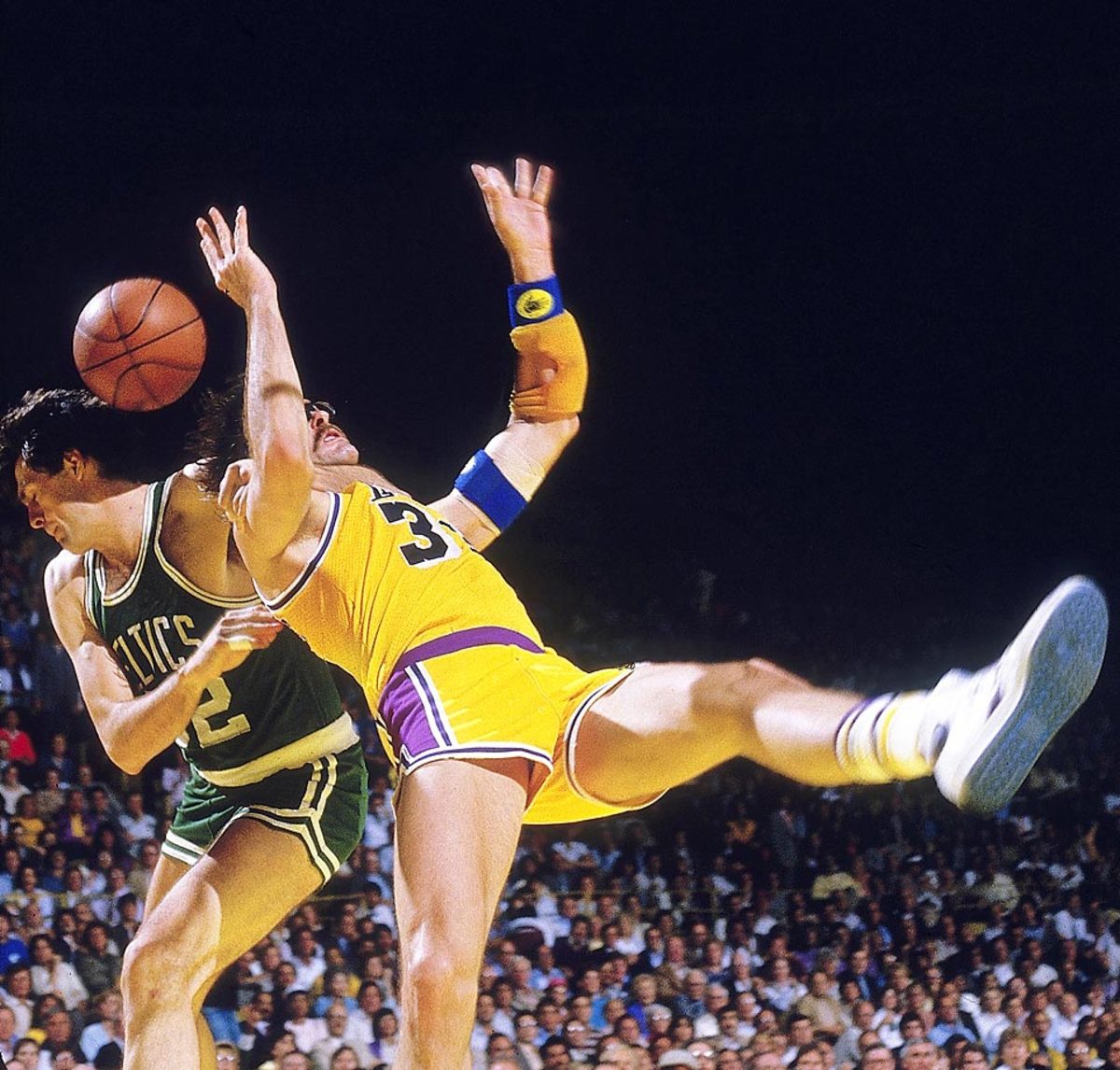
Kevin McHale of the Celtics delivers an extremely hard foul on Lakers forward Kurt Rambis in Game 4. The Boston-Los Angeles rivalry was reignited with an epic seven-game clash between the teams.
1984
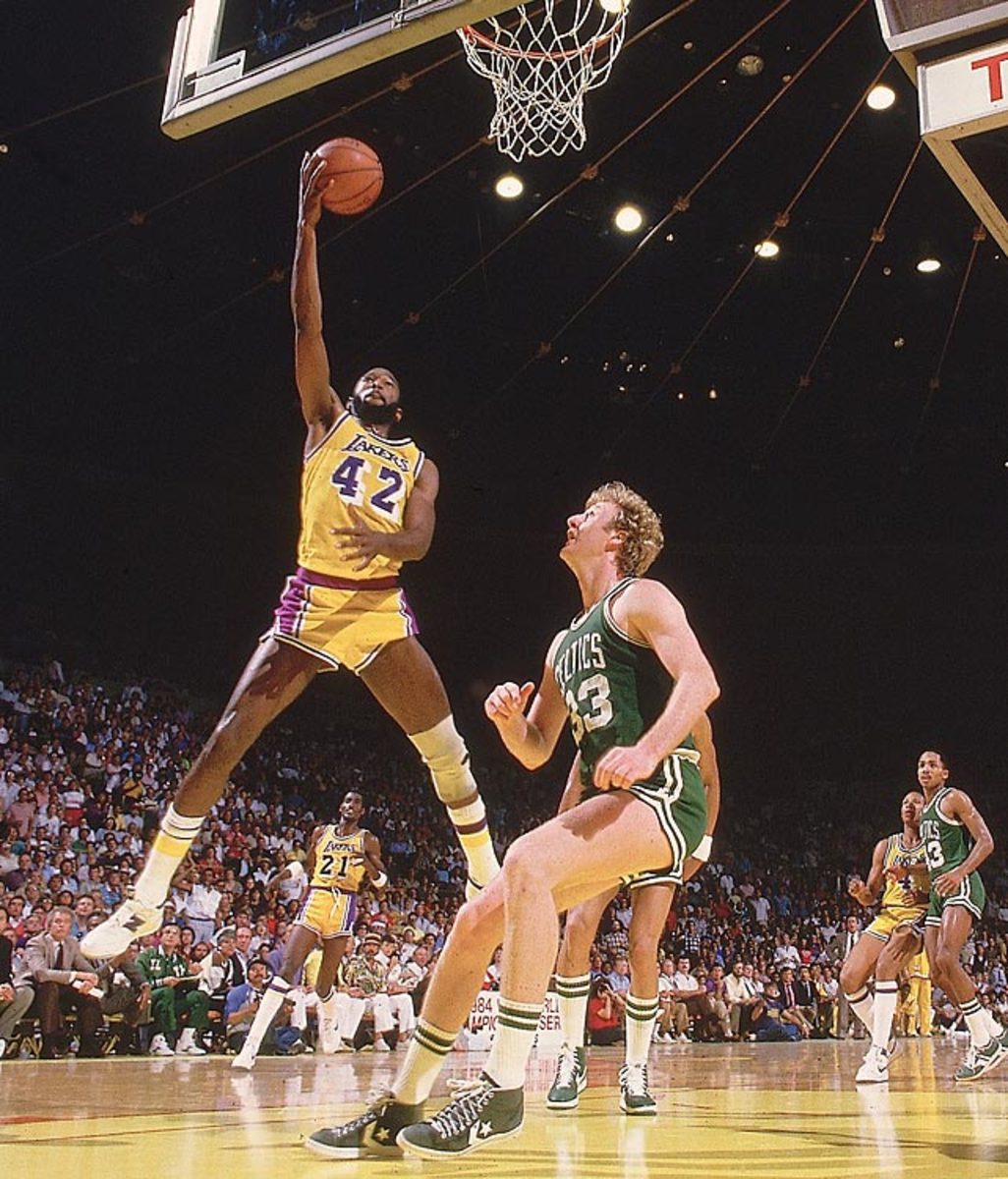
Los Angeles forward James Worthy rises to score over Boston's Larry Bird during a 119-108 Game 6 Lakers victory.
1983
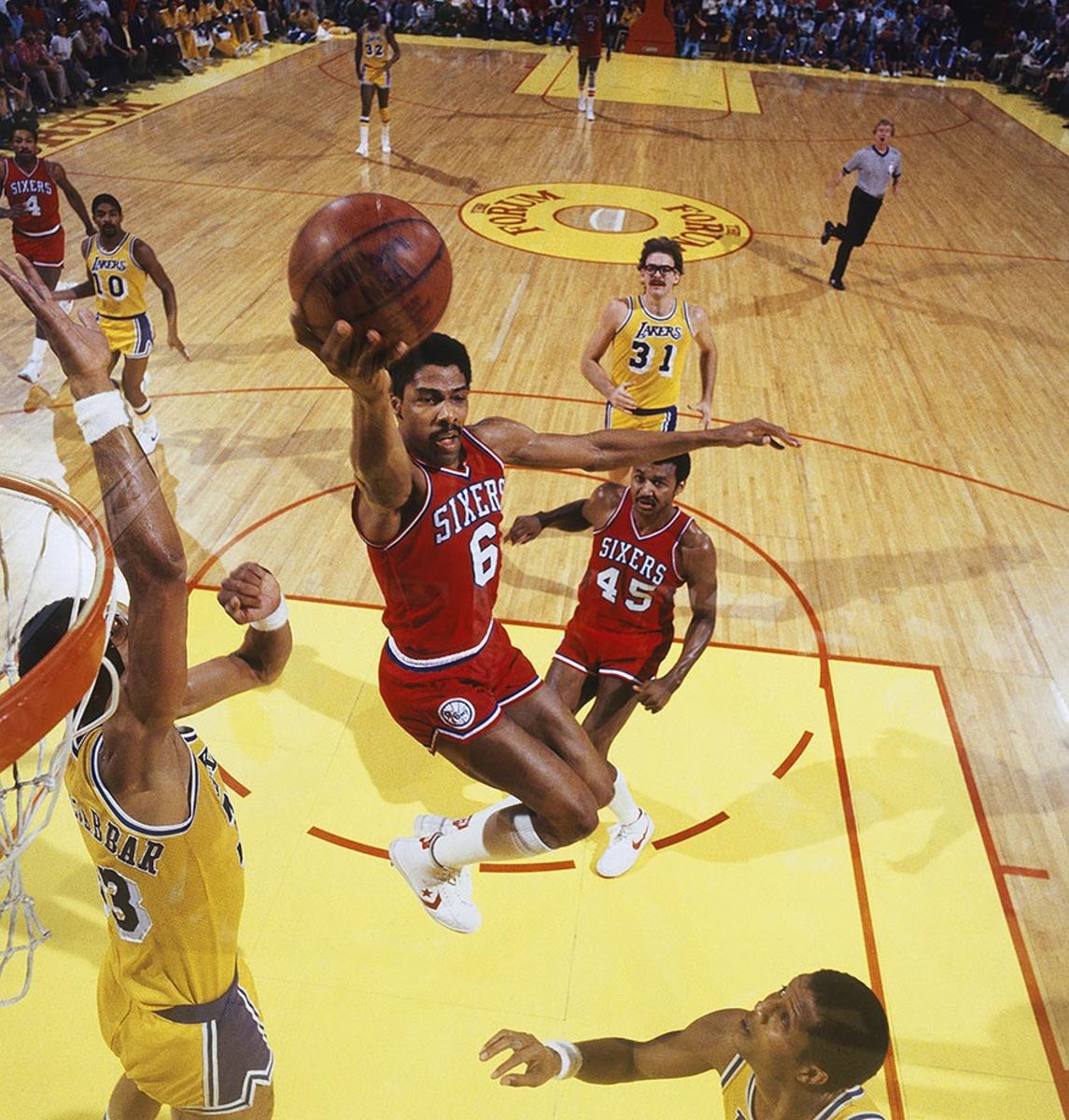
Julius Irving of the Sixers soars to the rim in their third finals matchup with the Lakers in four seasons. This time Philadelphia would prevail in a four-game sweep.
1983
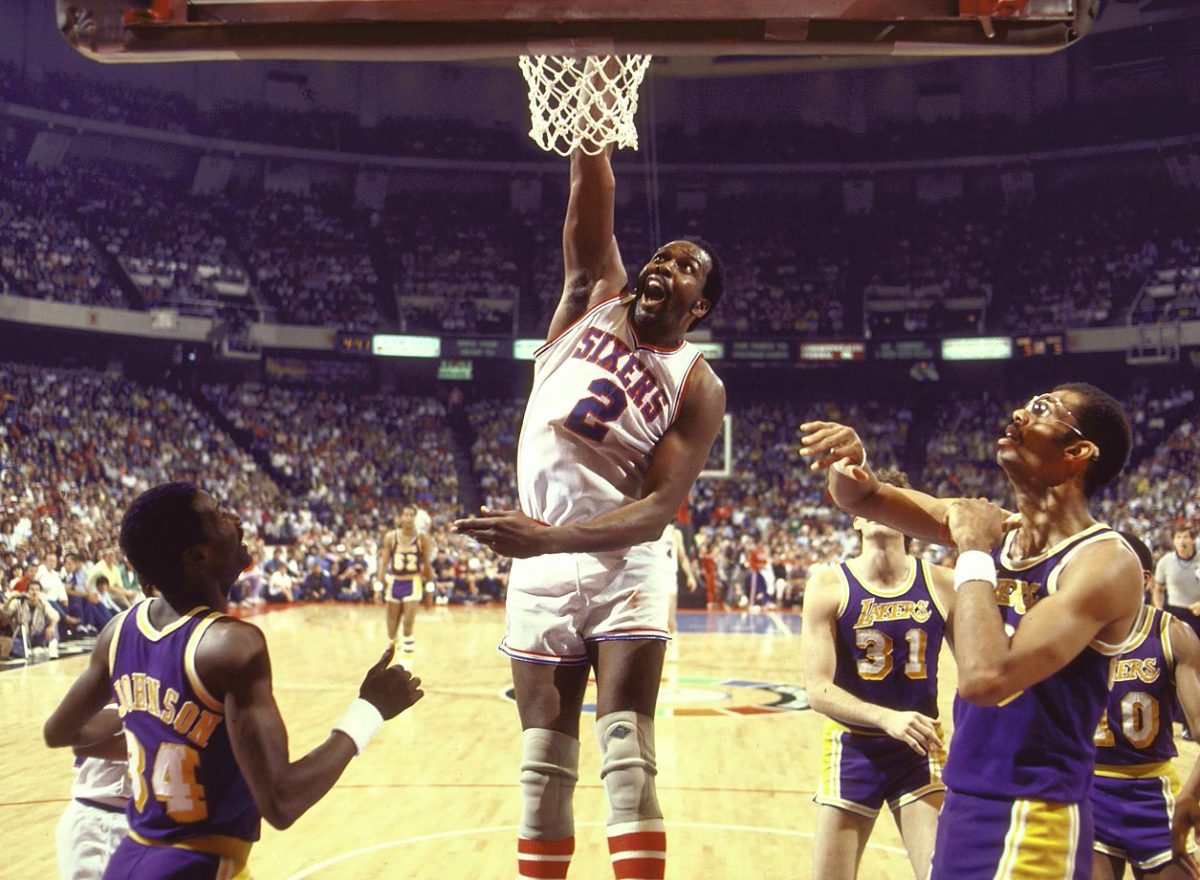
Finals MVP Moses Malone was dominant in Philadelphia's sweep of Los Angeles, averaging 25.8 points and 18 rebounds per game while outplaying L.A. center Kareem Abdul-Jabbar.
1982
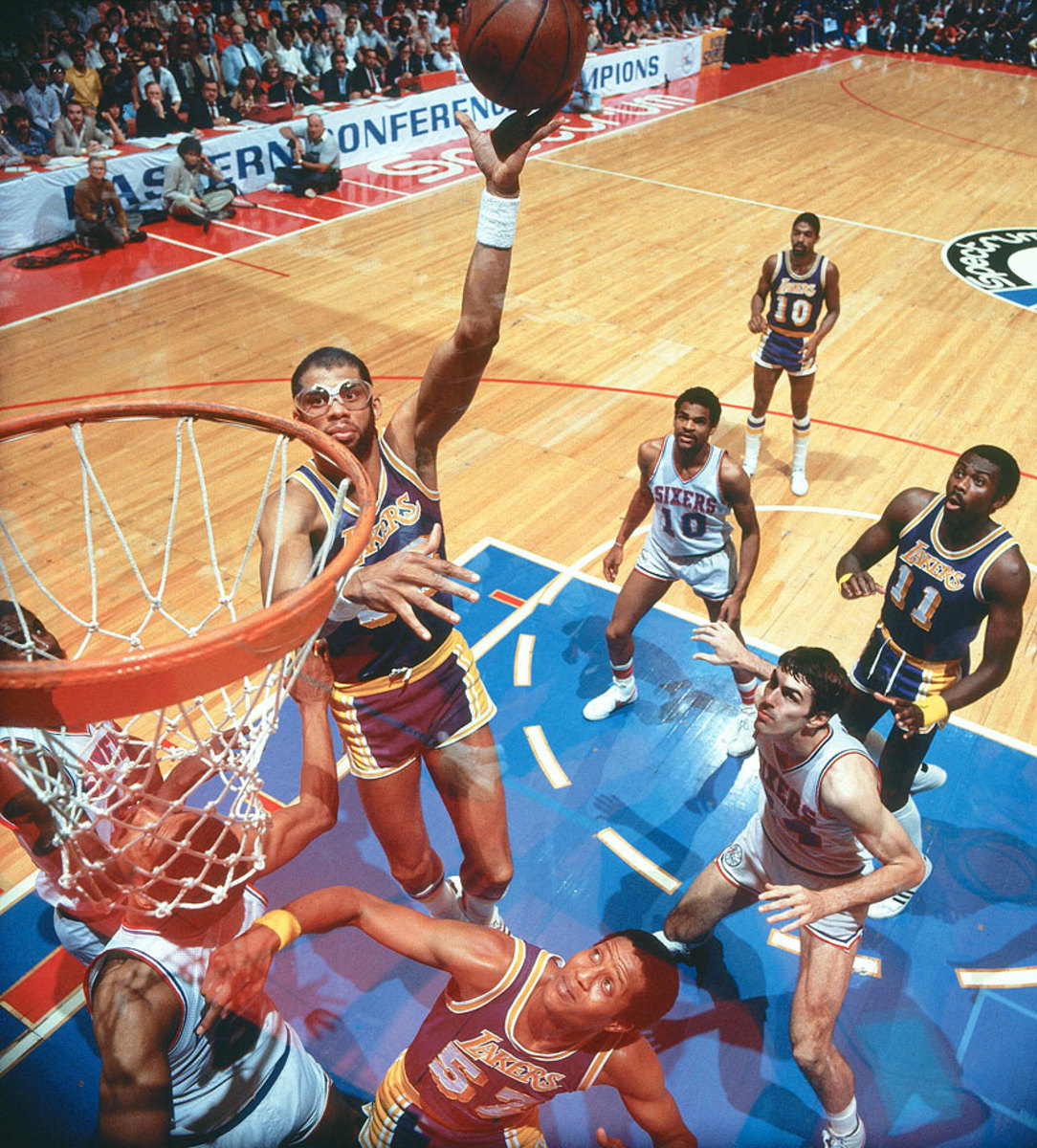
Kareem Abdul-Jabbar and the Lakers squared off against Julius Erving and the Sixers in a rematch of the 1980 finals. The Lakers once again prevailed in six games.
1982
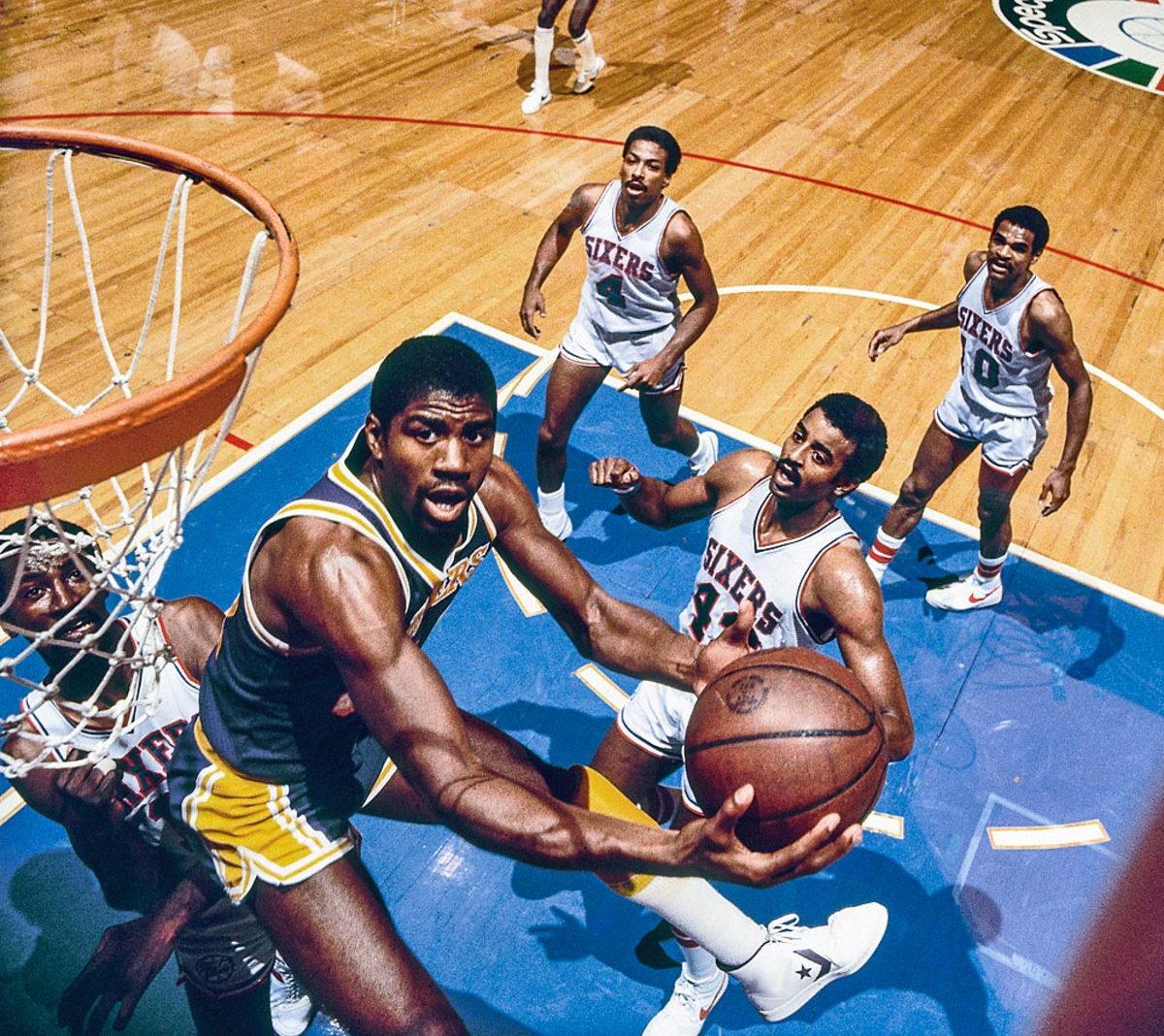
Magic Johnson attacks the hoop against the Sixers. Johnson fell just short of averaging a triple-double in the six-game series, with 16.2 points, 10.8 rebounds and 8 assists per game and winning MVP honors.
1981
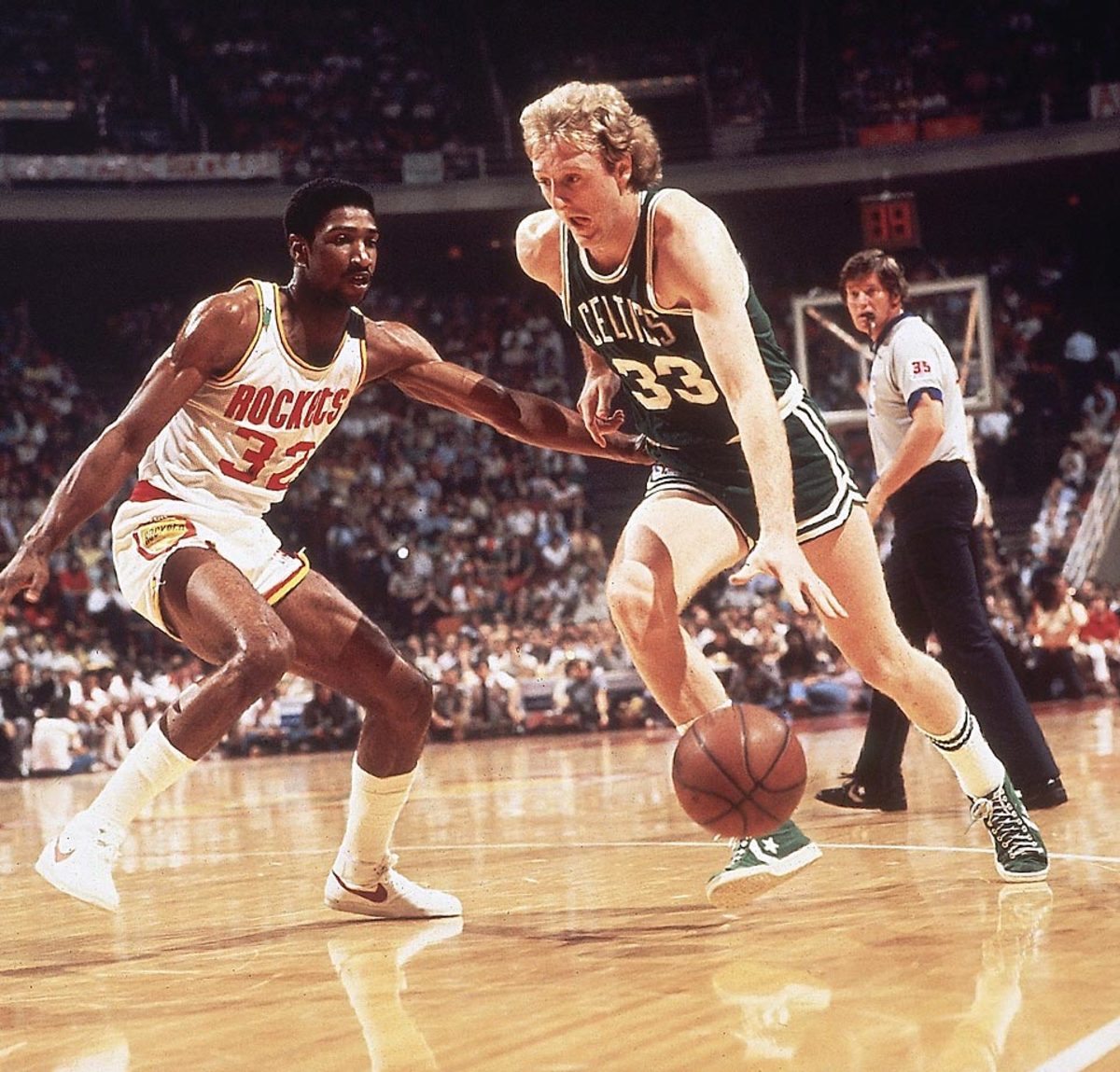
In 1981 it was Larry Bird's Celtics establishing themselves against the Rockets and dominant center Moses Malone.
1981
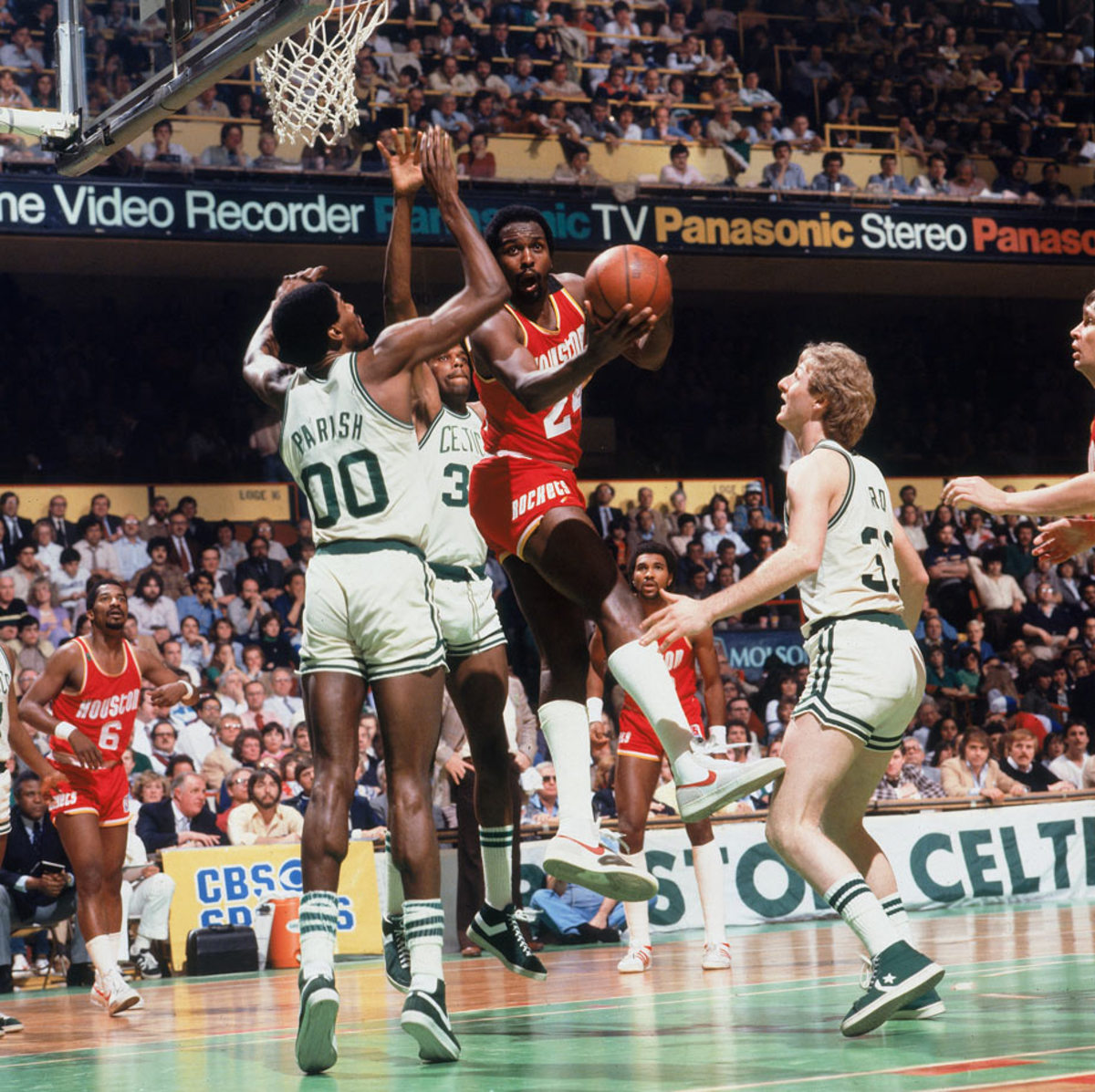
Moses Malone averaged 22.2 points and 16.3 rebounds for the series, which the Celtics won.
1981
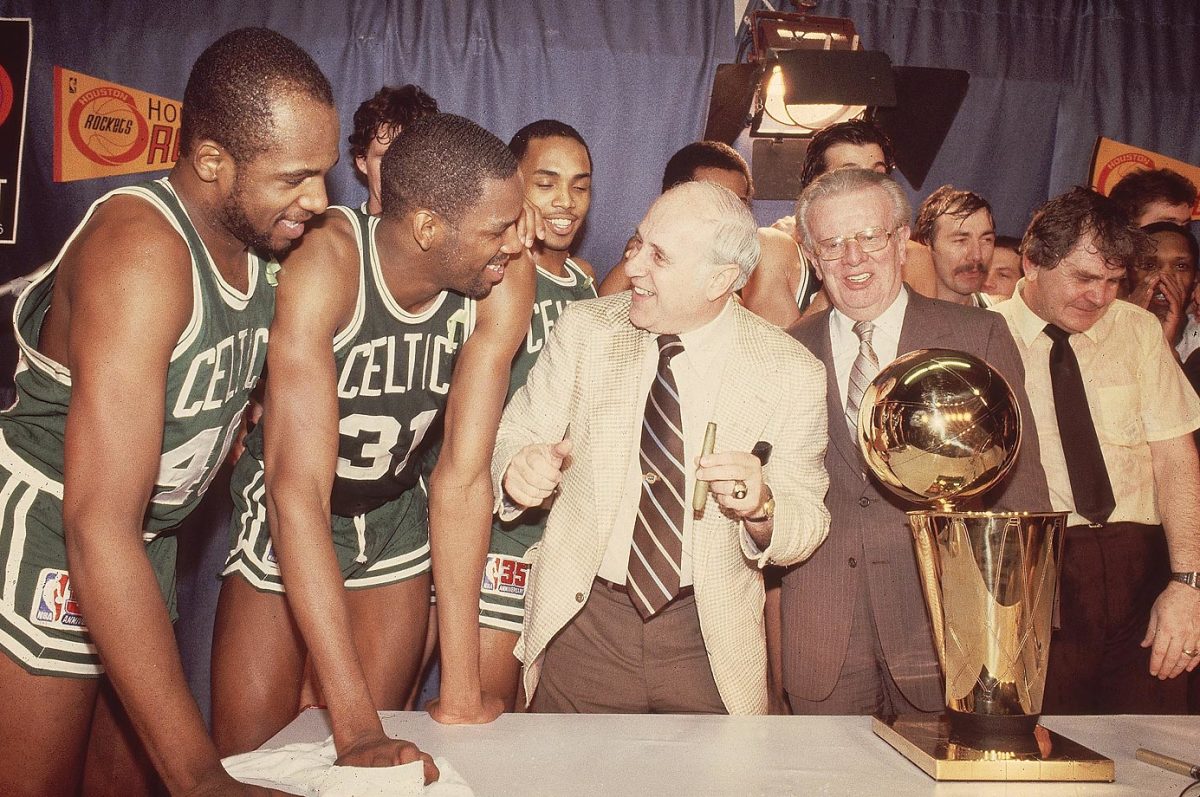
Boston Celtics owner Red Auerbach celebrates with the trophy and his team after beating the Houston Rockets in six games behind Finals MVP Cedric Maxwell and star Larry Bird.
1980
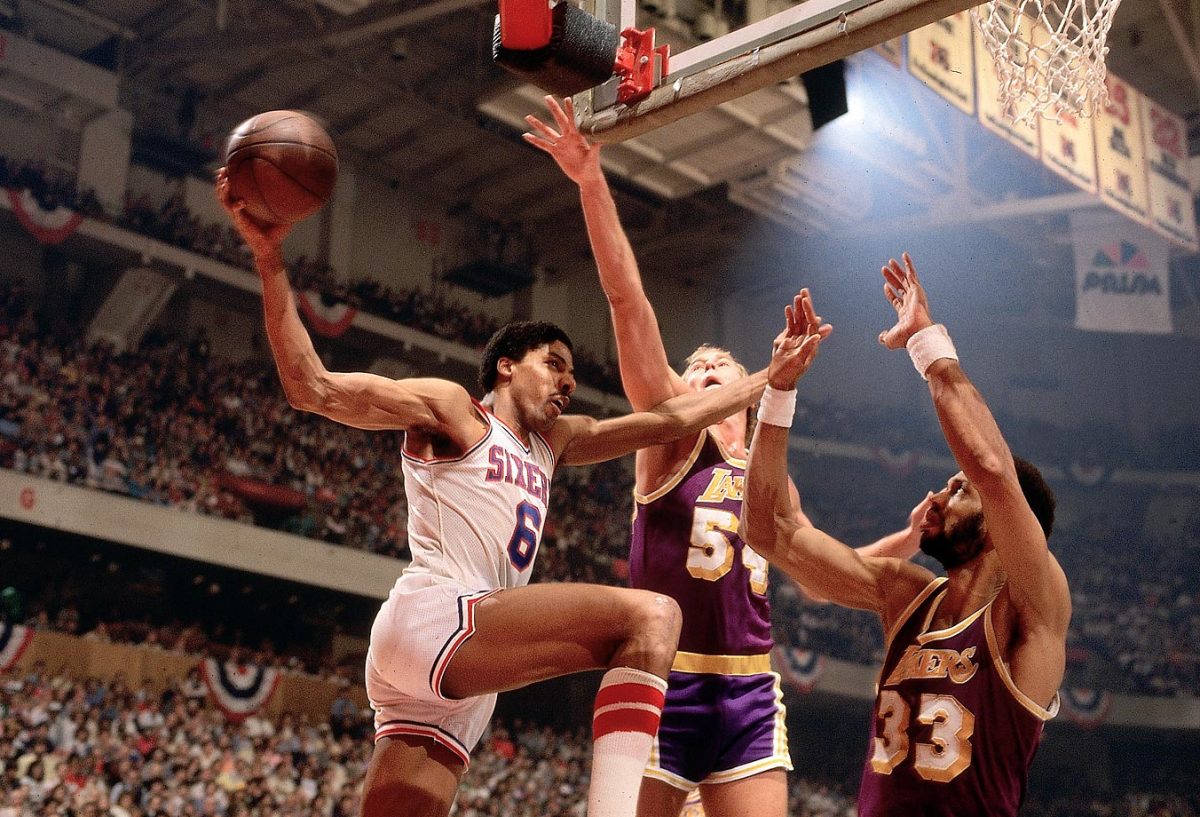
Julius Erving soars and stretches for what would become an iconic reverse layup in Game 4. The Sixers tied the series with a 105-102 win at home.
1980
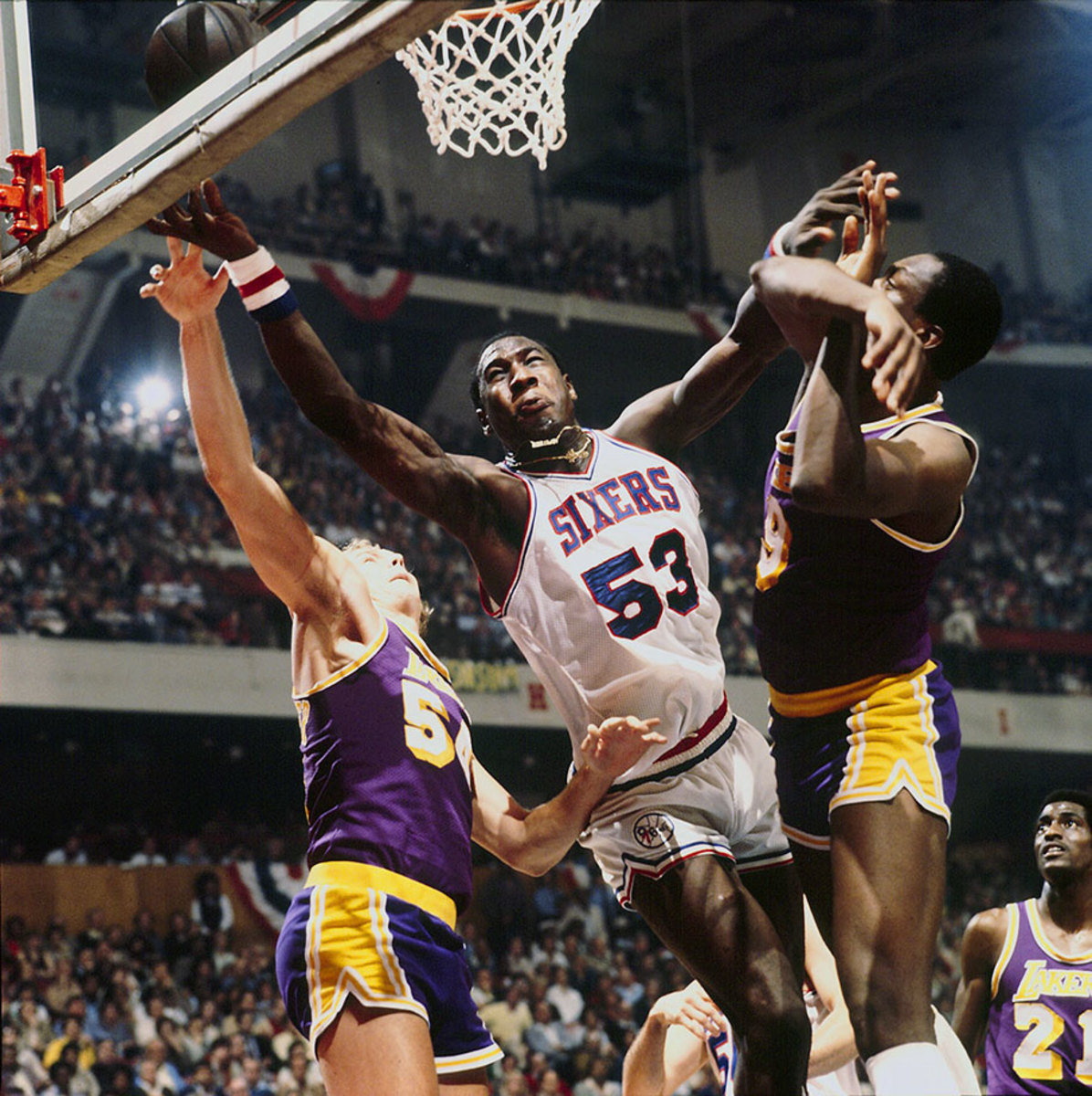
Philadelphia's Darryl Dawkins battles Los Angeles Lakers defenders on his way to the rim. "Chocolate Thunder" led the Sixers in scoring in their only two wins of the series.
1980
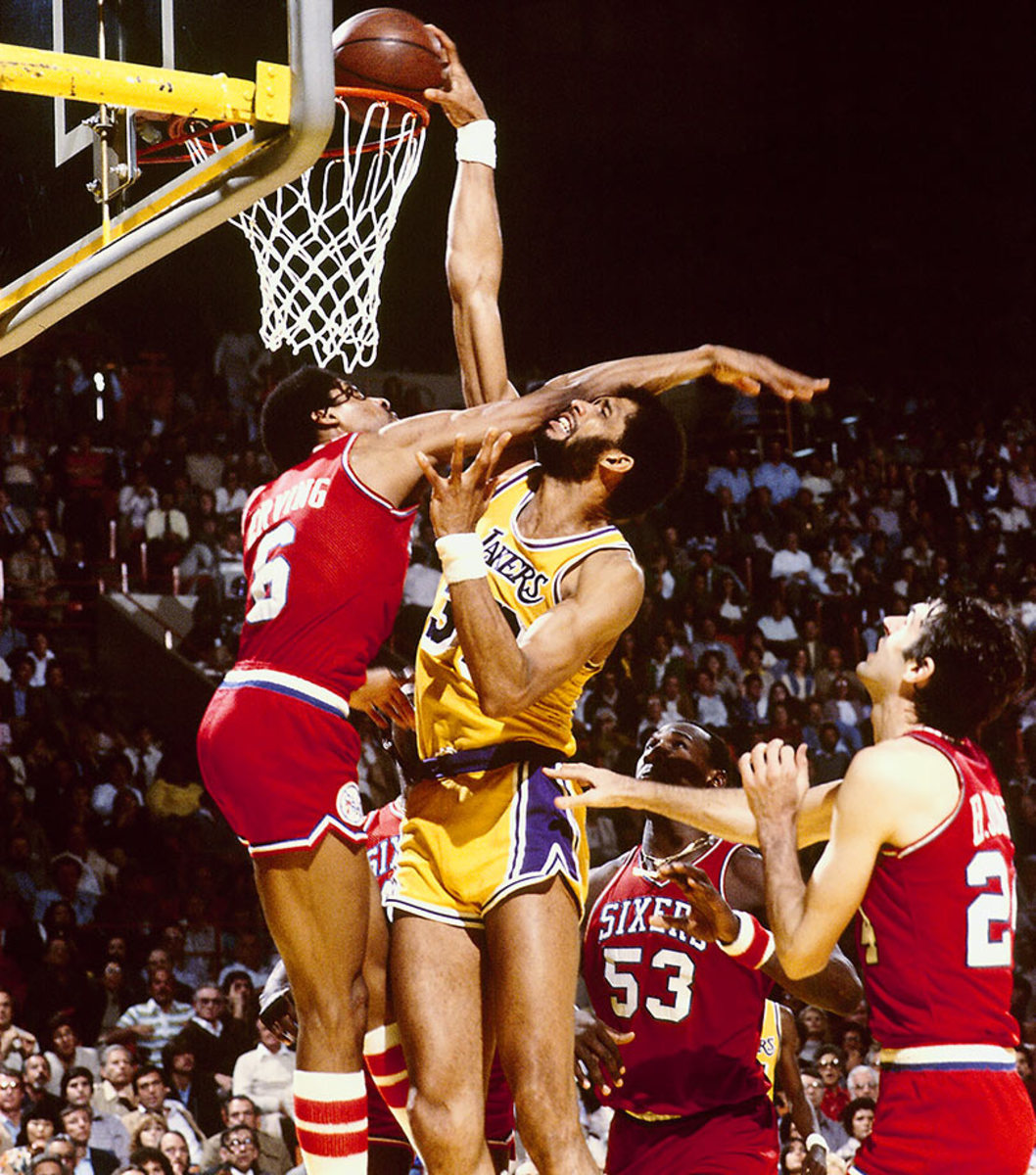
Kareem Abdul-Jabbar dunks against Julius Erving in Game 5 between the Lakers and Sixers.
1980
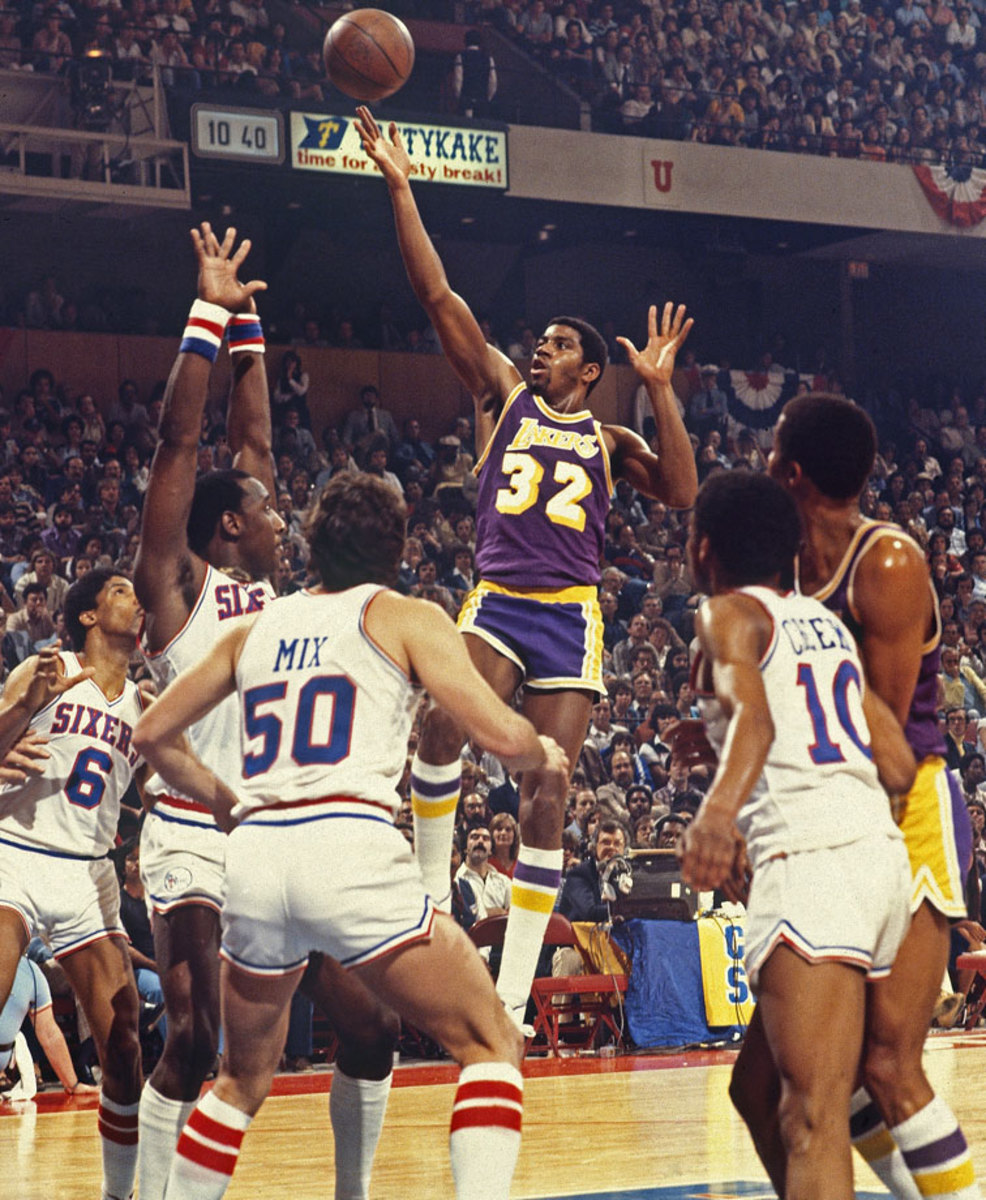
Magic Johnson's 42 points, 15 rebounds and 7 assists in Game 6 sealed the series for the Lakers, sparking a 123-107 win. The versatile Johnson memorably started the game at center for the injured Kareem Abdul-Jabbar in one of the greatest games in playoff history.
1979
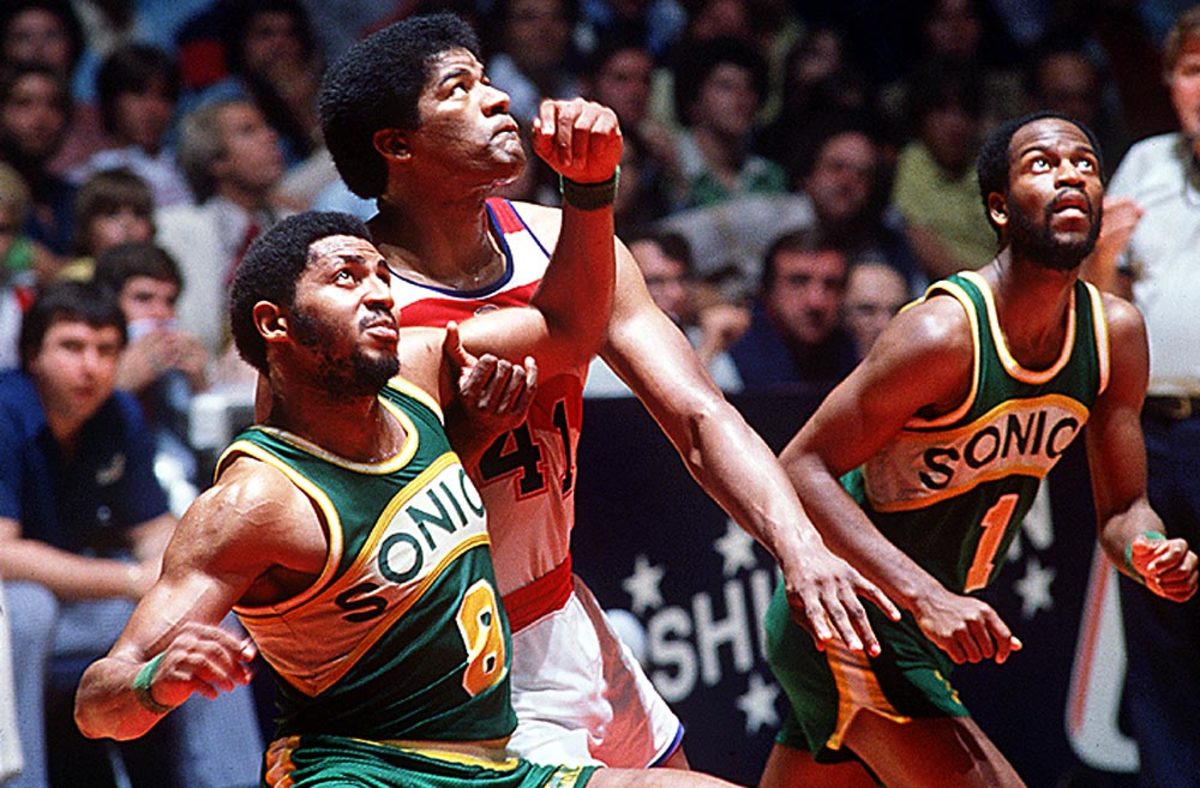
Lonnie Shelton of the Sonics battles Wes Unseld of the Bullets during the 1979 Finals. Unseld led Washington to a title over Seattle the previous year, but the Sonics stuck this one out behind their high-scoring backcourt of Gus Williams and Dennis Johnson.
1979
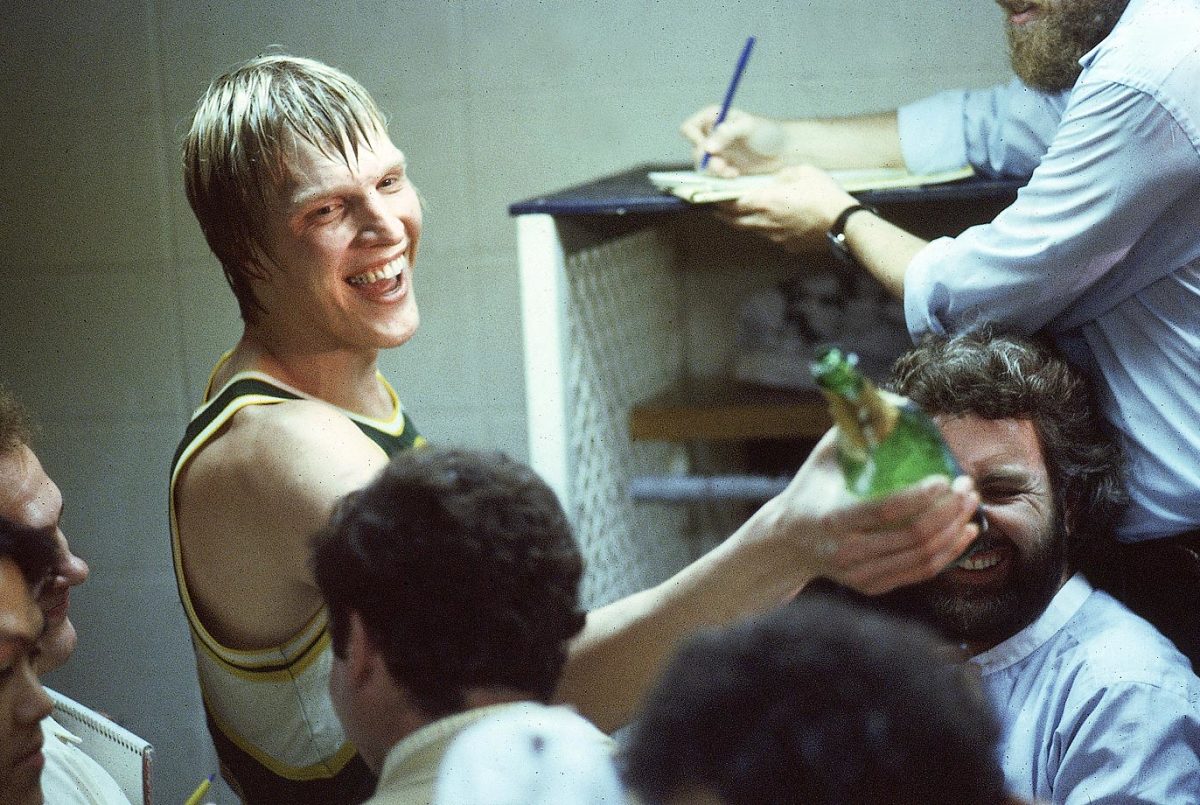
Jack Sikma of the Supersonics celebrates after the series-winning Game 5 against the Washington Bullets. It would be Seattle's lone championship in franchise history.
1978
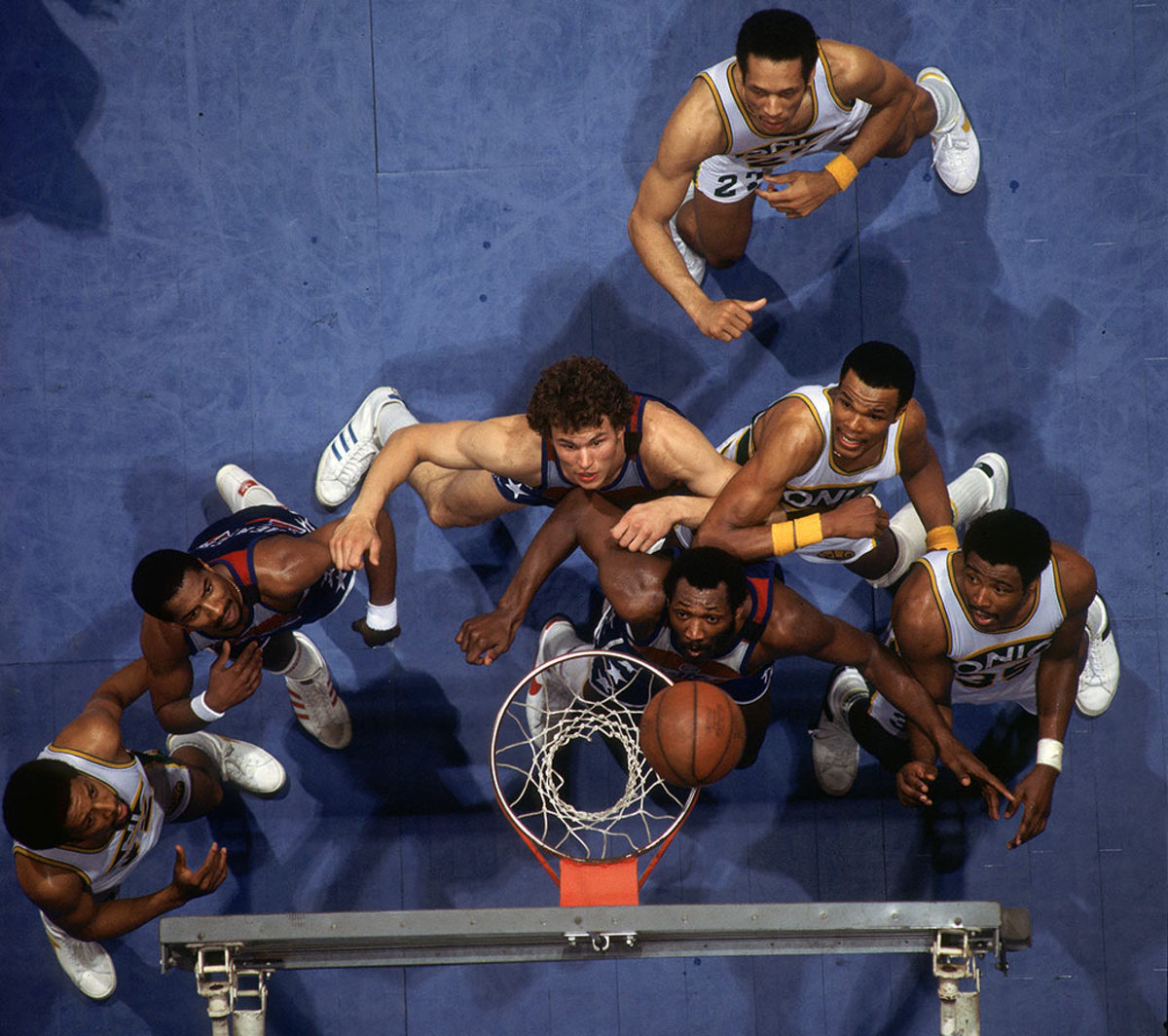
Elvin Hayes of the Washington Bullets watches the ball on the rim. Averaging 20.7 points and 11.9 rebounds, Hayes led Washington to its only title in franchise history.
1977
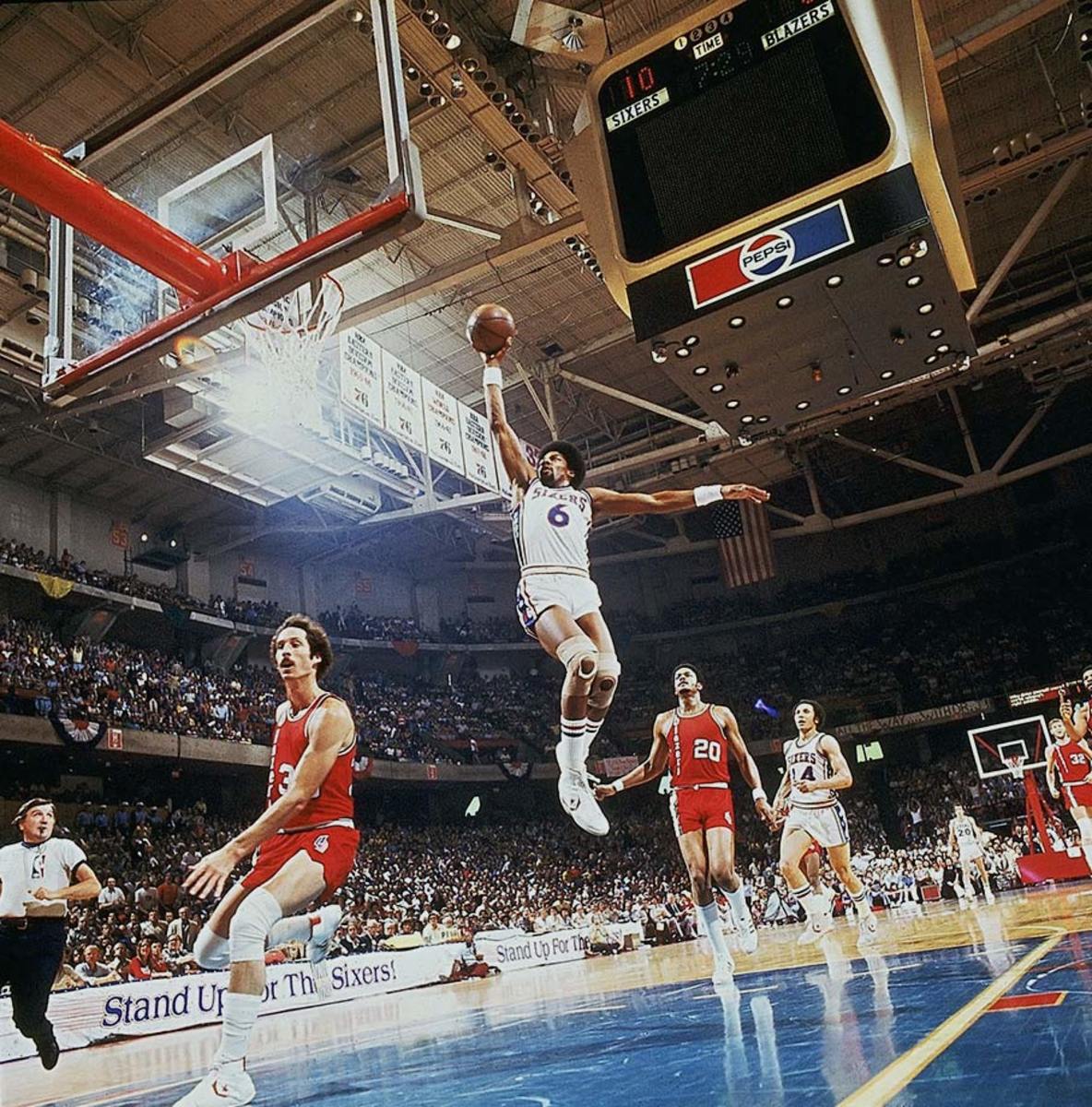
Julius Erving soars to the basket for a dunk in Game 2 between the 76ers and Trail Blazers.
1977
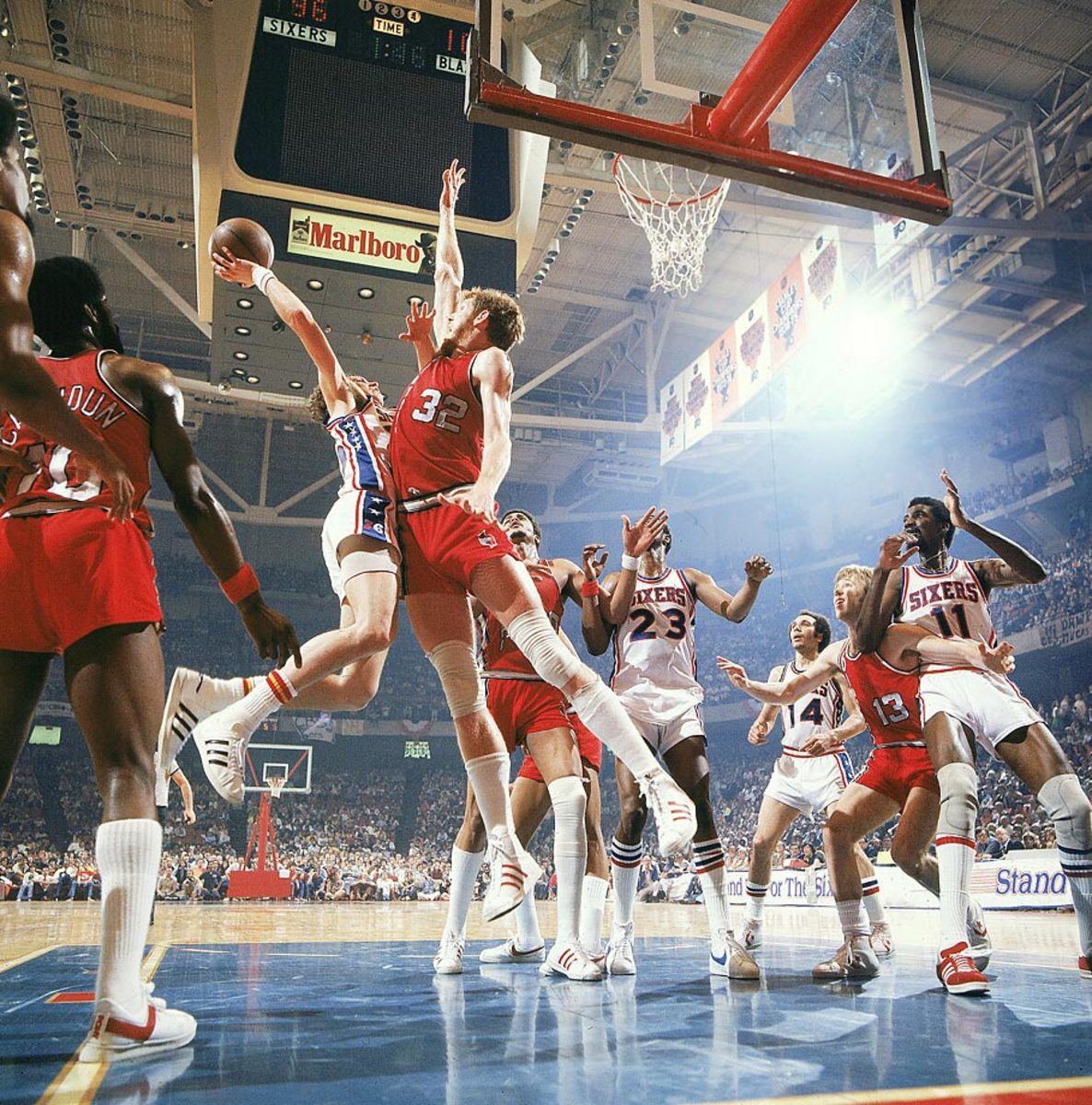
Bill Walton of the Trail Blazers contests a shot by Doug Collins of the 76ers. Walton galvanized the Blazers, who won the series in six games behind his Finals MVP-winning 18.5 points and 19.0 rebounds per game.
1976
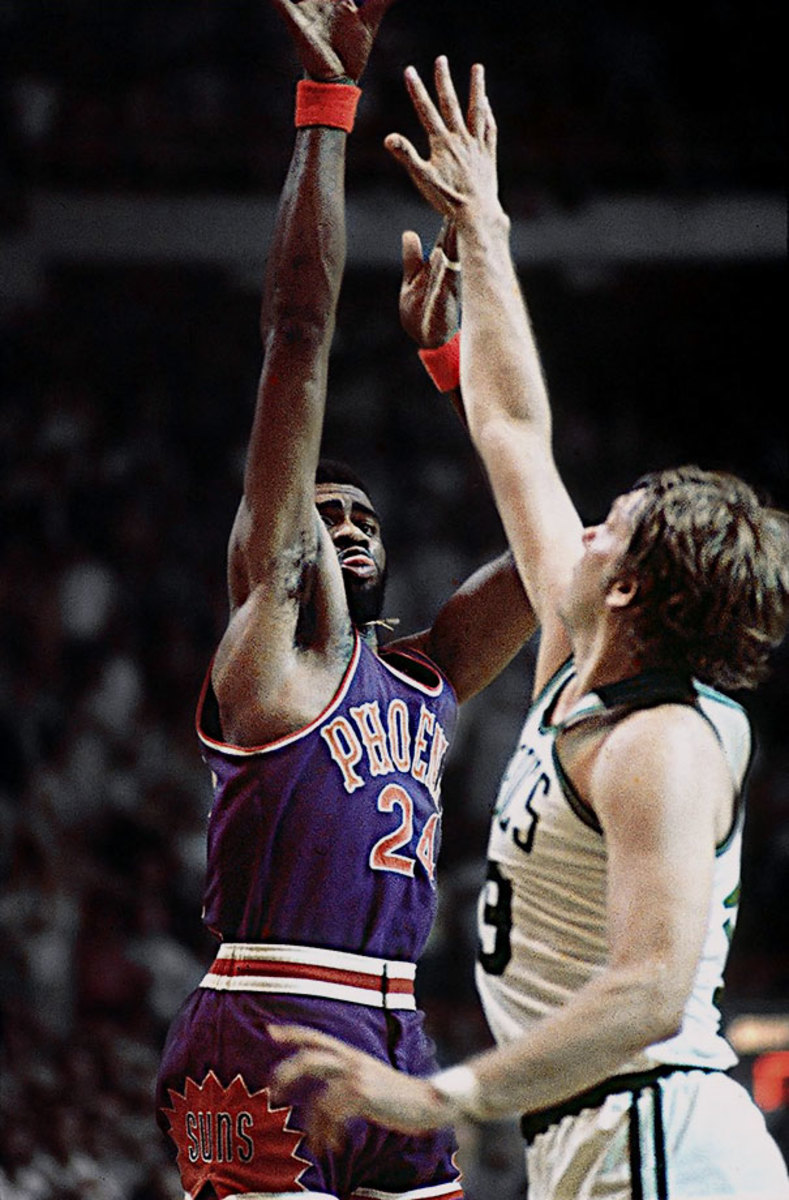
Gar Heard of the Suns releases the game-tying shot at the double-overtime buzzer against the Boston Celtics in Game 5. Boston prevailed 128-126 in the third OT, and took the series in six.
1975
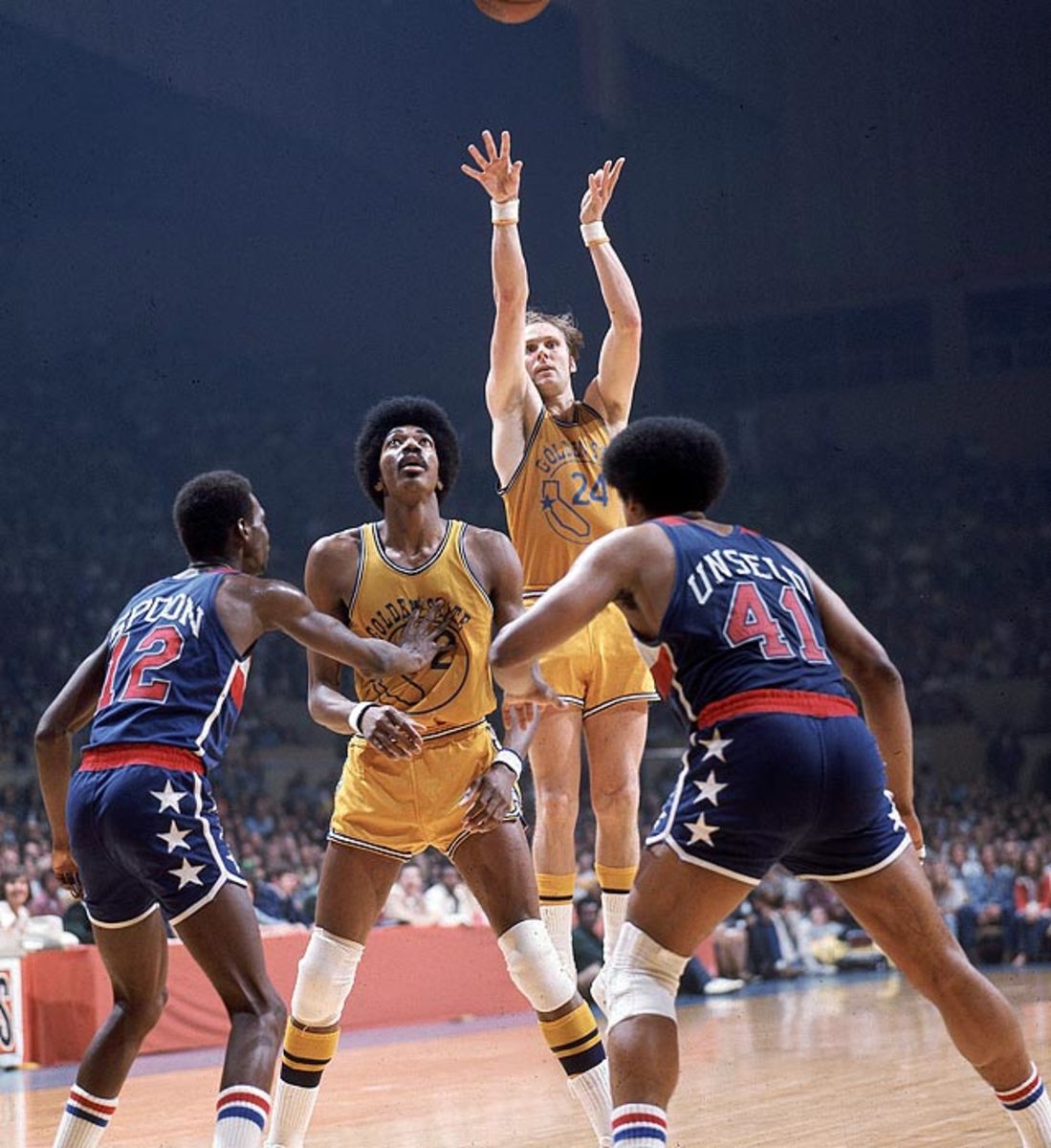
The underdog Warriors were bolstered by a red-hot Rick Barry, who led the team in a 4-0 sweep of the Bullets. Barry averaged 29.5 points, 5 assists, 4 rebounds and 3.5 steals in the series.
1974
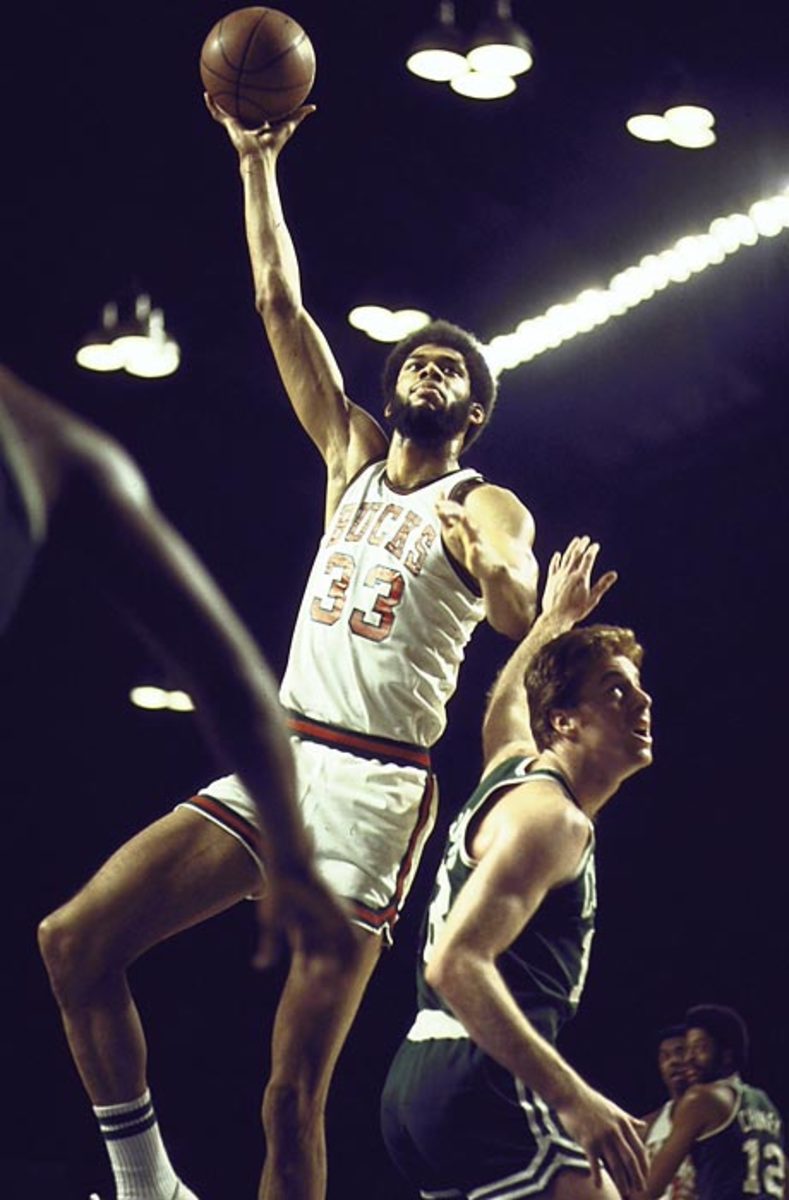
Kareem Abdul-Jabbar paced the Bucks, averaging 32.6 points per game and deploying his signature sky hook to seal Game 6, but the Celtics would pull it out in a seventh game.
1973
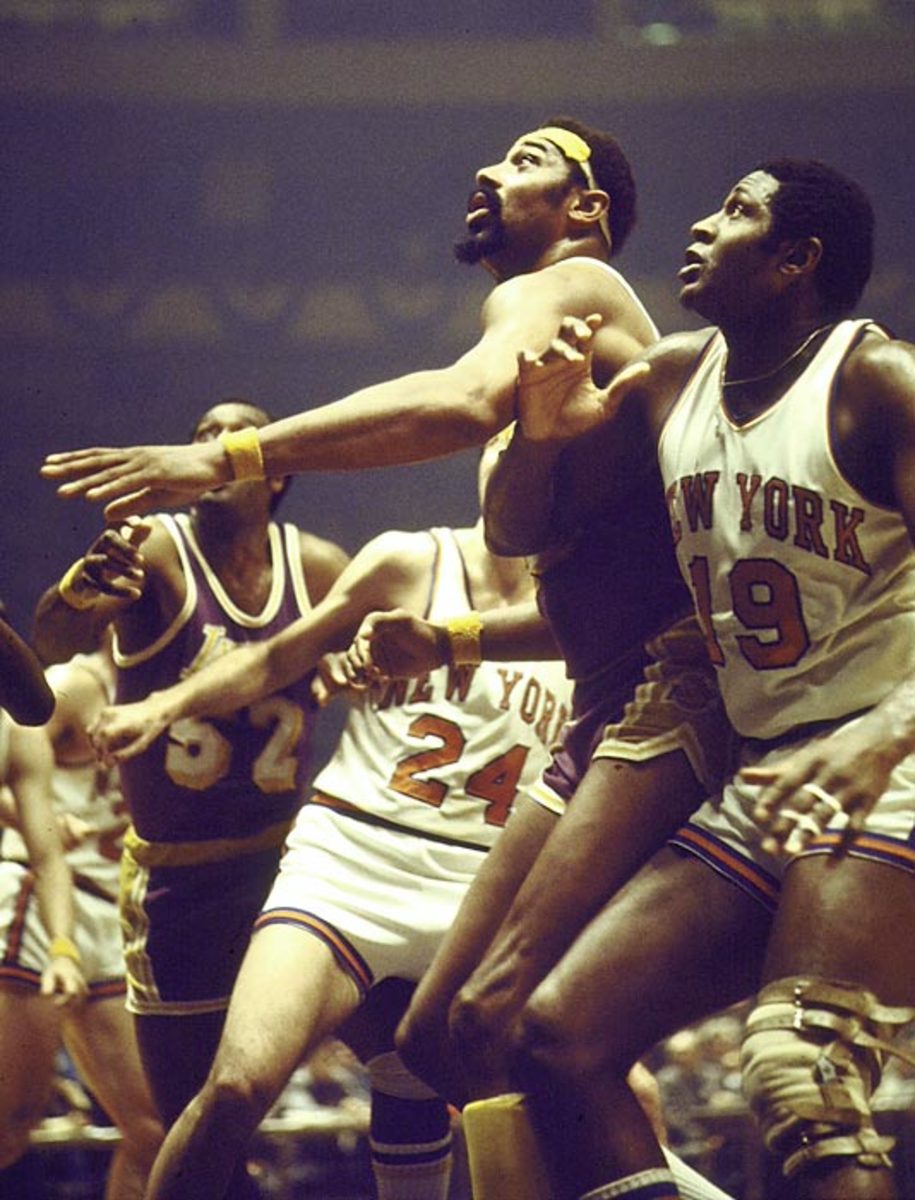
The Lakers and Knicks clashed in a rematch of the previous year, but this time it was New York in five, and Knicks center Willis Reed (19), not L.A.'s Wilt Chamberlain (center), named MVP (16.4 points, 9.6 rebounds).
1973
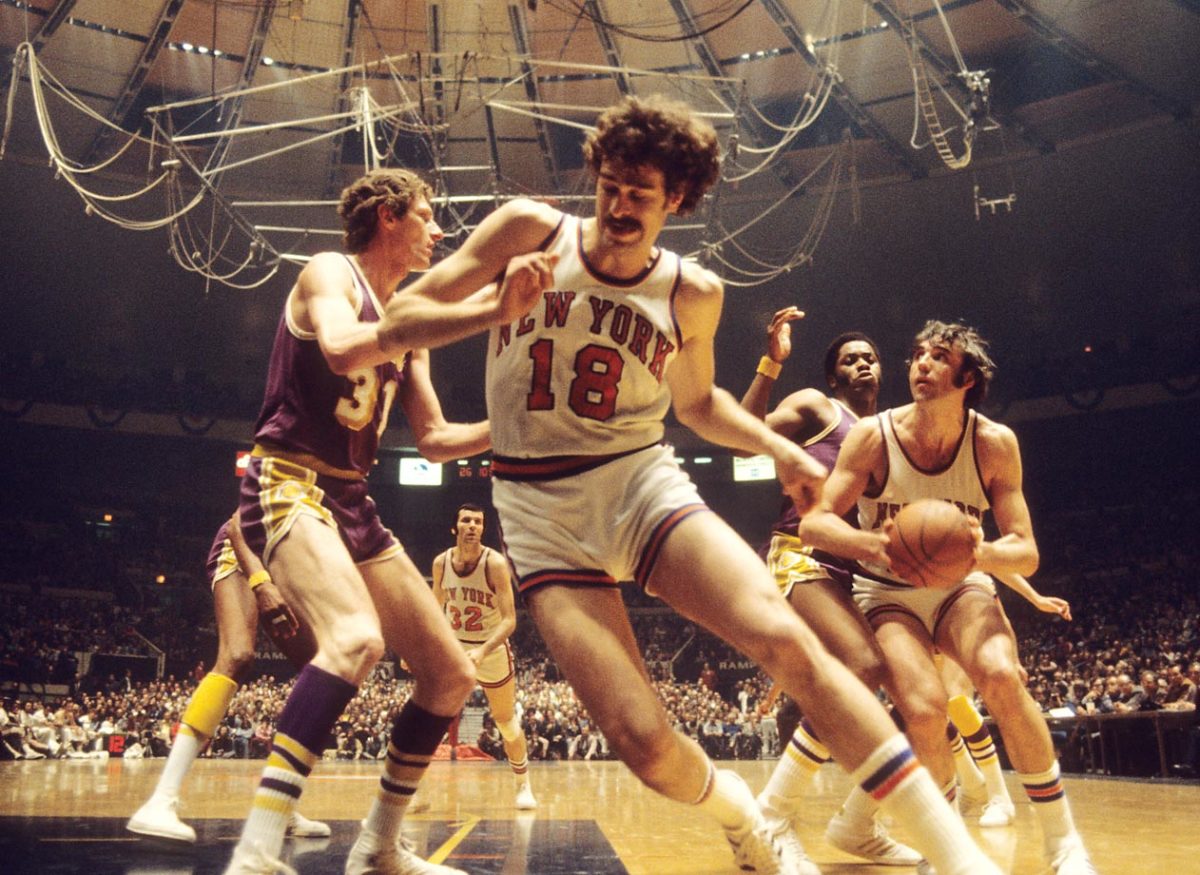
Knicks Dave DeBusschere (with ball) and Phil Jackson (18) in action against Lakers Jim McMillian and Mel Counts (31) during Game 3. The Knicks would win 87-83.
1973
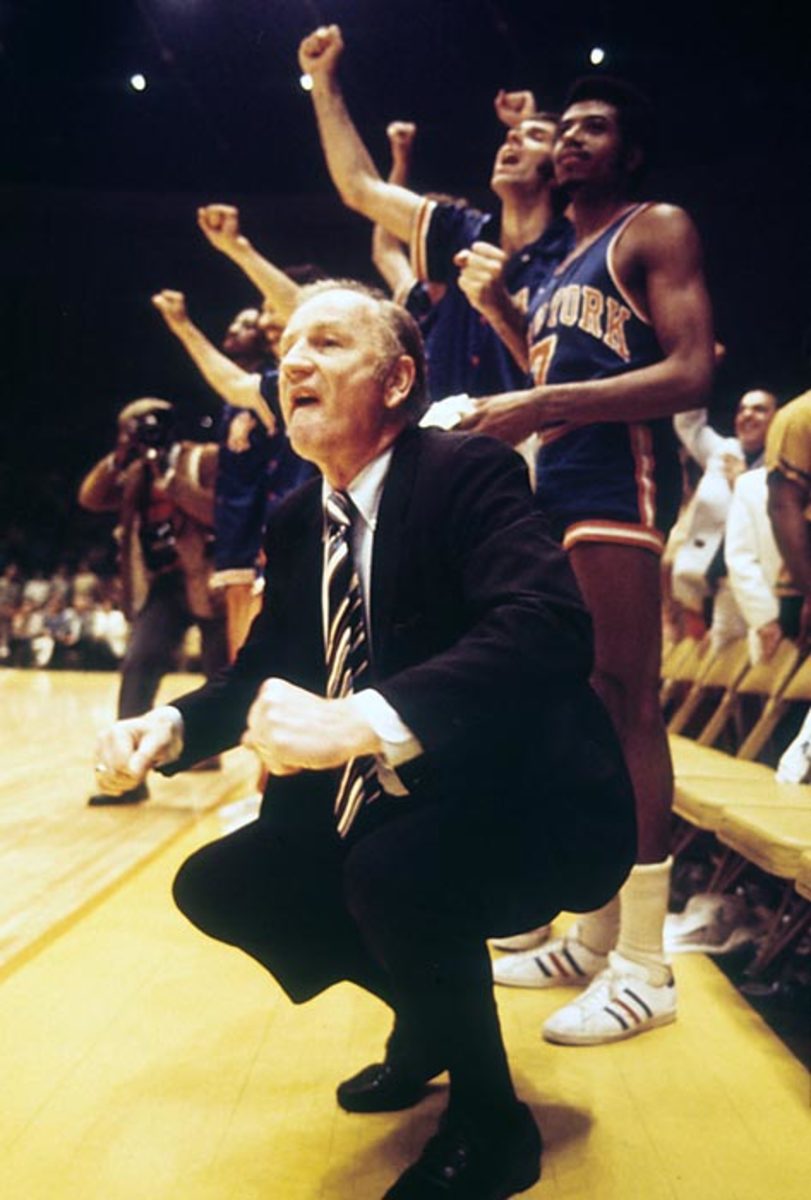
New York Knicks coach Red Holzman celebrates on the sidelines during Game 5. Earl Monroe scored 23 points for the Knicks in the series-clincher.
1972
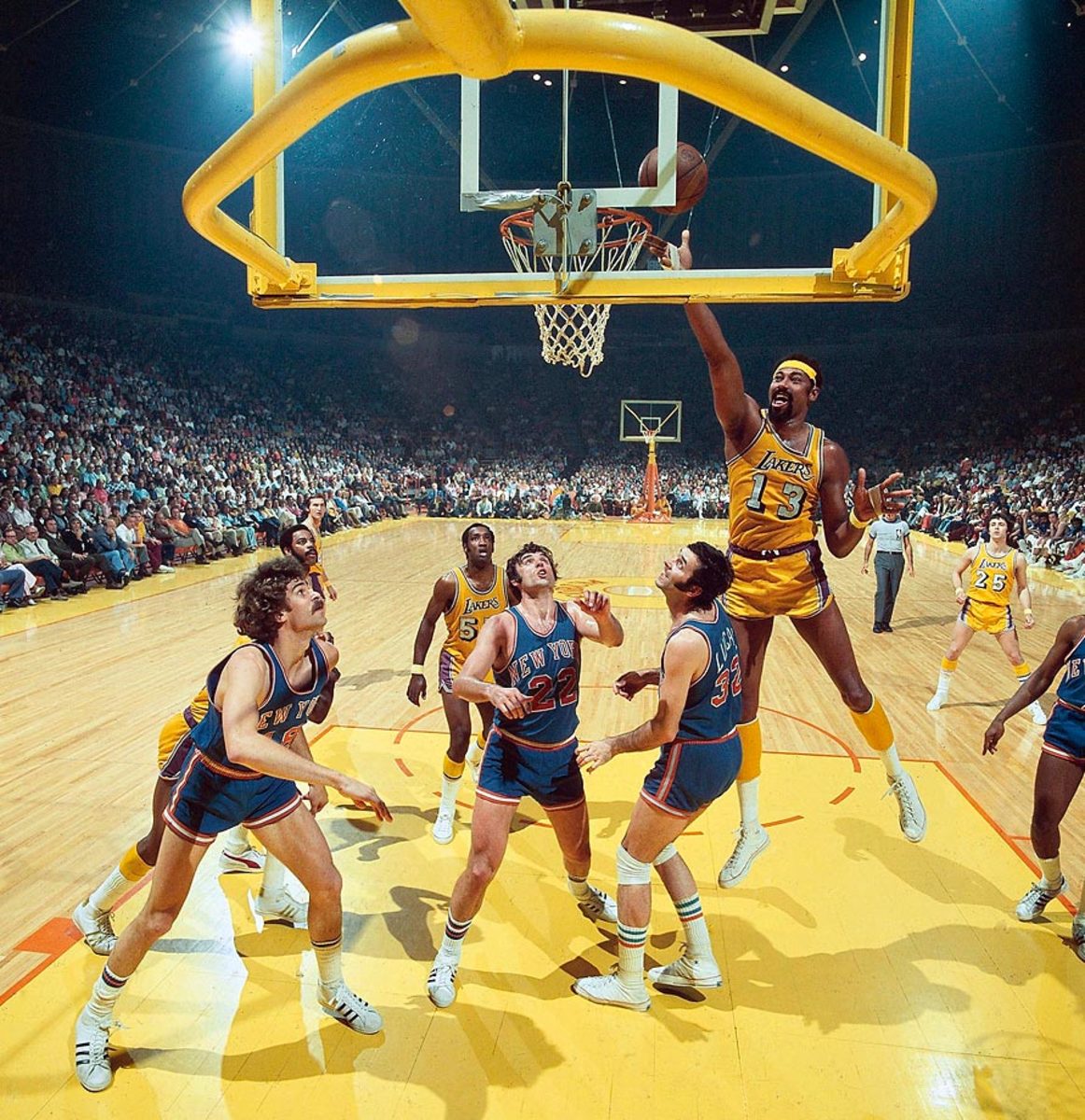
Lakers center Wilt Chamberlain took home Finals MVP honors as the Lakers defeated the Knicks in five games and won their first title since moving to Los Angeles. Chamberlain averaged 19.4 points and 23.2 rebounds on the series.
1971
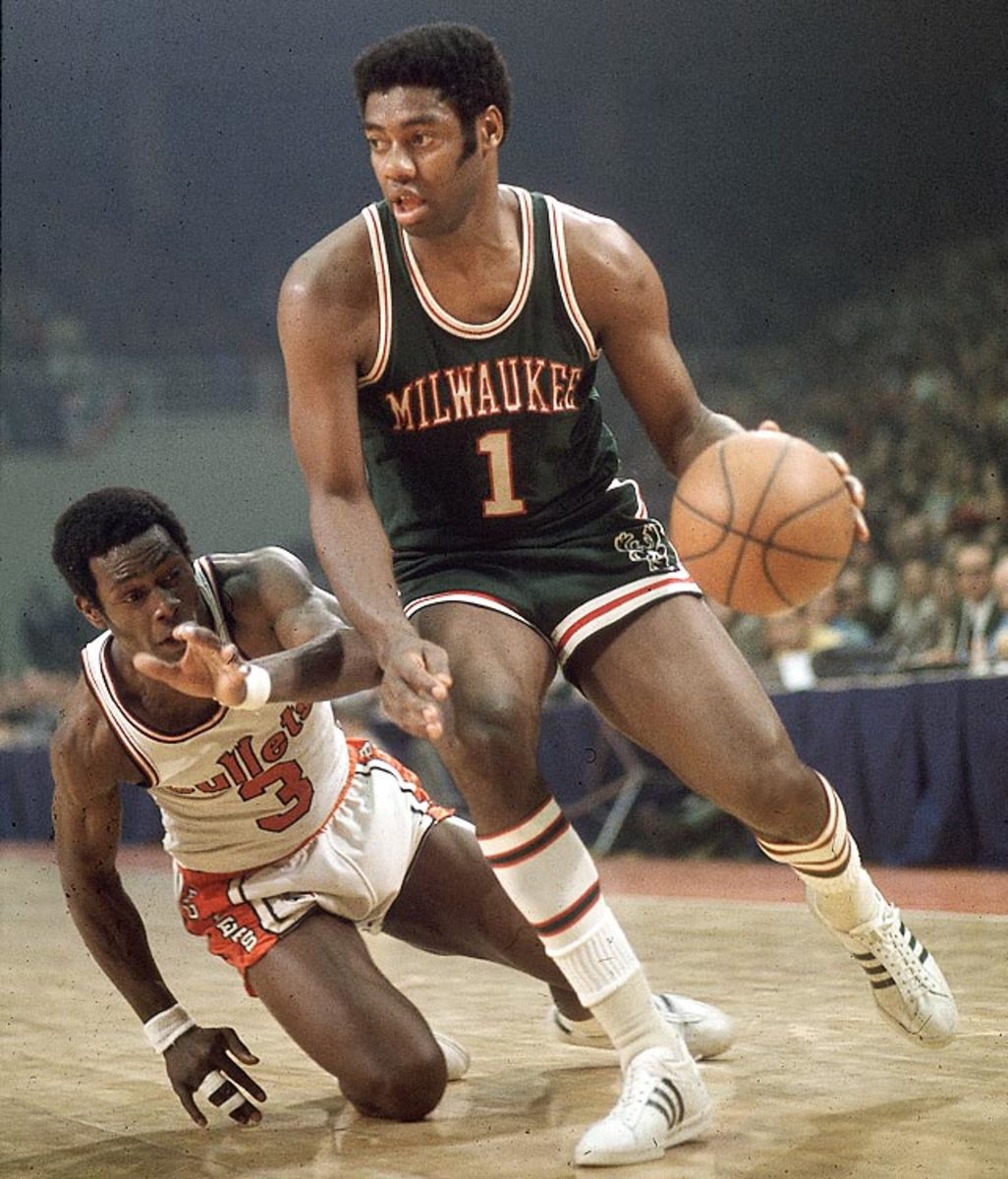
Oscar Robertson led Milwaukee on a 4-0 sweep of Baltimore in his first season joining up with Lew Alcindor and the Bucks. Robertson had 30 points in the series-clincher.
1971
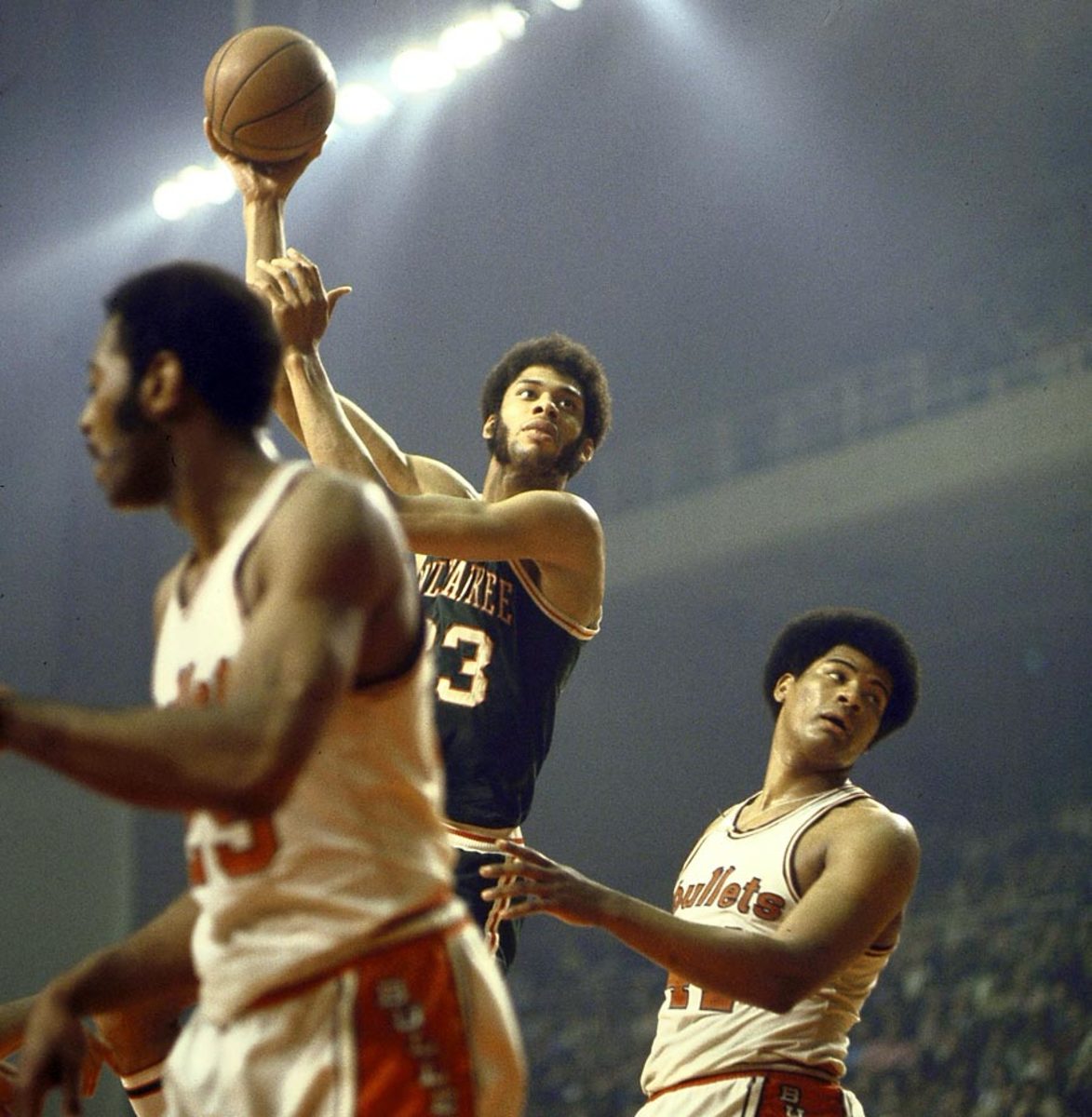
Lew Alcindor lofts one of his signature hook shots. Alcindor won the Finals MVP award, averaging 27 points and 18.5 rebounds in the four-game Milwaukee sweep.
1970
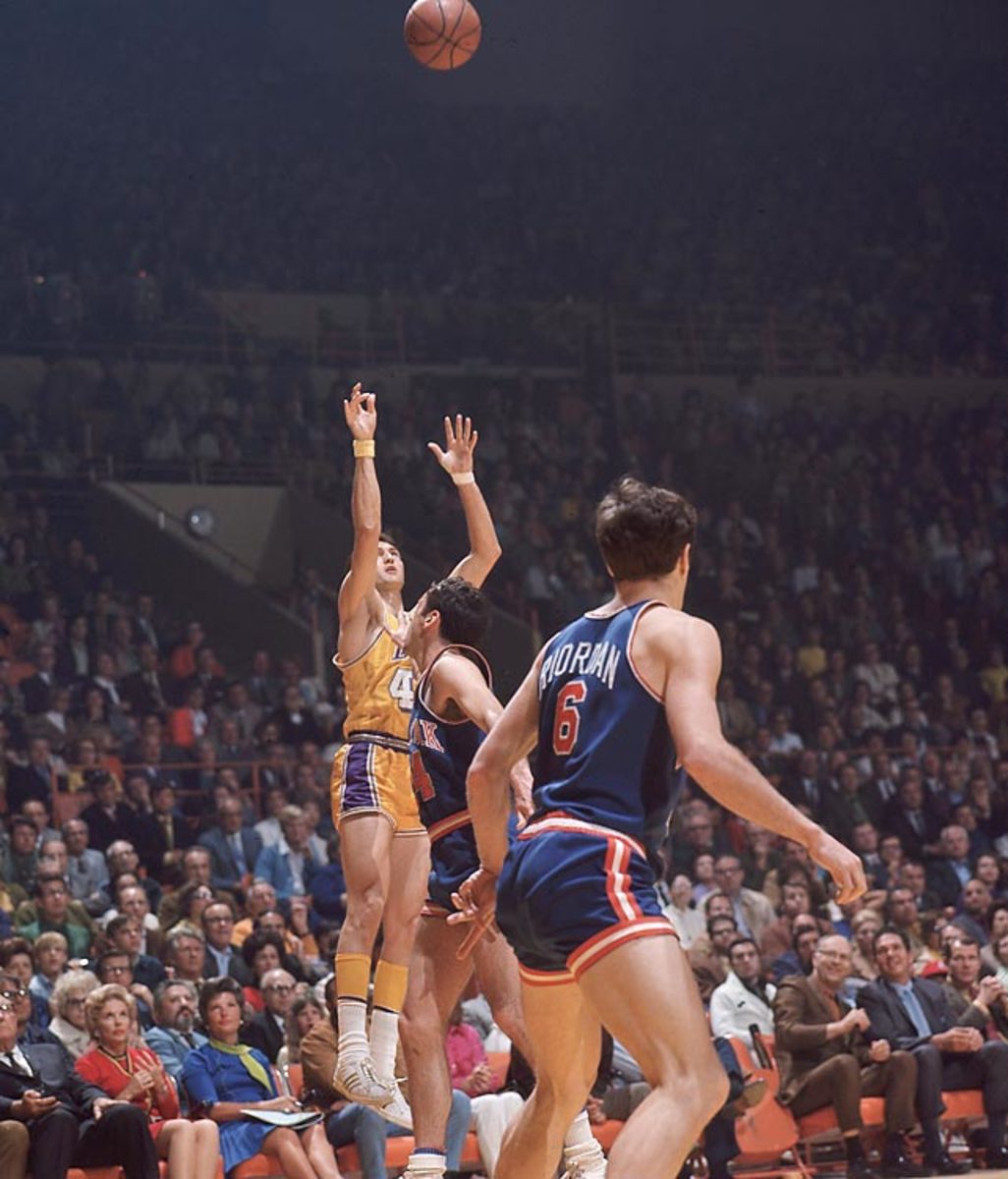
Jerry West of the Lakers launches a shot against the Knicks. West drained a dramatic, desperation 63-footer as time expired in Game 3 to send things to overtime. The Lakers went on to lose that game and dropped the series to New York, 4-3.
1970
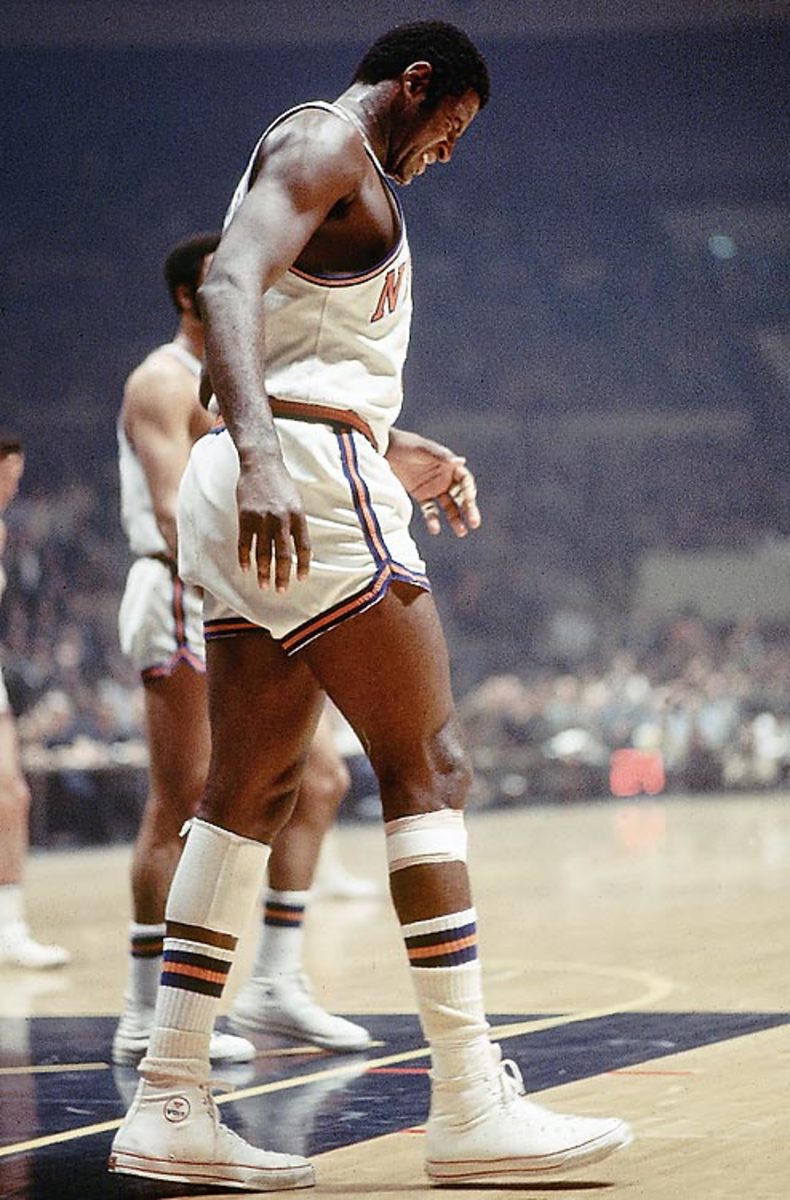
In Game 7 of the 1970 finals, injured Knicks center Willis Reed made a dramatic surprise entrance, scoring the first two baskets of the game in front of a packed Madison Square Garden crowd.
1970
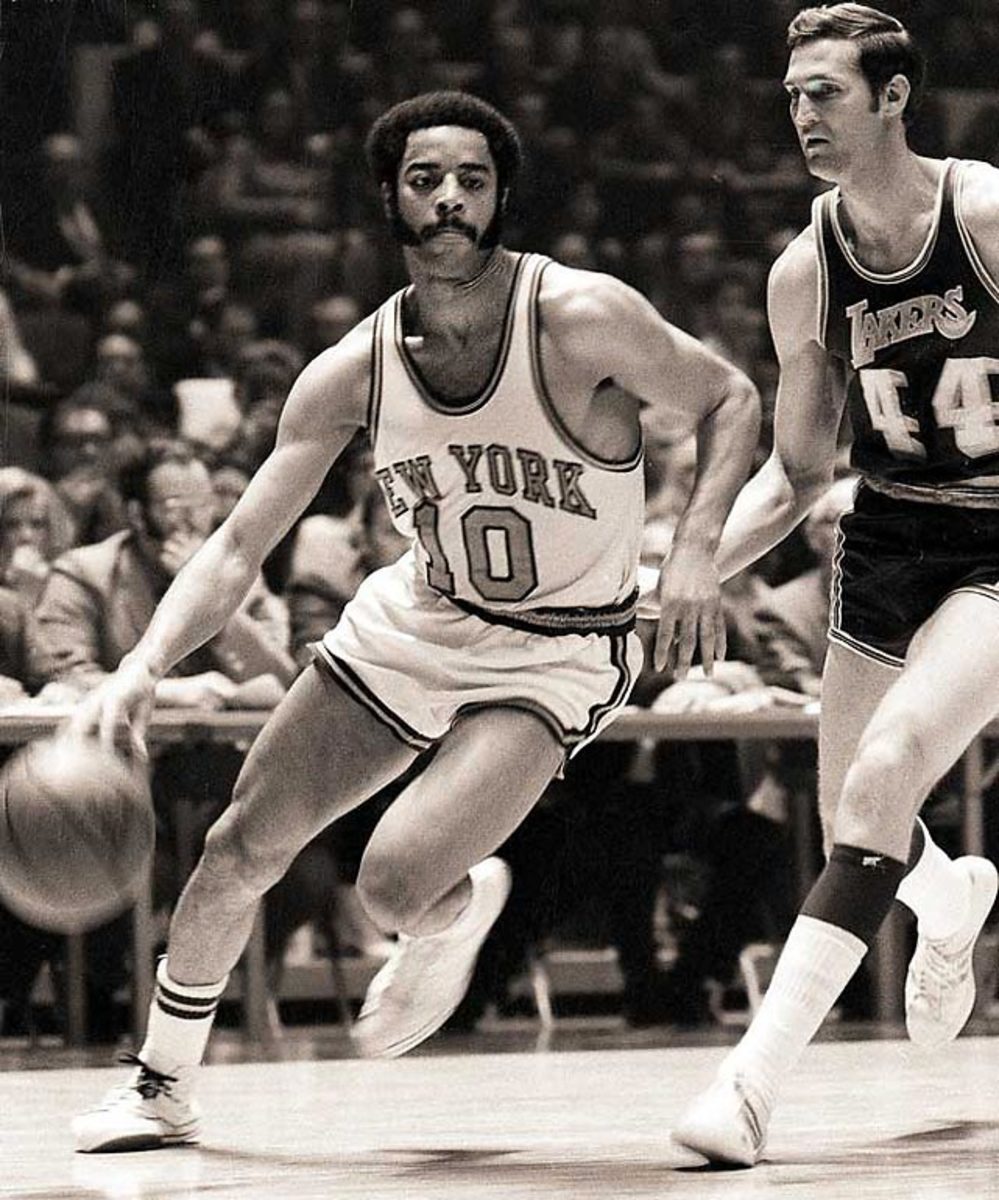
Reed got the crowd excited, but it was Walt "Clyde" Frazier, whose 36 points and 19 assists propelled the Knicks past the Lakers 113-99 to win the championship.
1969
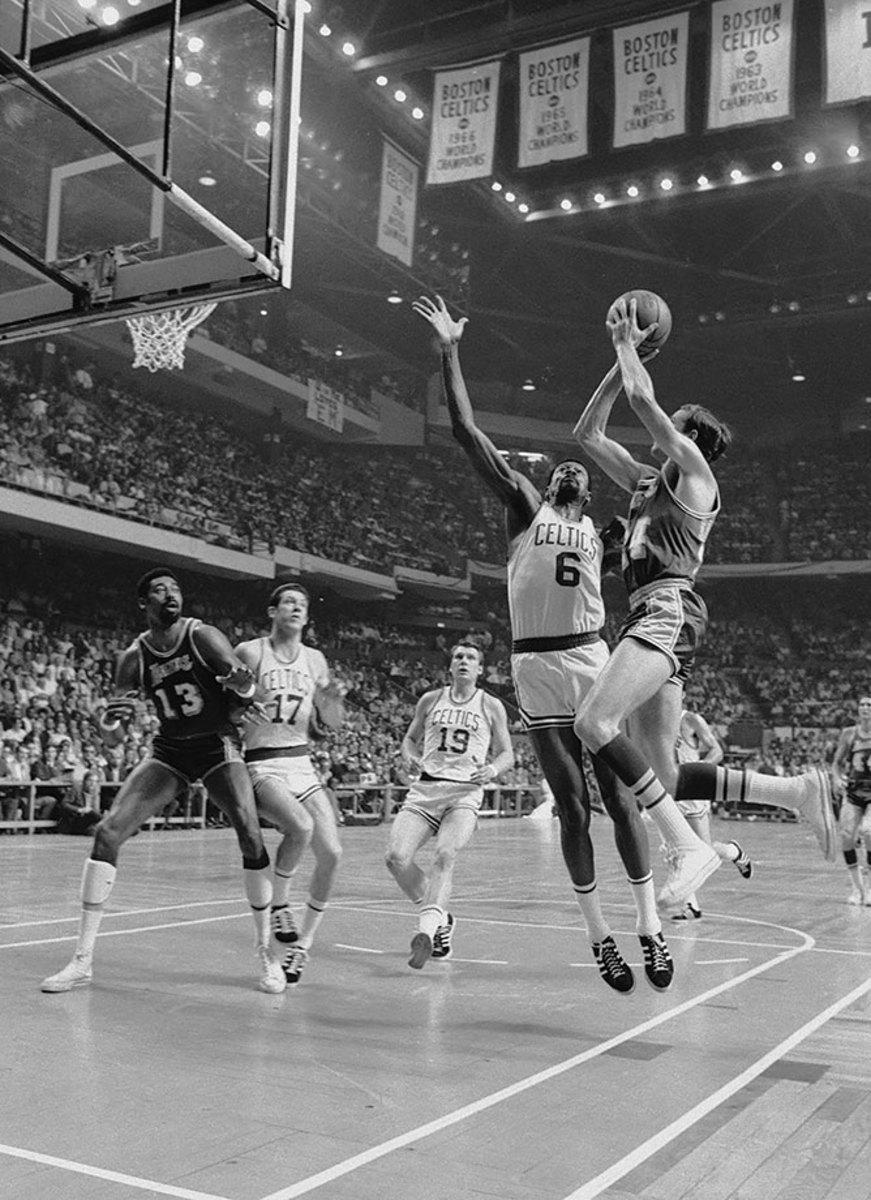
Bill Russell attempts to block Jerry West in Game 3 between the Celtics and Lakers. The Lakers were heavily favored (West averaged 38 points in the series on a squad that also had Wilt Chamberlain) and jumped out to an early 2-0 lead, but the Celtics came back to hand player-coach Bill Russell his final championship.
1969
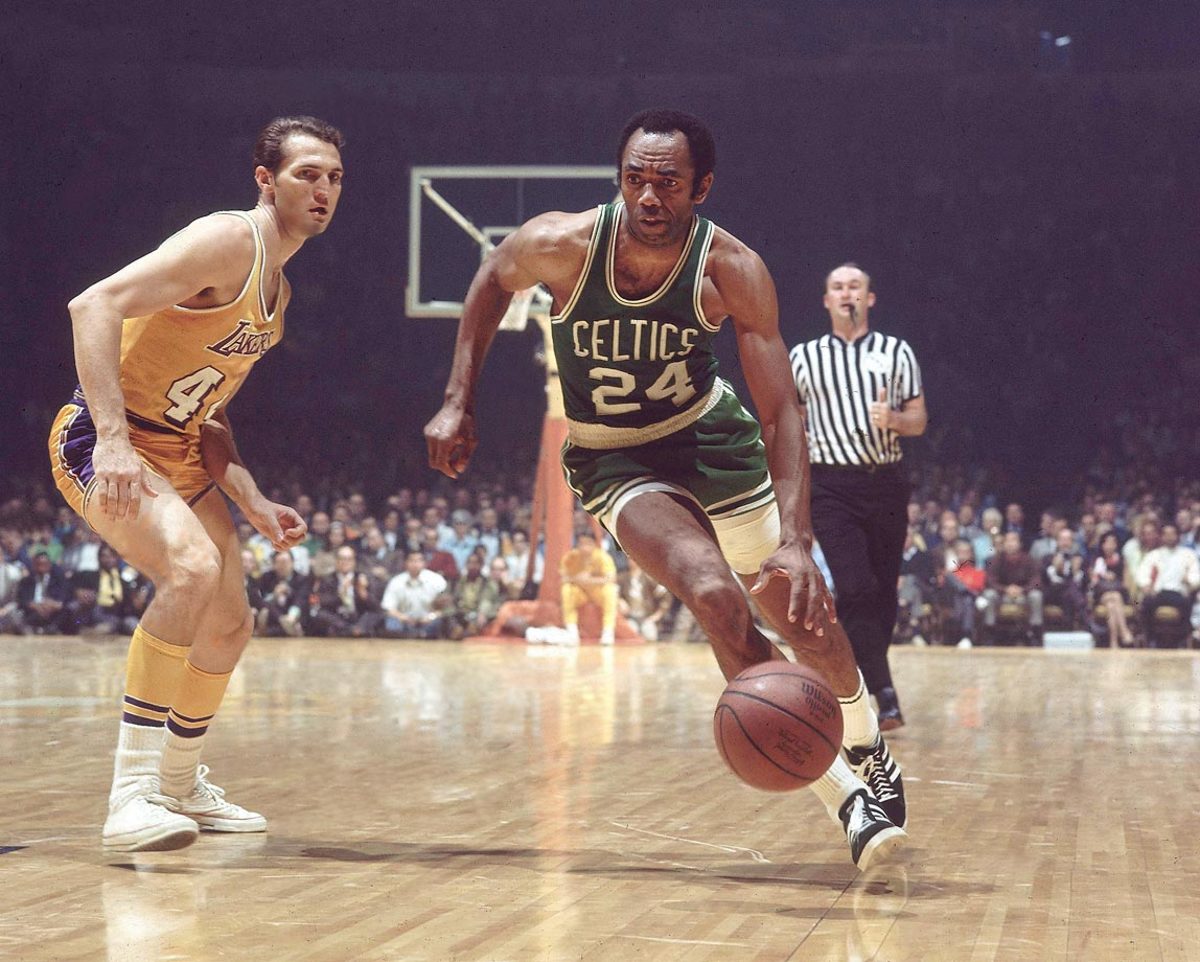
Sam Jones of the Celtics dribbles around Jerry West of the Lakers. Jones would hit the game-winner in Game 4 of the 1969 finals to even the series at two games. Boston would go on to take the title in seven.
1968
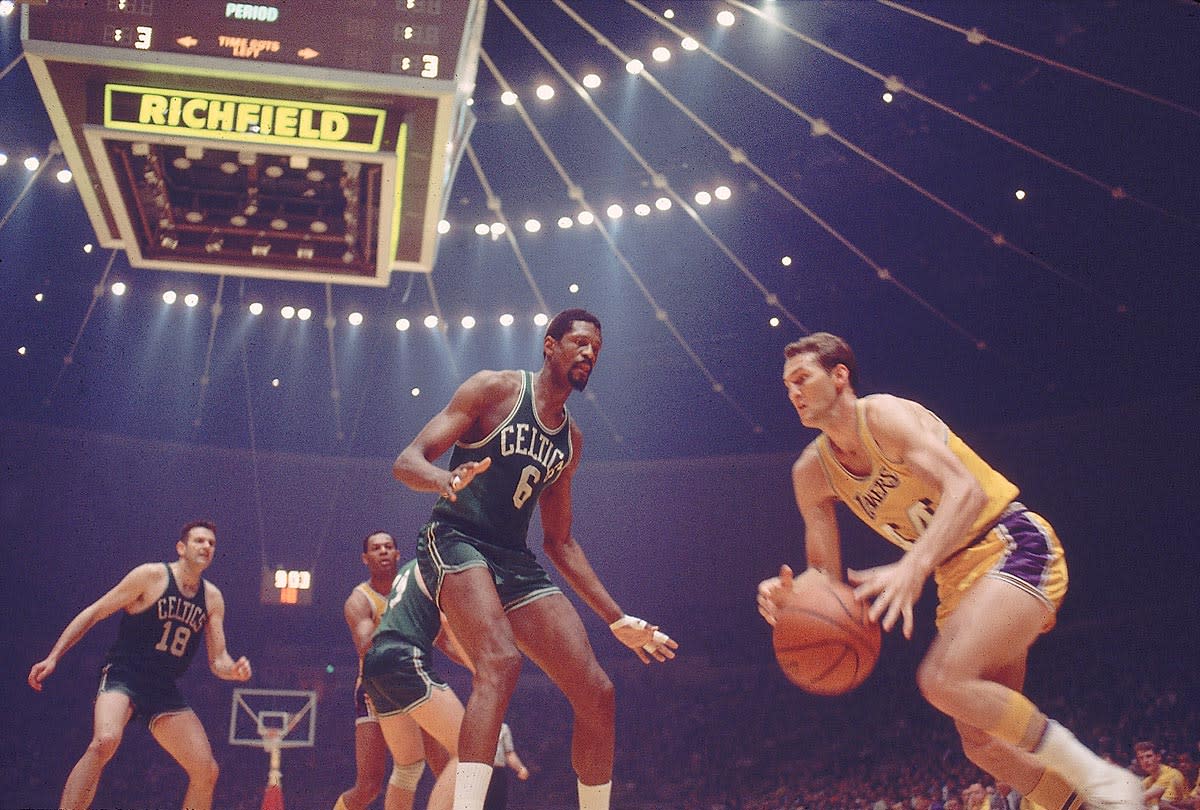
Lakers guard Jerry West drives past Celtics center Bill Russell in Game 6. Boston went on to a 124-109 win at the Forum to clinch the series 4-2.
1966
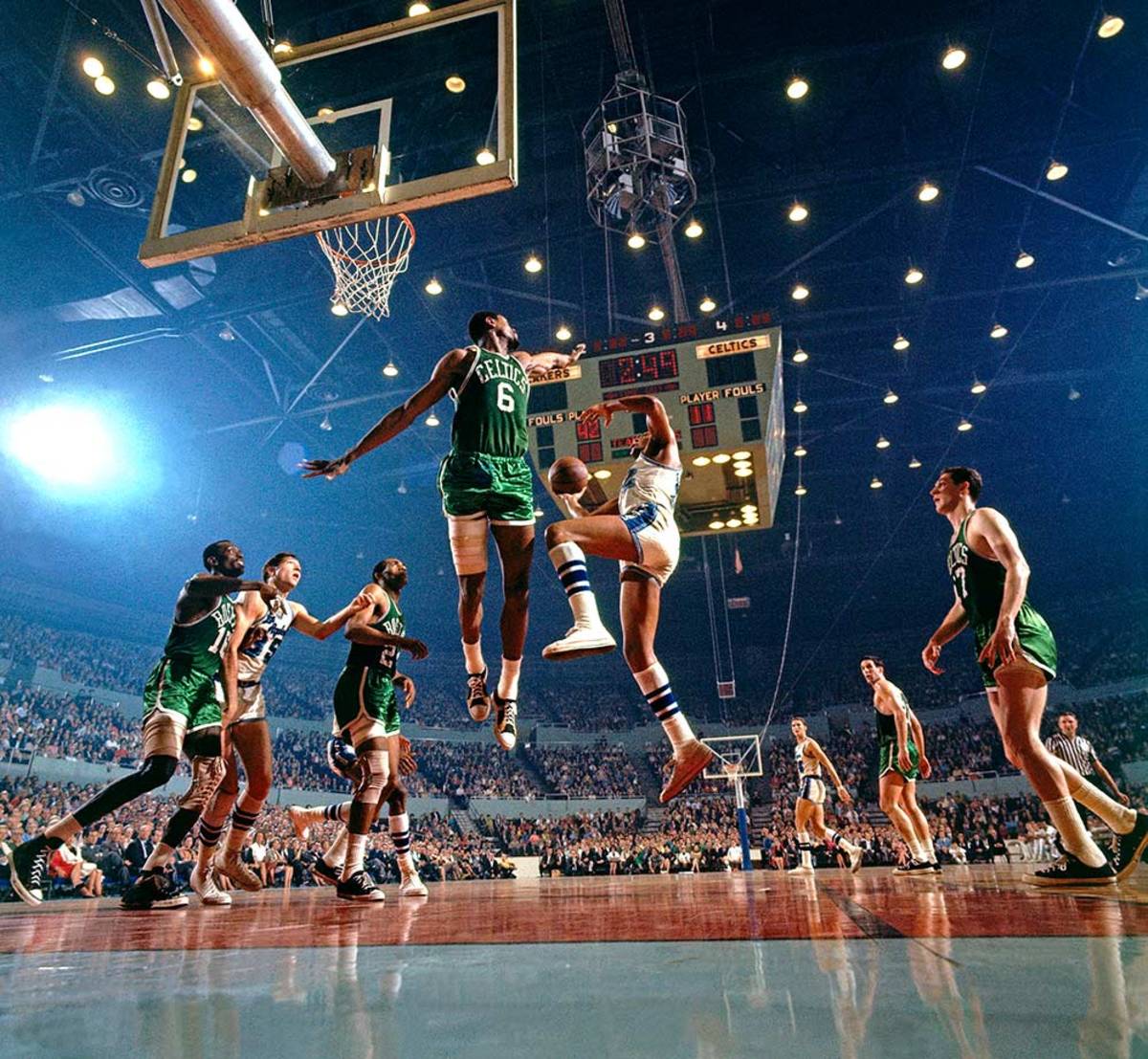
Bill Russell leaps to block Elgin Baylor. Russell and the Celtics were a constant thorn in the Lakers side, defeating them for five of their eight straight titles (1959-66).
1966
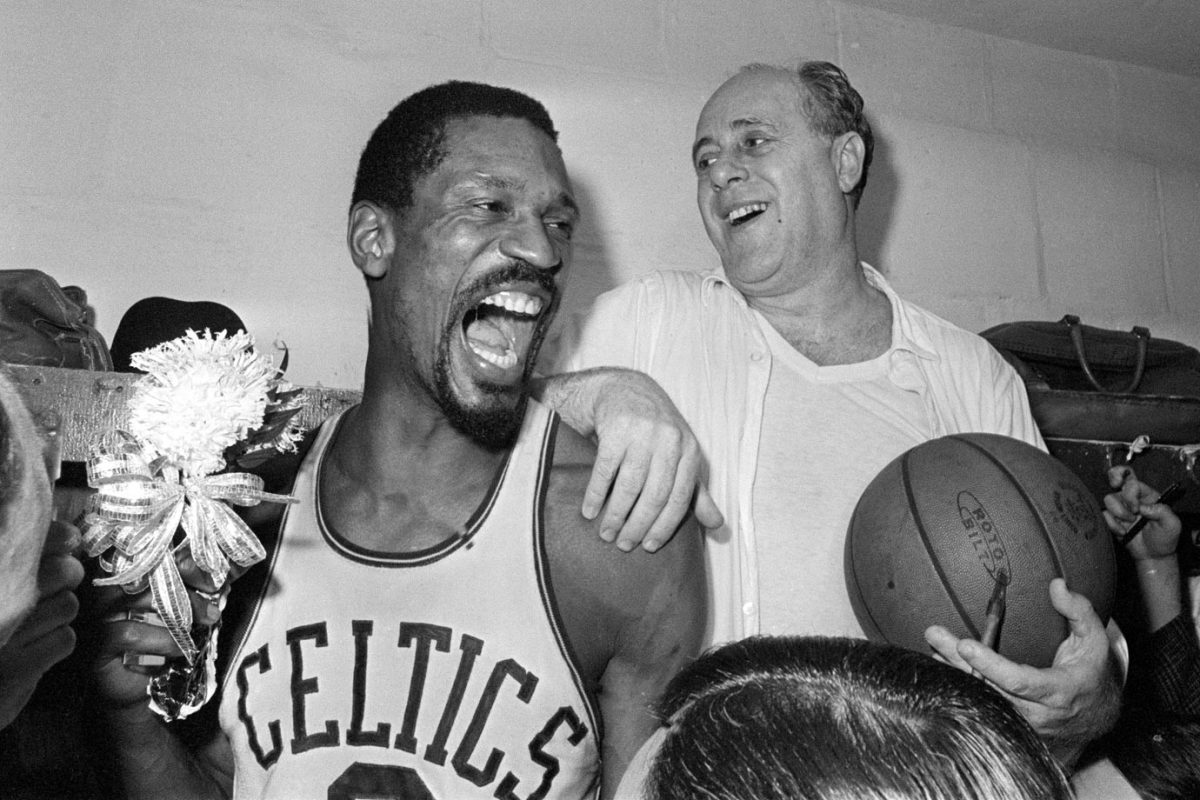
Bill Russell holds a corsage sent to the dressing room as he celebrates with Celtics coach Red Auerbach after defeating the Lakers, 95-93, in Game 7 to win their eighth-straight NBA championship.
1962
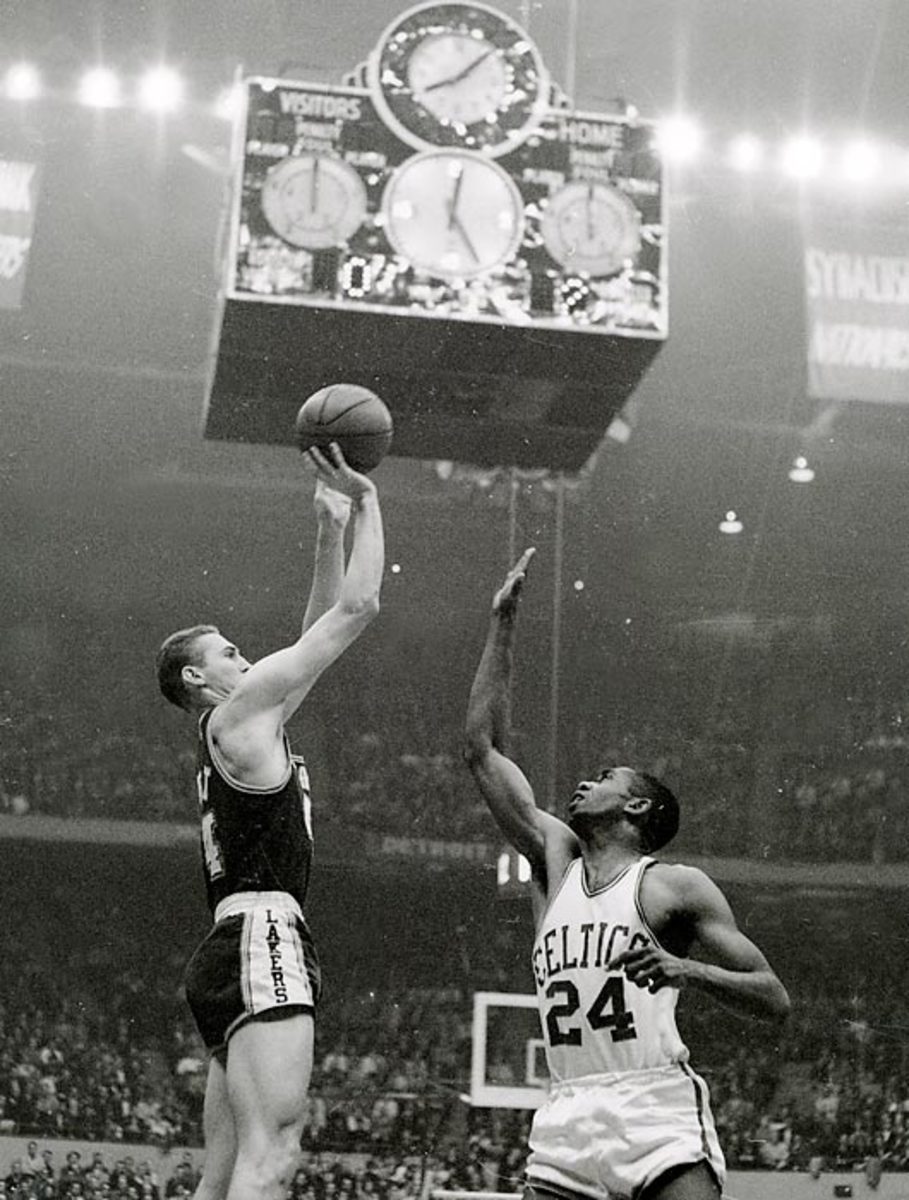
Jerry West of the Lakers elevates for a jumper in Game 7 against the Celtics. West scored 35 points, but Boston would win the game and the series.
1962
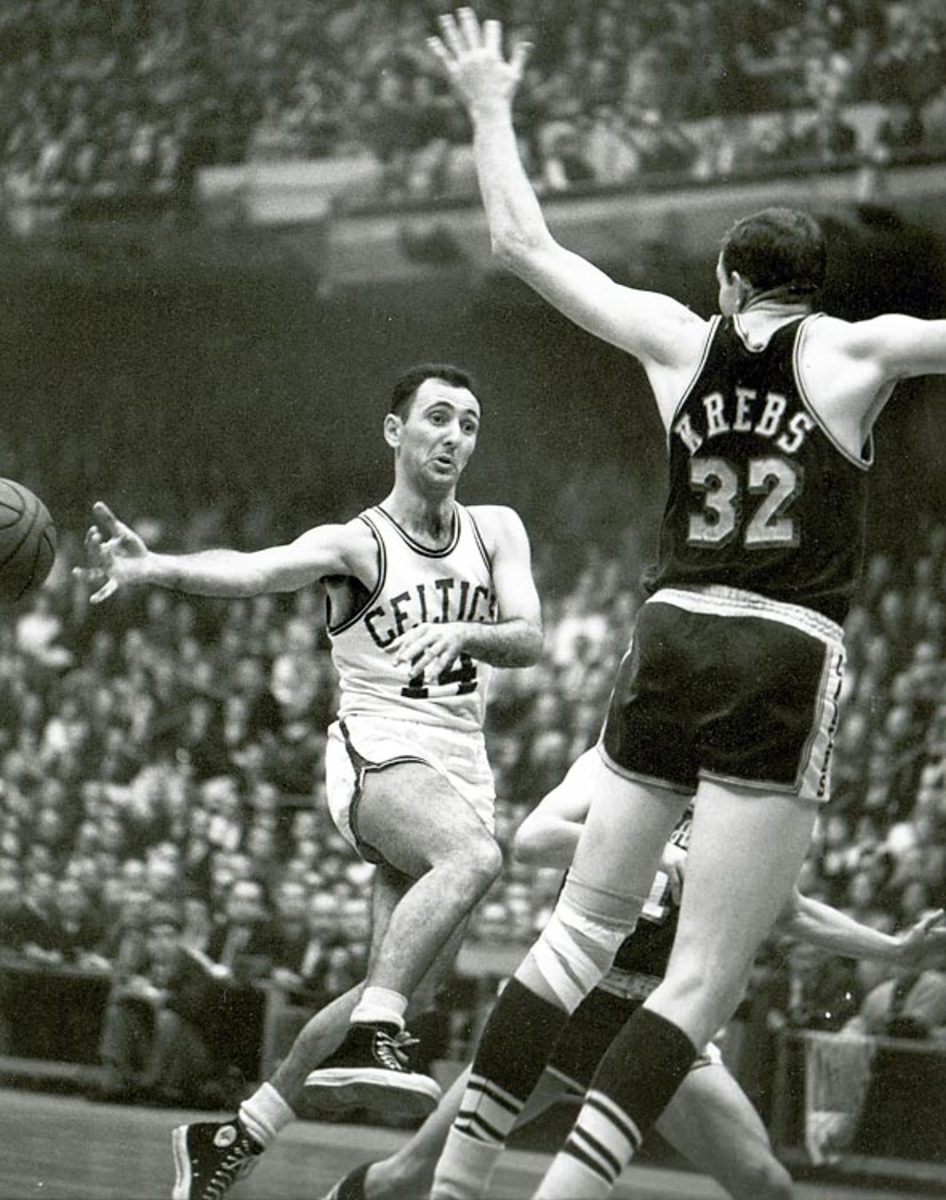
Celtics point guard Bob Cousy (14) throws a no-look pass in Game 7. Later that game, he would famously elude several Lakers and dribble out the clock to deliver Boston the title.
1962
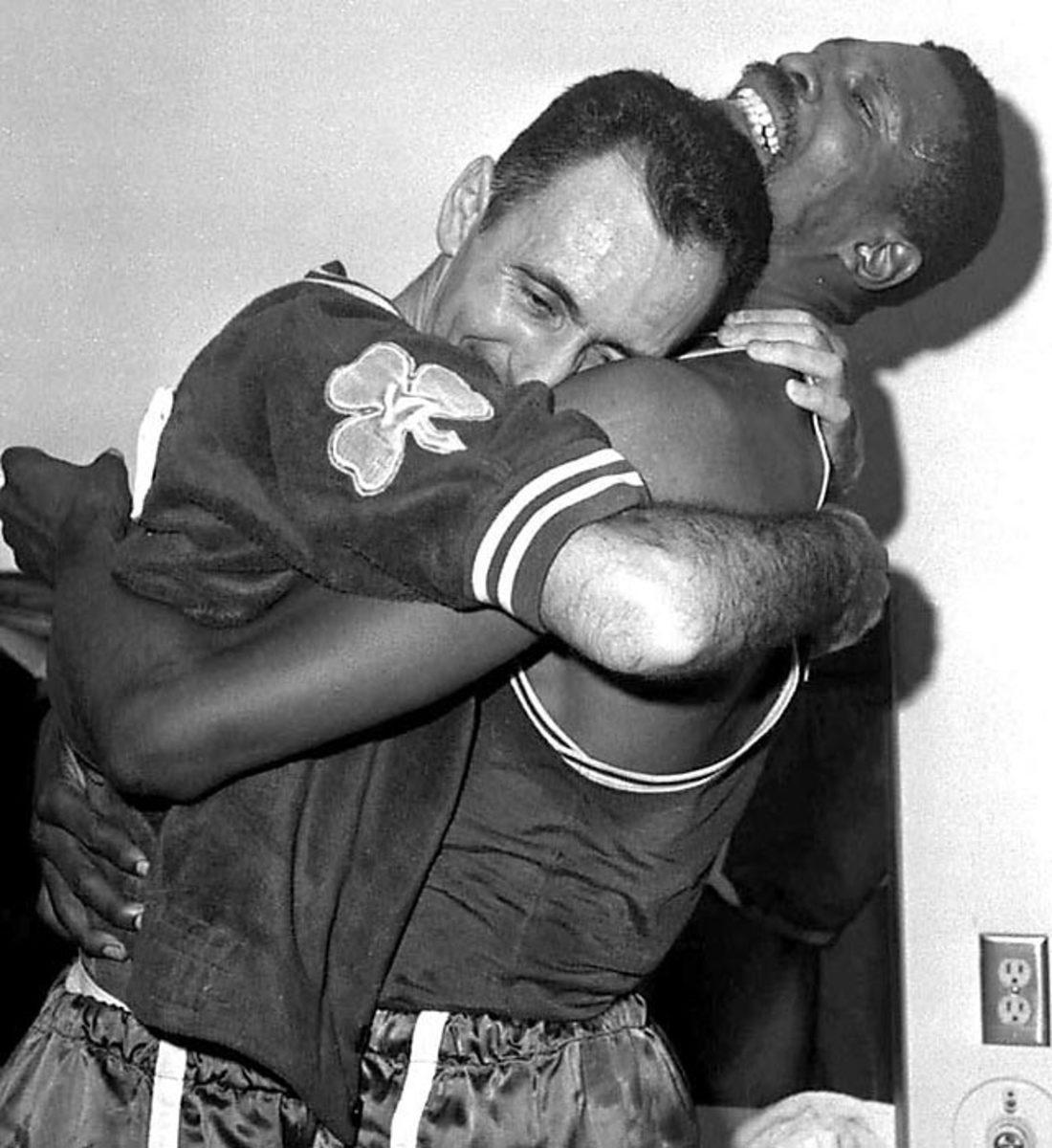
In one of the greatest winner-take-all games in NBA history, the Celtics beat the Lakers for the title, 110-107 in overtime, behind Bill Russell's 30 points and 40 rebounds.
1962
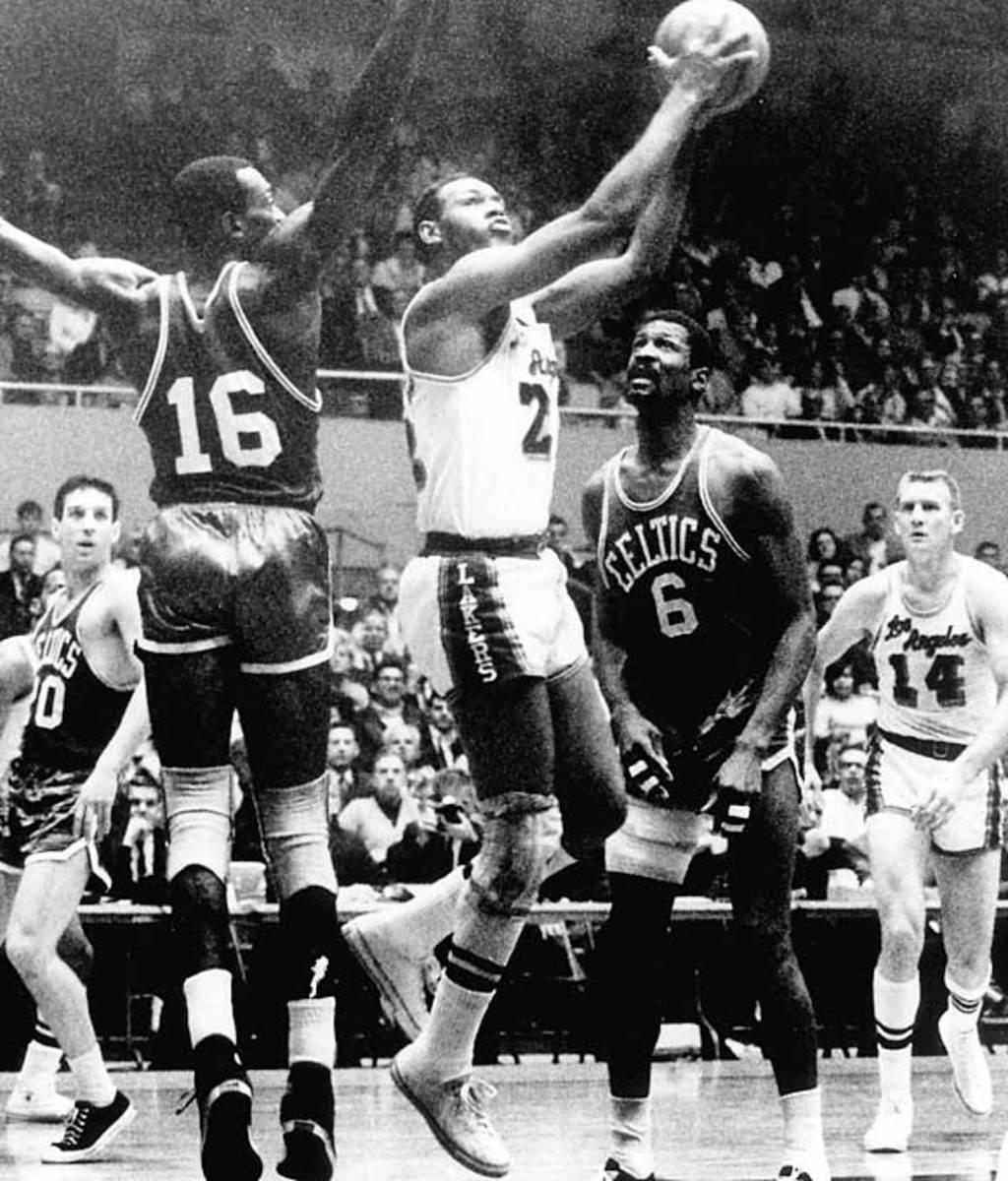
Elgin Baylor of the Lakers erupted for a Finals-record 61 points and grabbed 22 boards against the Celtics in a 126-121 Game 5 win at Boston Garden. The Lakers took a 3-2 series lead in what became a classic first finals meeting between L.A. and Boston.
1957
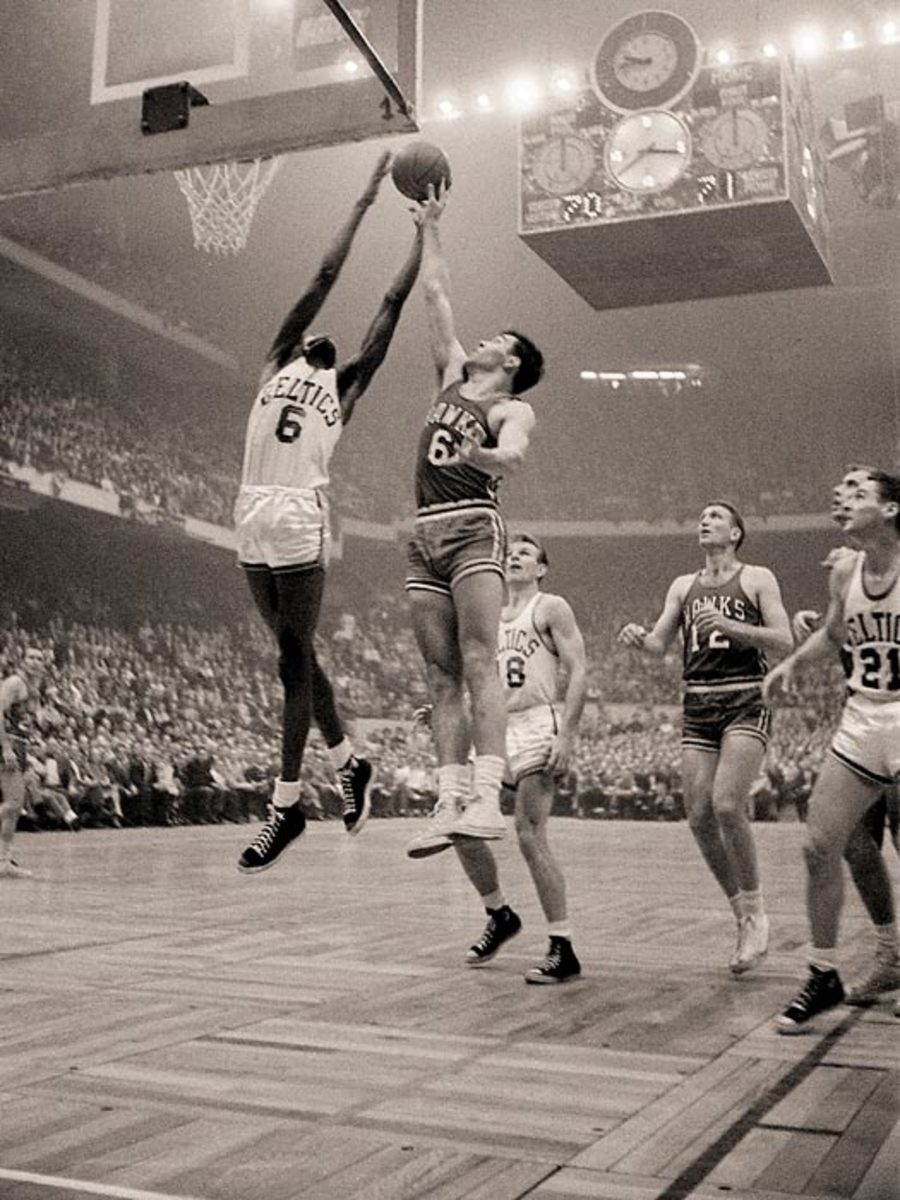
Bill Russell of the Celtics grabs a rebound over Cliff Hagan of the Hawks in Game 5 of the 1957 finals. The Celtics won the game 124-109 and took the series in seven in Russell's rookie year after acquiring his rights in a trade with ... St. Louis.
1949
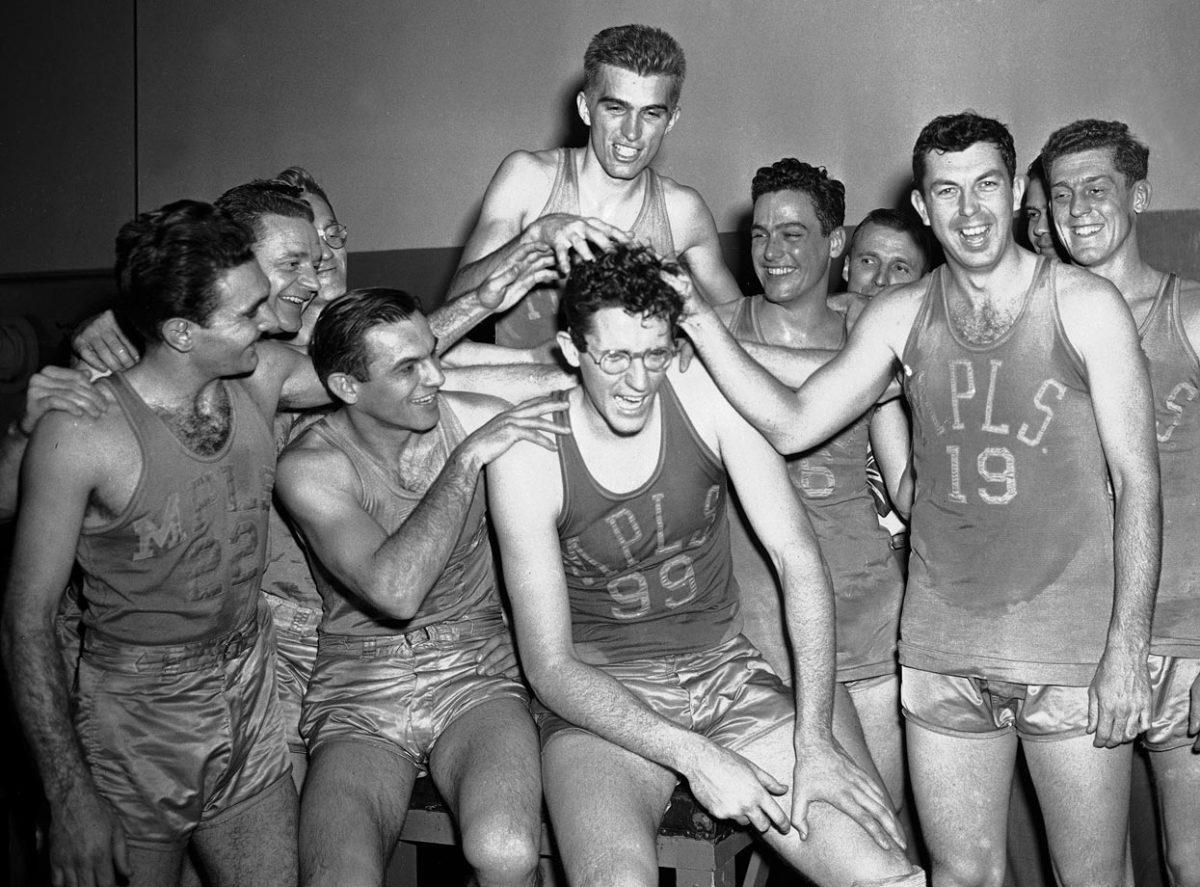
Lakers center George Mikan (99) gets his hair mussed by teammates after leading Minneapolis to its first-ever championship. Mikan set a Madison Square Garden scoring record with 48 points in a 101-74 victory over the Knickerbockers. The Lakers' 101 points also set an all-time team high scoring mark at the Garden.
No. 3 Heat vs. No. 6 Hornets: Miami makes its case
Few teams in the league had a more reassuring regular season arc than the Heat—a veteran outfit that seemed to grow more comfortable in its ways over the course of the year. That progress should carry Miami through its first–round series and beyond. A deep playoff run is entirely possible for a team this capable, and none in the conference would be quite so qualified to test Cleveland in the Eastern Conference finals. First comes the matter of getting there. Miami’s letdown loss in the regular season finale demonstrated perfectly that nothing with this team can be taken for granted. Sleeping on the Hornets could get the Heat into quick trouble. Approaching the series with the diligence it deserves would instead advance Miami toward something greater.
• MORE NBA: Kemba hopes to re-create magic in NBA playoffs
No. 4 Hawks vs. No. 5 Celtics: Boston’s depth, in concept and in practice
Celtics coach Brad Stevens found safety in the fact that his team’s reserves could outplay his opponent’s on a nightly basis. The magnitude of that advantage inevitably wavers in the postseason; under the raised stakes and structured pacing of a playoff run, teams generally trend toward allocating more minutes to their best players and fewer to their backups. Boston’s roster doesn’t lend itself to that kind of shift. It becomes essential, then, that those lineups featuring the likes of Kelly Olynyk, Marcus Smart, Evan Turner, and Jonas Jerebko hold their ground even against opposing starters.
• MORE NBA: Big Board 2.0: Simmons still at No. 1 | Mock Draft 2.0
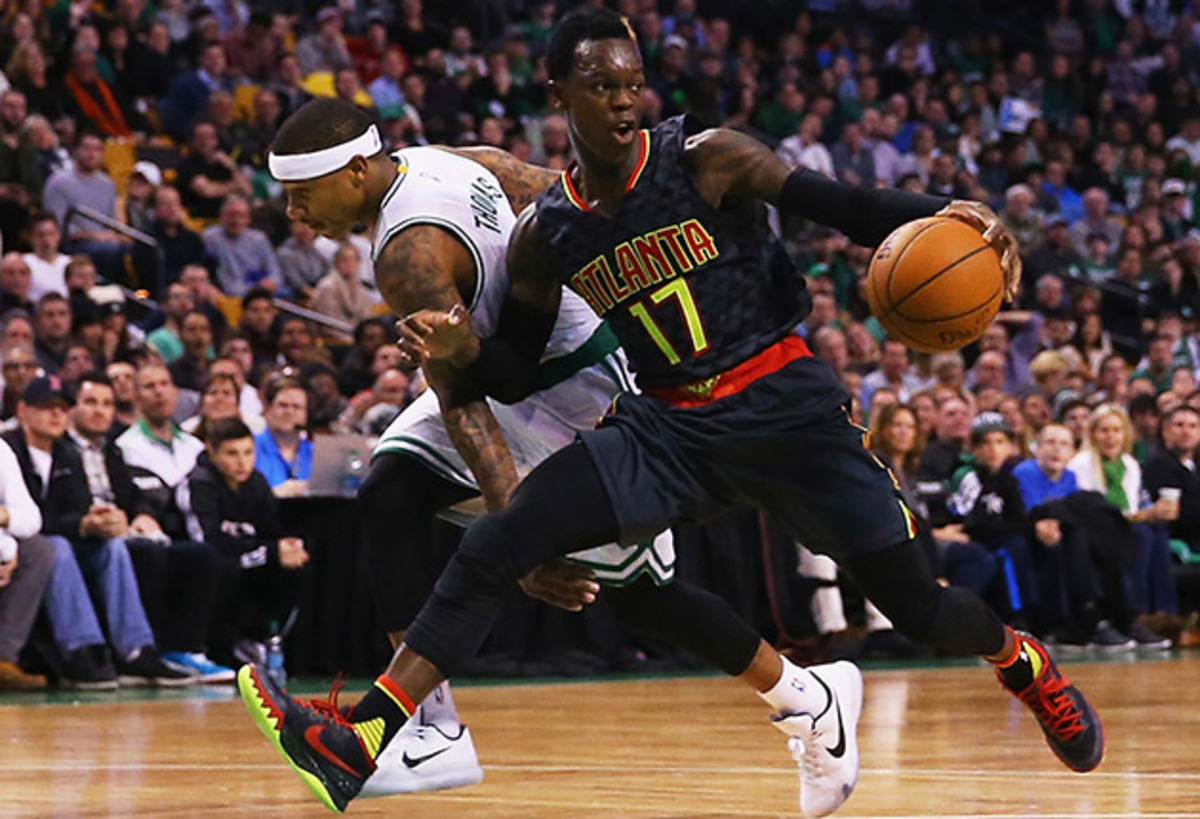
Biggest X-factor: Dennis Schroder, Hawks
Boston will choke the life out of an offense run by a lesser ball handler, eating up space and denying angles to the point that perimeter creation becomes hopeless. Schroder will have to break free for the Hawks to have a chance. Any offense driven by passing must also rely on a single, created advantage courtesy of players like Schroder. It’s only after he pushes past his defender on a drive that he’s able to kick, and it’s only because of that kick that Paul Millsap can catch and initiate a secondary drive. Al Horford might cut opposite Millsap, tugging at the defense in such a way that it loses track of Kyle Korver or helps off of Kent Bazemore. So much can come of Schroder making moves and keeping poised under pressure. Factor in the additional stakes of Schroder’s defense against guards like Isaiah Thomas and Marcus Smart and he registers as one of the most critical players in a closely contested series.
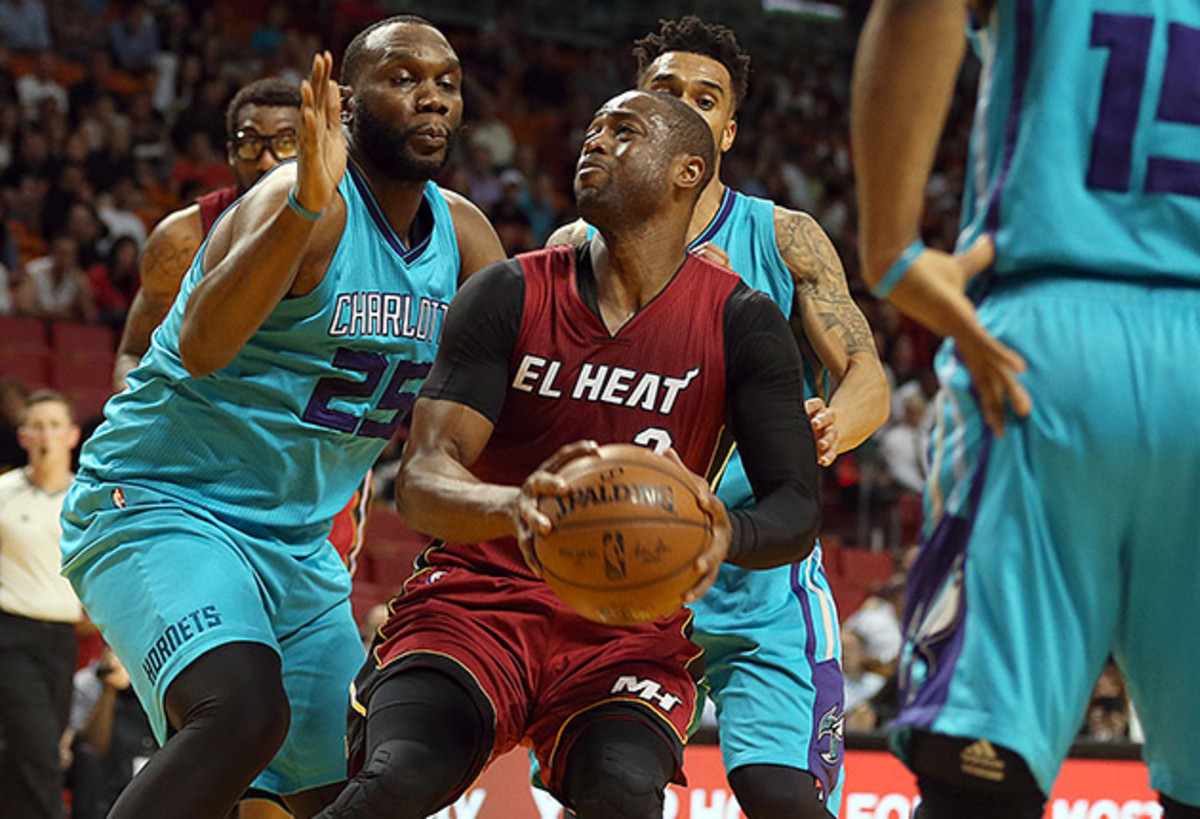
Predictions
Cavaliers over Pistons in 6. This looks to be a physical, challenging series for Cleveland. Expect the young Pistons to push the Cavs and exploit some of their shortcomings, even if they don’t have quite enough to withstand LeBron James at full bore.
Raptors over Pacers in 5. Indiana managed a successful, winning season in spite of its weird roster. Unfortunately, Toronto has been a few steps ahead throughout the year and plays with a more reassuring consistency.
Heat over Hornets in 6. The highest variance of any series in the conference. If healthy and in top form, Charlotte has the pieces—and the tactical guidance—to edge Miami out of the playoffs. If the Heat are able to lock down the three–point line and contain Kemba Walker, they could wrap the series up quickly on their own terms. We’ll split the difference.
Hawks over Celtics in 7. It should surprise no one to see Boston advance out of this series, though ultimately Atlanta gets the nod on the savvy of its bigs. Paul Millsap and Al Horford make the Hawks so difficult to back into a corner; apply pressure on the ball and expose an off-balance defense to their sharp facilitation.
